
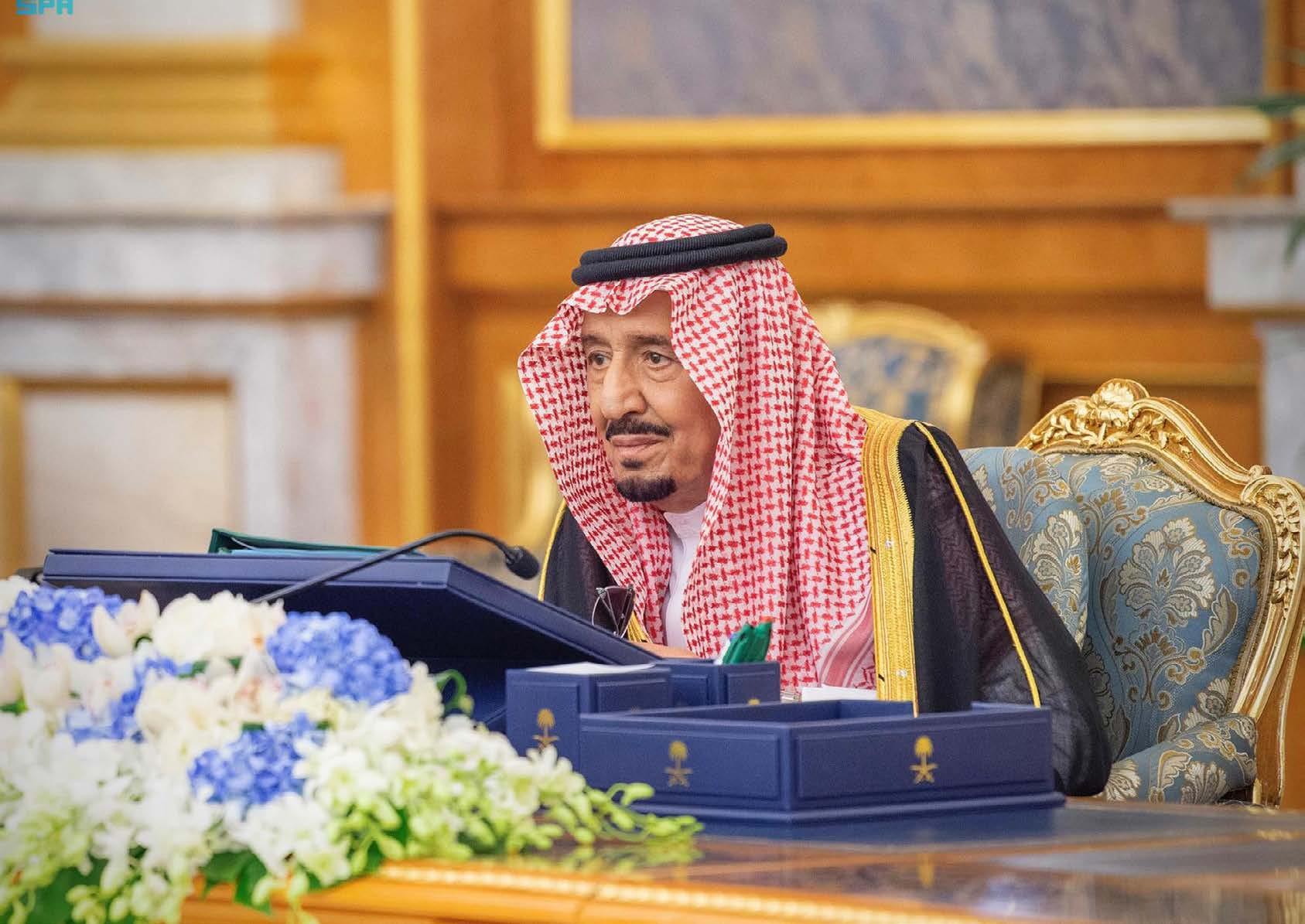
Custodian of the Two Holy Mosques
King Salman bin Abdulaziz Al-Saud
3 RSG Sustainability Report 2021
“ My primary goal is for Saudi Arabia to be an exemplary and leading nation in all aspects, and I will work with you in achieving this endeavor.”
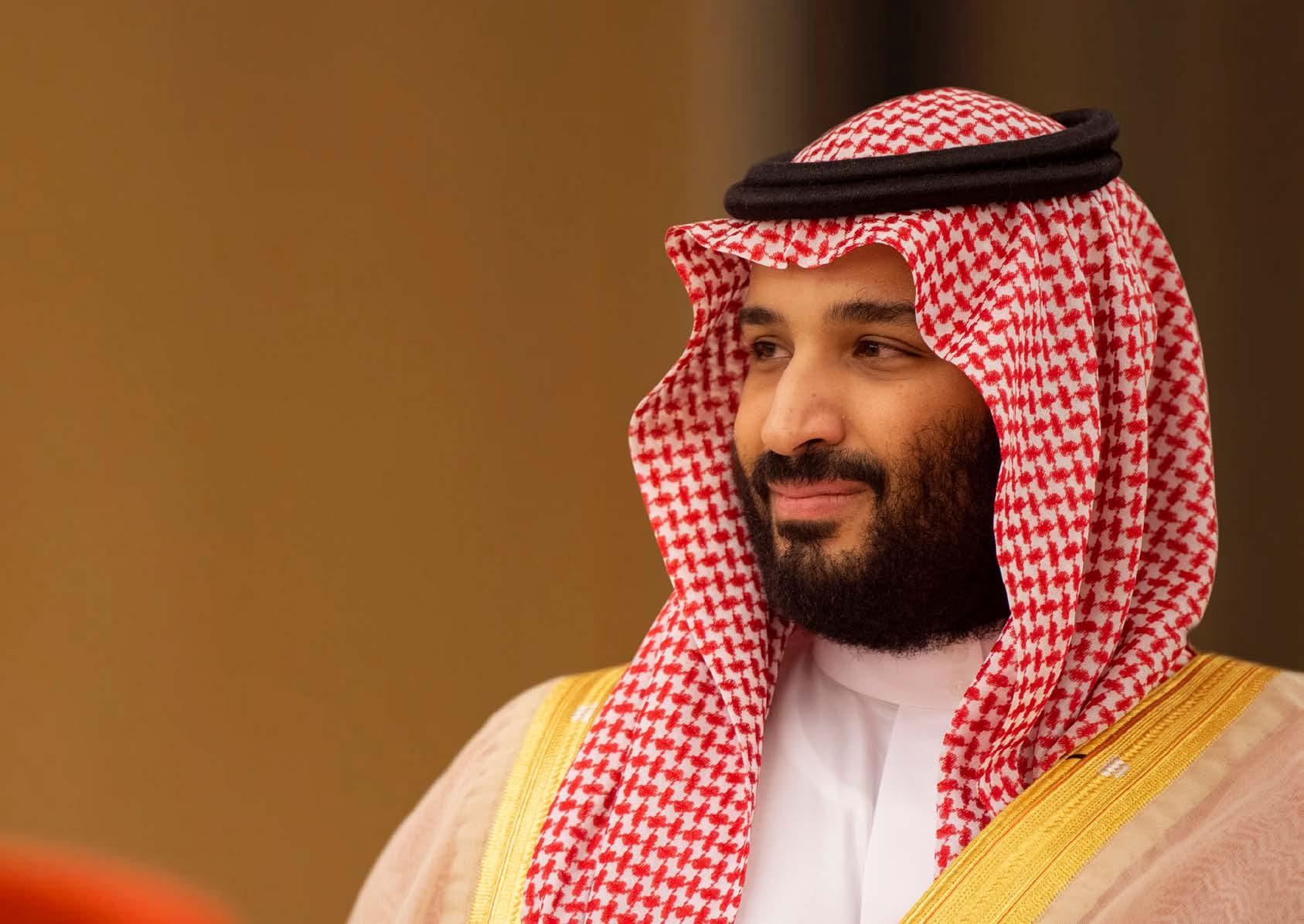
Climate action will enhance competitiveness, spark innovation, and create millions of high-quality jobs.
Young people, both in the Kingdom and the world, are demanding a cleaner, greener and more inclusive future, and we owe it to them to deliver on this.
“ ”
His Royal Highness Crown Prince Mohammed bin Salman bin Abdulaziz Al-Saud
5 RSG Sustainability Report 2021
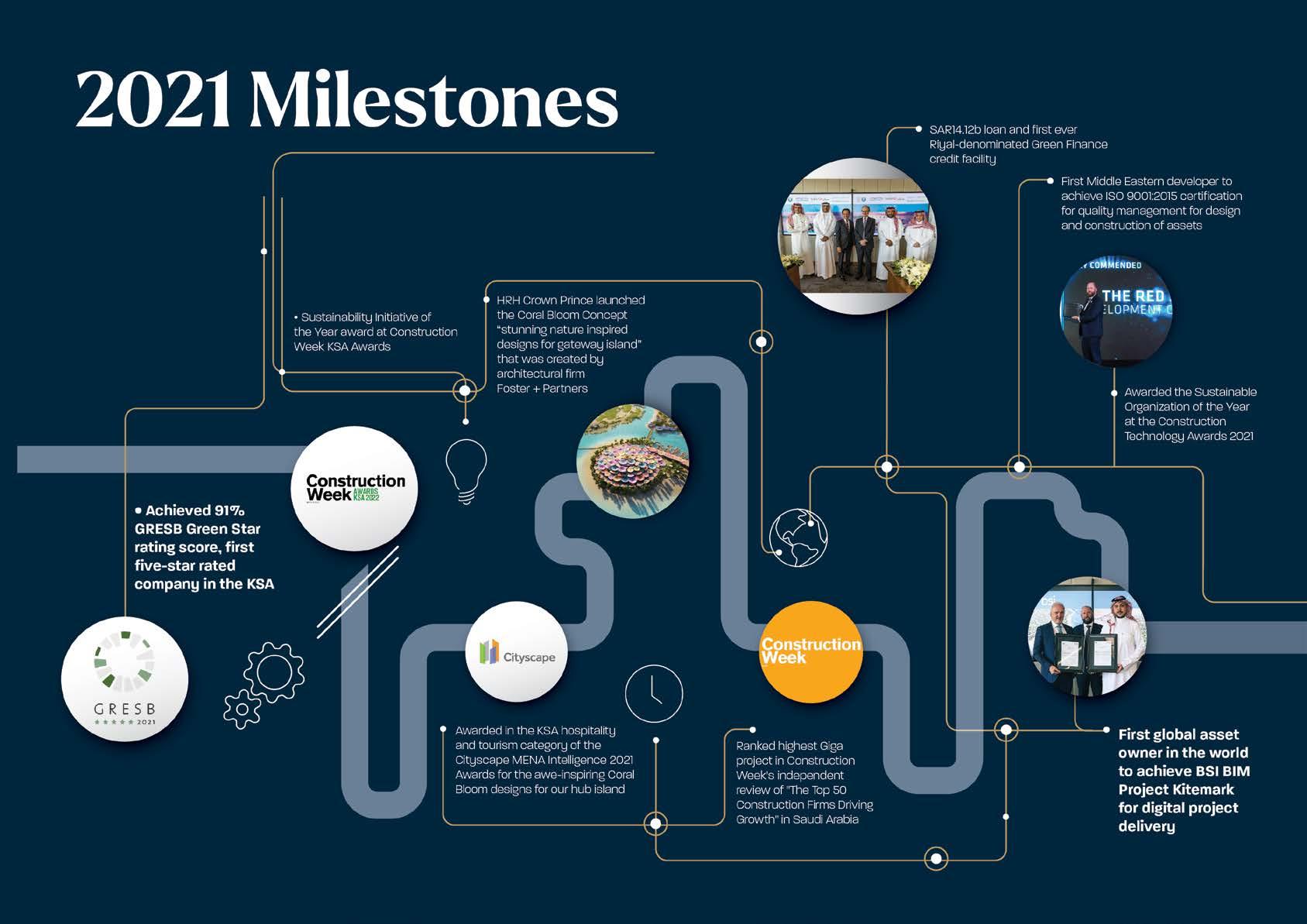

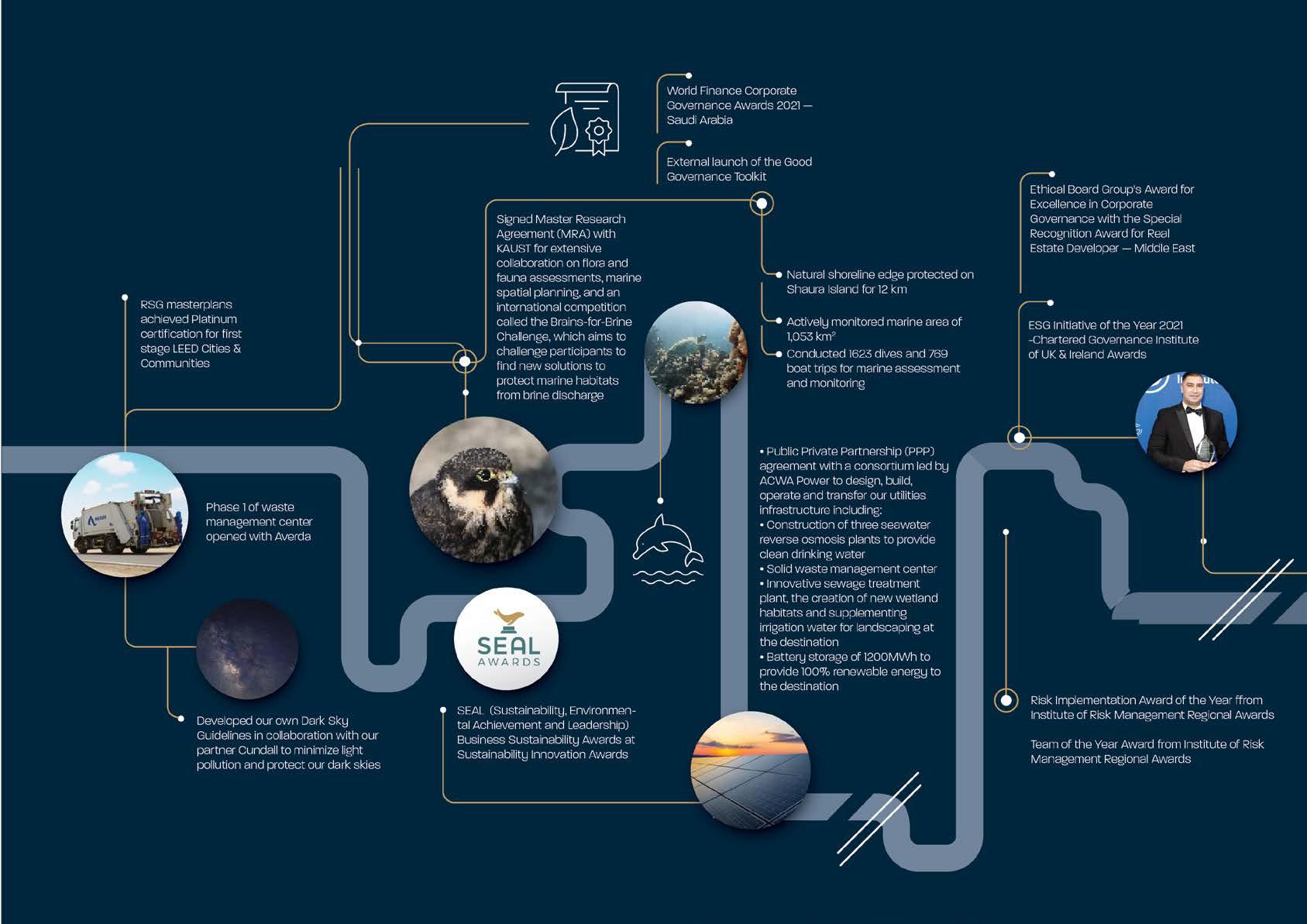
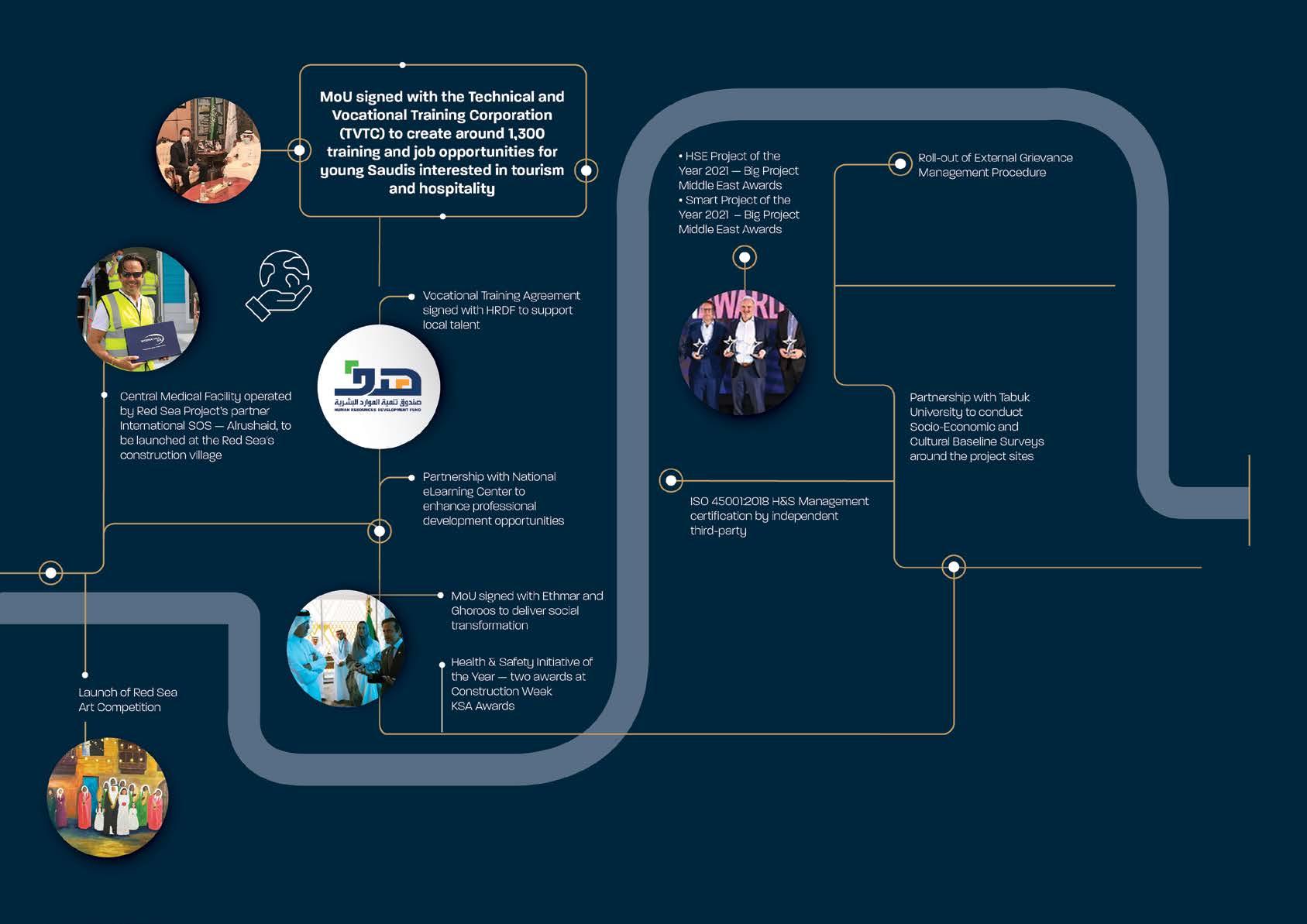
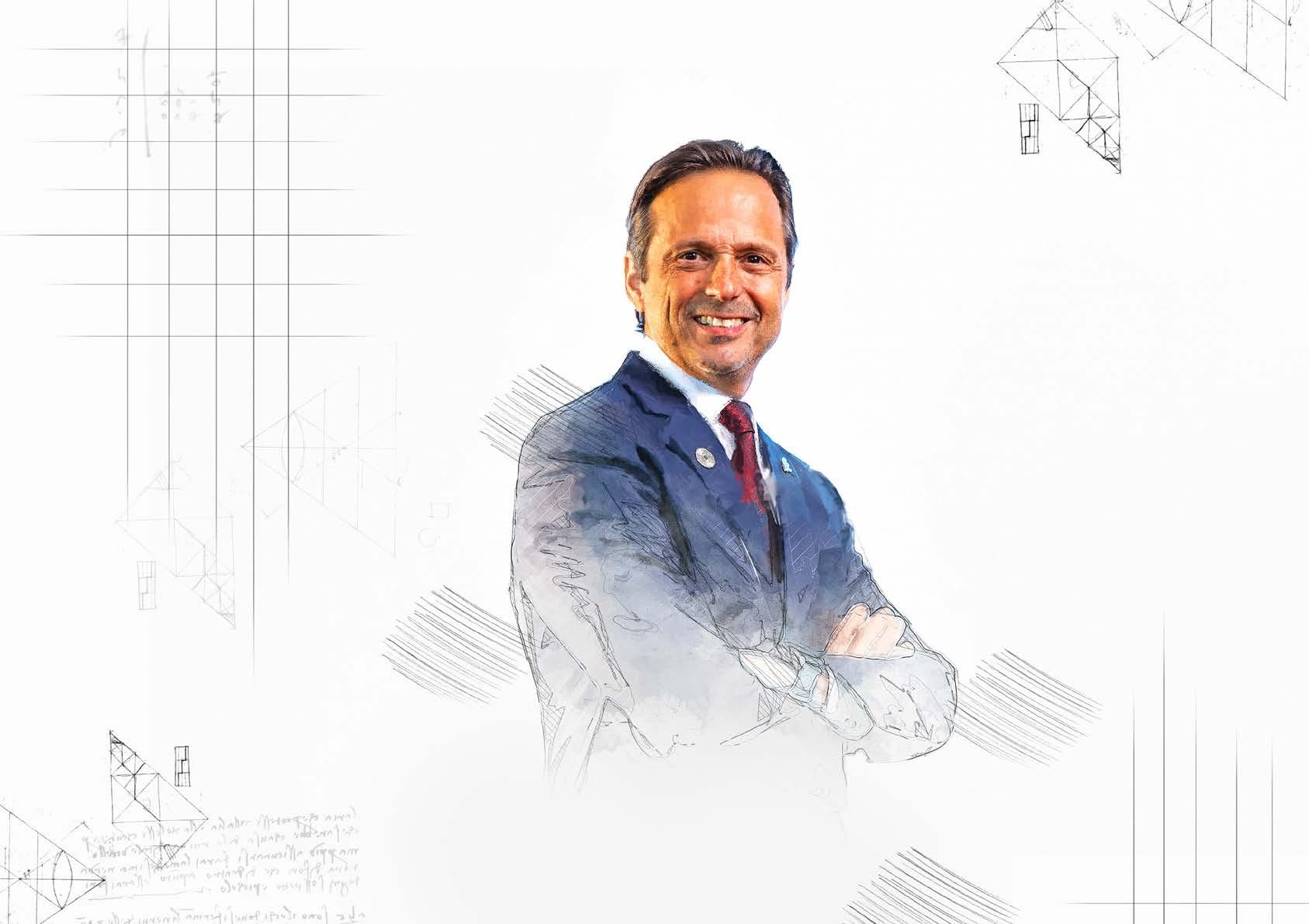
Prioritizing People and Planet

Red Sea Global is creating some of the world’s most remarkable tourism destinations. The settings of our unique resorts range from magnificent mountains and dunescapes to idyllic islands fringed with mangrove forests and coral reefs. At each of our hotels and facilities, we aim to do more than simply protect the natural environment; we aim to make it better.
This is what regenerative tourism is all about. By enhancing our diverse habitats, we plan to achieve a 30% net positive increase in conservation value across all our projects by 2040. And by delighting our guests, we hope to inspire them with a shared mission to safeguard our planet.
Sustainability has been a core value for us since we started on our journey more than five years ago. We incorporate environment and sustainability principles from the outset of every phase of our activities, from concept and design all the way through to completion and operation. But sustainability is about more than protecting our physical environment. It also means nurturing the local culture and communities where we operate and providing residents with skills and training to better their lives. It means strengthening the economy by helping to build a dynamic tourism industry in Saudi Arabia, one that will contribute billions in revenue and create thousands of jobs. And it means improving the tools of corporate governance so that we can meet these ambitious goals.
As we pursue our objectives, we are aligned closely with Saudi Vision 2030 and its pillars of a vibrant society, a thriving economy and an ambitious nation.
Among our milestones in 2021, we secured the first-ever Saudi Riyaldenominated Green Finance credit facility. We awarded a utilities contract that will make The Red Sea Project the largest tourism destination in the world running solely on renewable energy. We also became the first development company in the region to win first-stage Platinum LEED certification for Cities and Communities – the highest rating for sustainable urban planning.
In other achievements, Red Sea Global earned a five-star rating under the Global Real Estate Sustainability Benchmark and reached an agreement with the International Dark-Sky Association to minimize light pollution. We completed the Middle East’s biggest landscape nursery and hired 509 new employees.
In fact, we are just getting started. We want to position Saudi Arabia as a global leader in innovation and the search for solutions to some of the world’s biggest challenges, from food security to carbon sequestration.
I invite you to explore these pages to learn more about how we are pushing the boundaries of sustainability to fulfill our mission of protecting people and planet.
John Pagano Group Chief Executive Officer
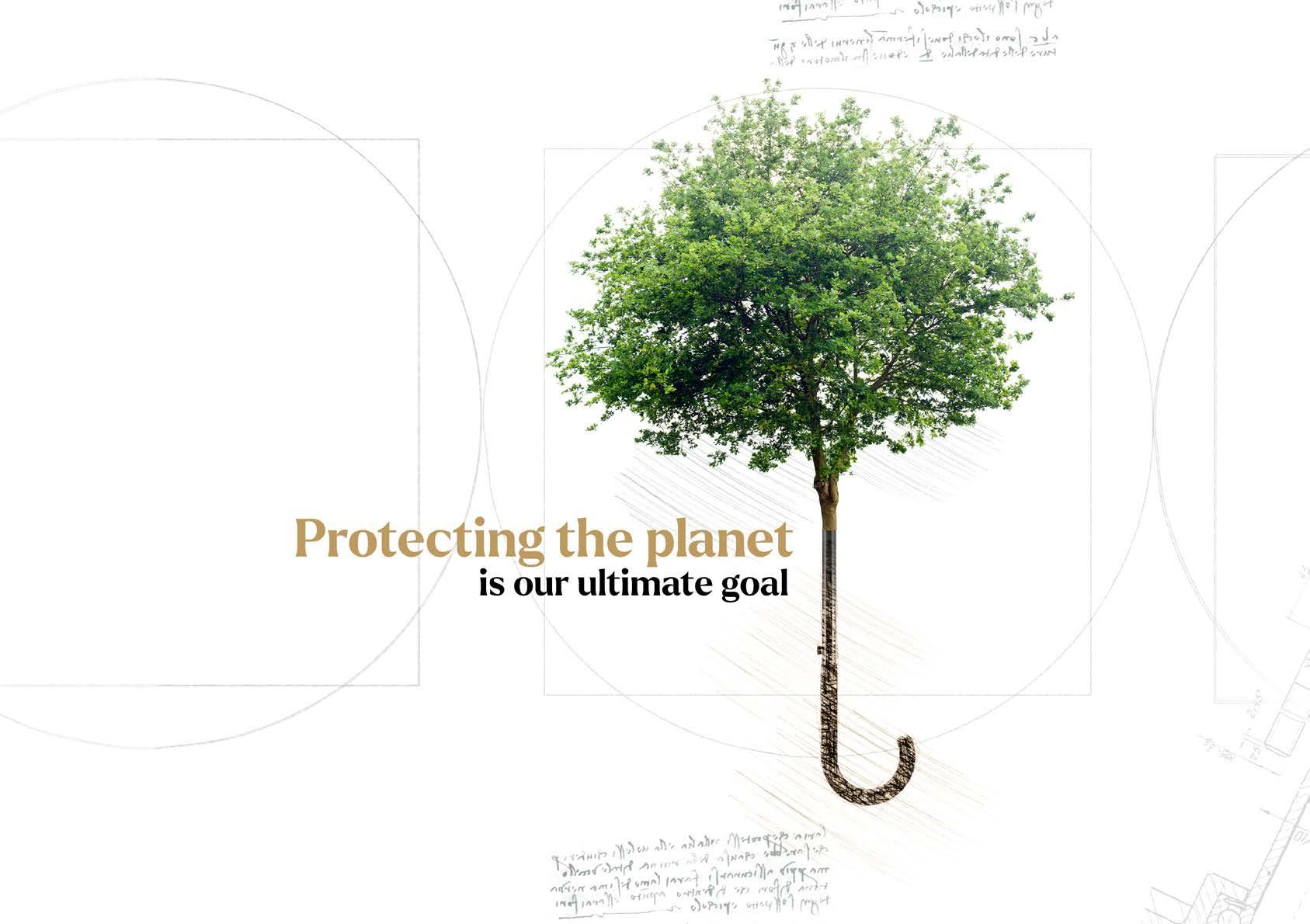
Inside this report
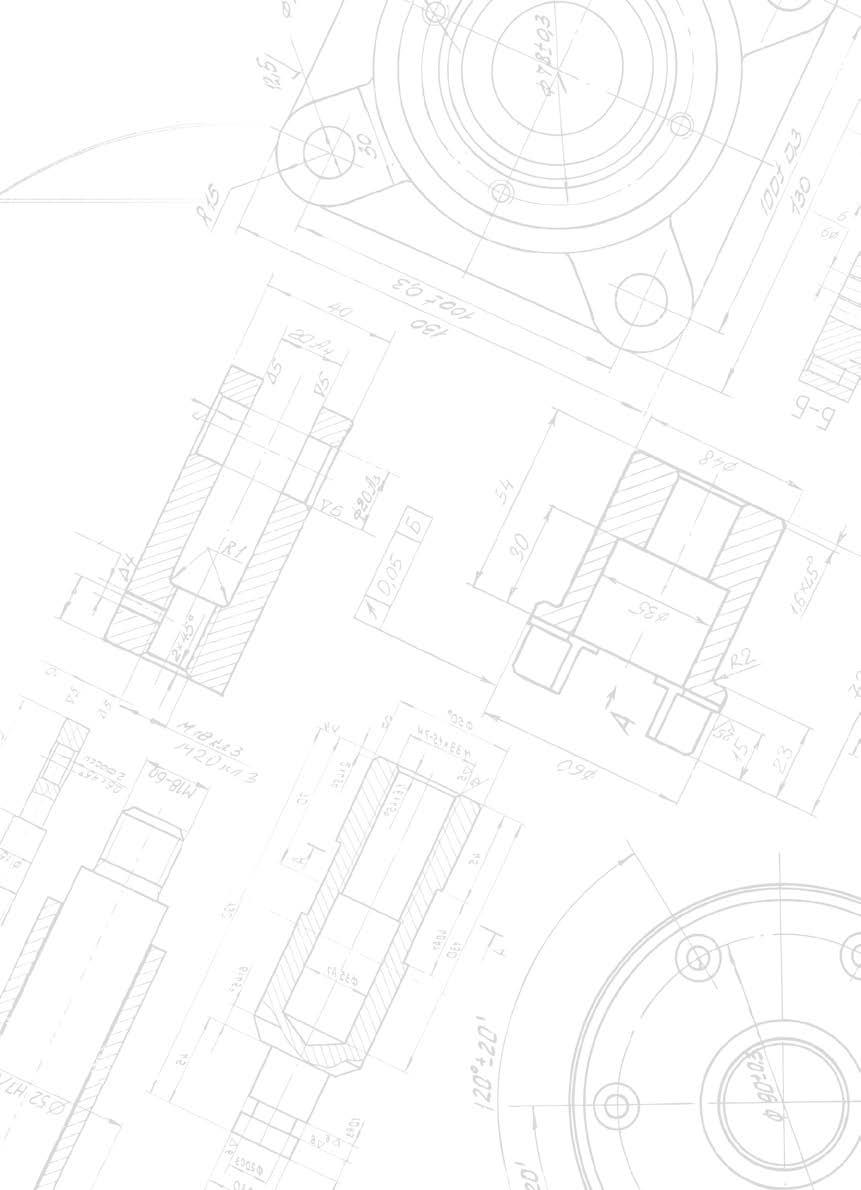
Red Sea Global: An organization built to lead
The Red Sea Project: The world’s most ambitious regenerative tourism development
Our Leadership Excellence in governance Sustainability at our core Protecting and enhancing the environment Making a positive social impact Contributing to economic diversification and growth Looking ahead Appendix Habitats found at The Red Sea Project About this report GRI Content Index Abbreviations and acronyms Forward-looking statements Find out more
This sustainability report is published by Red Sea Global (RSG) for the reporting period 1 January to 31 December 2021. During that period, RSG operated under the name The Red Sea Development Company (TRSDC).
13 RSG Sustainability Report 2021
16 18 24 38 50 74 96 122 131 132 134 138 140 148 150 151

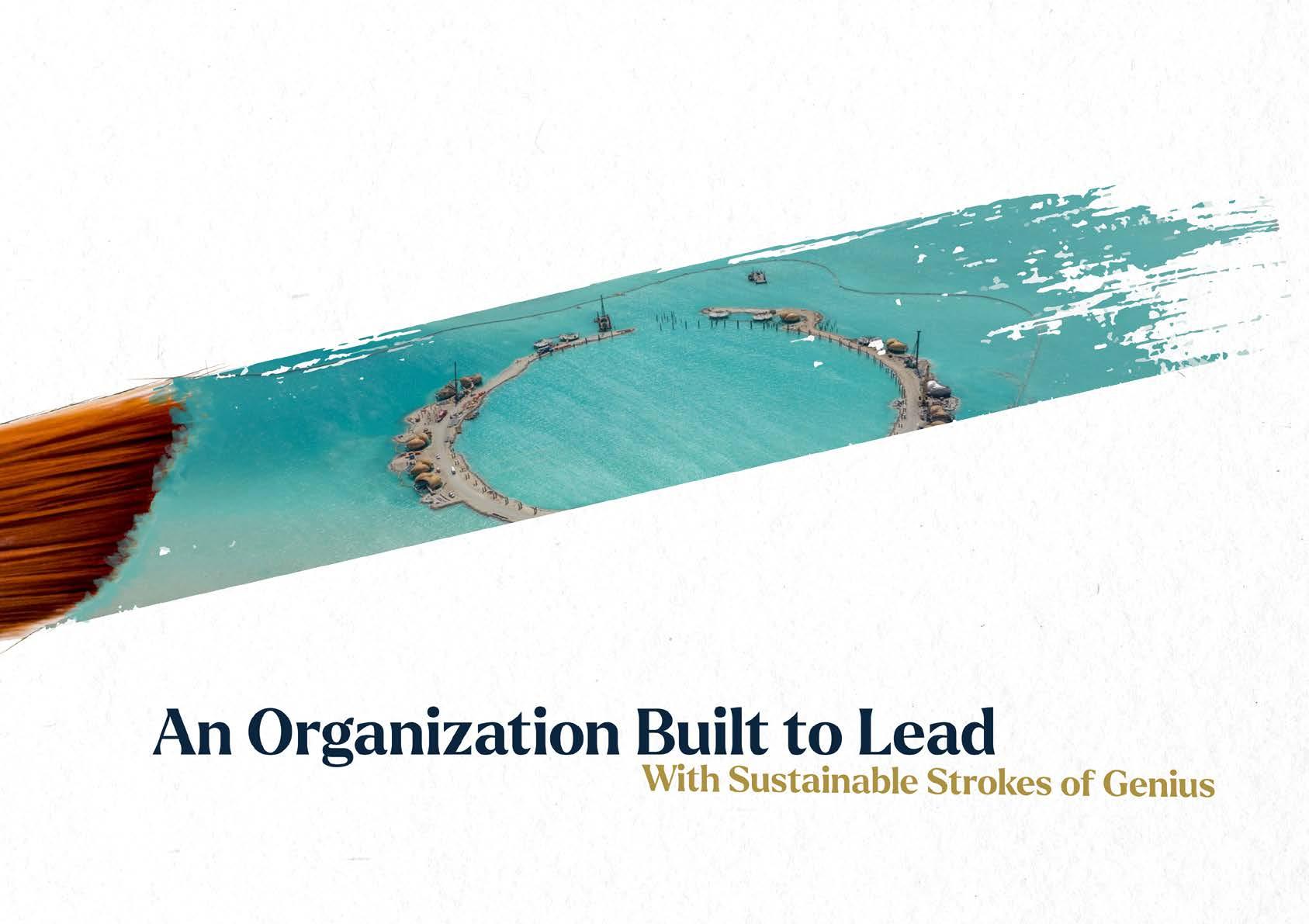
Red Sea Global: An organization built to lead
Founded in 2018 under the name The Red Sea Development Company (TRSDC), Red Sea Global (RSG) is a closed joint stock company wholly owned by the Public Investment Fund (PIF) of Saudi Arabia, to drive the development, promotion, operation and governance of The Red Sea Project , a regenerative luxury tourism destination along Saudi Arabia’s west coast, and one of the Giga projects announced by H.R.H. Crown Prince Mohammad bin Salman bin Abdulaziz Al-Saud in 2017, as part of Saudi Arabia’s Vision 2030.
RSG is an organization built to lead. We represent the vision and ambition of Saudi Arabia to become a pioneer in the global tourism industry. We aim to set groundbreaking standards across every aspect of the destination’s development and management to become a truly global destination, embracing visitors from around the world. These aspirations are guided in every aspect by our vision, mission, and values to conduct our business responsibly, collaboratively, and passionately whilst respecting our natural environment, the culture and heritage of Saudi Arabia.
The Red Sea Project is a luxury tourism destination created to revolutionize the global tourism industry, pioneering a large-scale approach to go beyond current perceptions of what it means to be sustainable and to apply a regenerative approach. We are developing a luxury destination within a region of 28,000 sq. km. of mostly untouched nature, which we will actively enhance in an unprecedented manner.
The entire area will be governed by a dedicated Red Sea Zone Authority. The authority’s purpose is to set global leading standards to enable unprecedented environmental sustainability and business-friendly regulations.
We are delivering our vision through a talented, multinational team comprising real-estate developers, engineering professionals, environmental specialists, designers and project finance experts who share and live by our values and reflect them through every stage of development, from planning and construction, to operation and management of the destination.
We are an inspiration for the luxury and development sectors. We are providing the world with a blueprint for regenerative luxury tourism.
We want to prove to the world, and our peers in the tourism industry, that creating world-class destinations can go hand-in-hand with protecting and enhancing the environment. We are challenging ourselves and others to do better and be better as global pioneers in responsible development. We are issuing a call to action for the tourism industry to step up when it comes to the impact on the climate and biodiversity.
John Pagano Group Chief Executive Officer
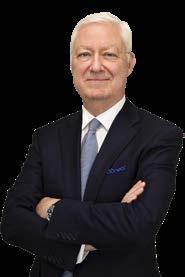
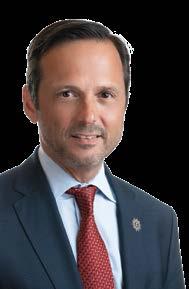
Our core values – transparency, accountability, fairness and responsibility – are our corporate compass. As one of the world’s most visionary developers, these principles guide us along our path to creating exceptional tourism destinations that benefit both people and planet.
Nicolas King Group Chief Development Officer
16 RSG Sustainability Report 2021
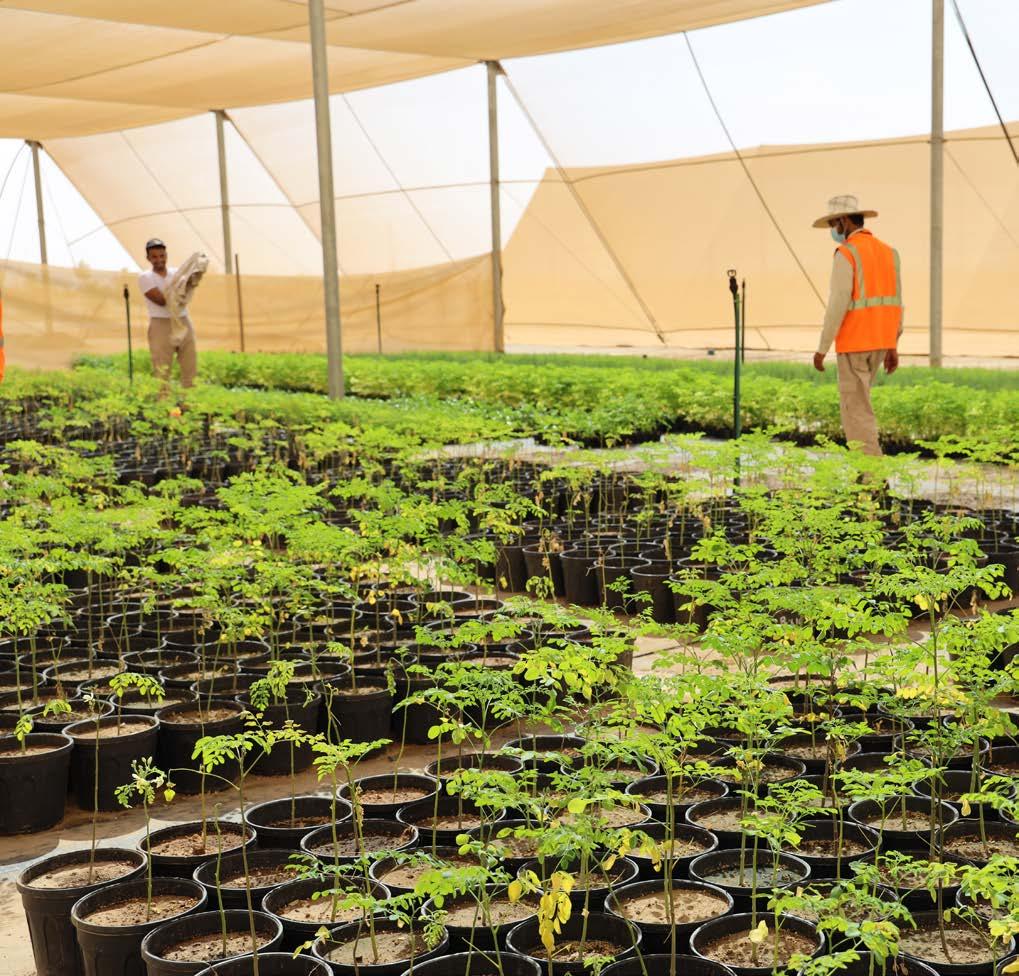
17 RSG Sustainability Report 2021
The Red Sea Real Estate Company I
The Red Sea Landscape Nursery Company
2020 2021
The Red Sea Utilities Company
have established six
The Red Sea Services Company The Red Sea Coastal Village Hotel The Red Sea Hotel Operations Company We
subsidiaries, all incorporated and operating in Saudi Arabia
The Red Sea Project: The world’s most ambitious regenerative luxury tourism development
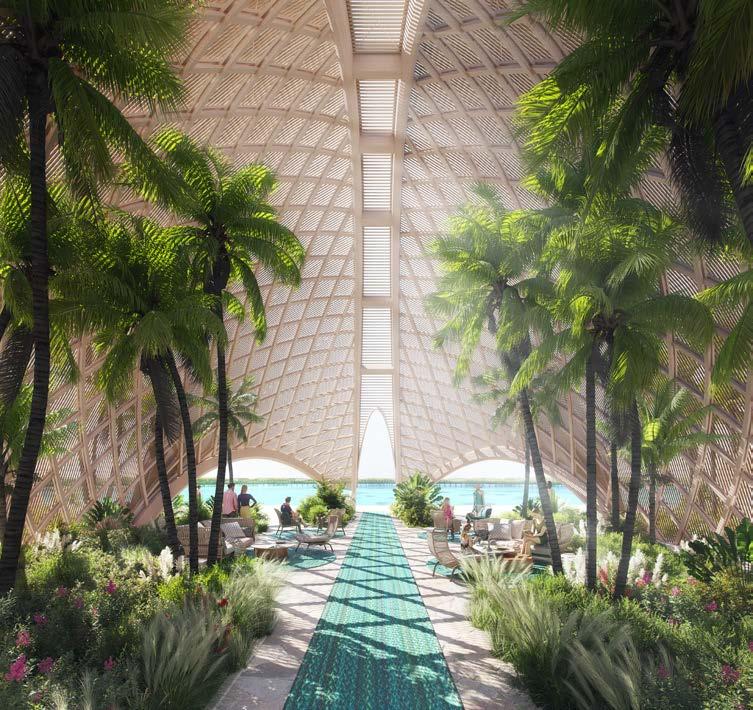
The Red Sea coastline of Saudi Arabia is an area rich in wildlife, both flora and fauna. It is an unexplored gem of natural beauty, encompassing sweeping dunes, dormant volcanoes, deserts and pristine islands. While we look to attract international travelers, adventure seekers, cultural explorers, maritime enthusiasts, and wellness lovers, we also recognize how essential it is to protect the natural assets, ecosystems and the diverse wildlife, which underpin what our destination offers.
The Red Sea destination is living proof of our pioneering approach to regenerative tourism. It is the most ambitious development of its kind anywhere in the world, going beyond sustainability to rejuvenate not only the environment but the society and the economy too.
Ian Williamson, Group Chief Projects Delivery Officer

Our vision for The Red Sea Project
Deliver an exquisite luxury tourism destination with islands, nature and culture, which sets new standards in sustainable development and positions Saudi Arabia on the global tourism map.
Our commitments
18 RSG Sustainability Report 2021
Protect, preserve and enhance the local environment Set new standards in sustainable development through net positive conservation value Offer access to some of Saudi Arabia’s most important cultural treasures
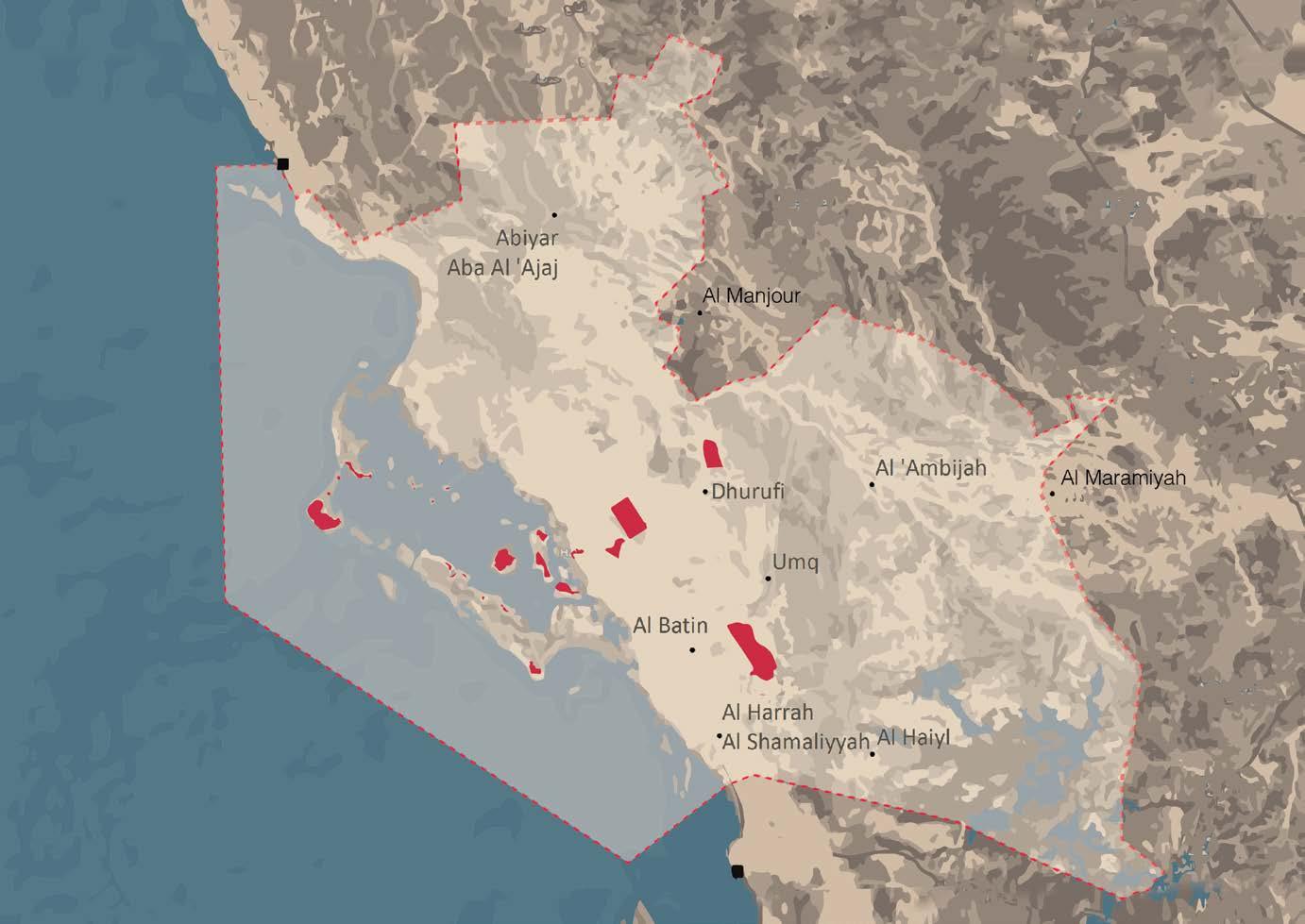
19 RSG Sustainability Report 2021 Development Sites The Red Sea Zone Authority Boundary MONO ISLANDS 3-2 Um Kud 3-3 Mizab 3-4 Hur 5-4 Safayih 1 5-5 Safayih 2 5-6 Safayih 3 5-7 Al-Osh Al-Gharbi 6-1 Um Samdaniat 1 6-7 Abu Khalid 7-1 Al-Samdaniat 1 9-3 Ummahat Alshaykh 1 9-4 Ummahat Alshaykh 2 9-5 Ummahat Alshaykh 3 9-8 Um Qadeen 1 9-10 Eiqat Rizk 10-1 Sheybarah South MULTIPLE ASSET ISLANDS 3-1 Um Rumah 1 4-1 Breem 7-4 Mudra 7-5 Abu Laheq 7-8 Sabaq 3/Inland 7-10 Shurayrah 8-1 Quman INLAND SITES Northern Dune Bowl Wadi Village High Peaks Desert Rock Airport EFR Southern Dunes Volcano HQ Village Northern Dune Bowl Wadi Village Desert Rock Southern Dunes Volcano HQ Village Airport 3-1 4-1 7-4 7-8 8-1 7-5 7-10 EFR High Peaks
A Picturesque Environment
Between the cities of Umluj and Al Wajh
Archipelago of 90 untouched islands Ancient cultural sites
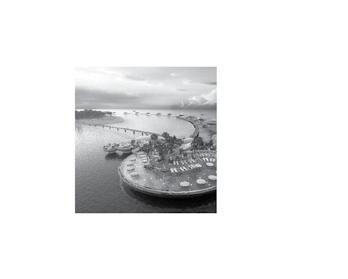

28,000 sq km of land and water 200 km of coastline Mountains Dormant volcanoes Wildlife Desert
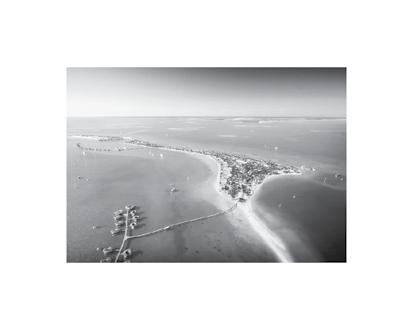
Luxury & Comfort

20 RSG Sustainability Report 2021
Unique design concepts A new airport Yacht marinas Leisure and lifestyle facilities Luxury residential properties Commercial, retail and recreational facilities 16 hotels post phase 1 50 hotels post phase 2 3000 rooms post phase 1 8000 rooms post phase 2 2 inland sites post phase 1 6 inland sites post phase 2 5 islands to be developed post phase 1 22 islands to be developed post phase 2
Ambitious Environmental Commitments
100% reliance on renewable energy 30% increase in net conservation value
75% of the destination’s islands will remain undeveloped 1%

Less than 1% of the total Project area (28.000 sq. km) to be developed
75%
LEED Buildings Accreditations 9 islands will be designated as special conservation zones
Building the world’s most ambitious tourism development
Our progress in 2021
22 RSG Sustainability Report 2021
45% Ummahat Island 1 43% Southern Dunes 51% Shura Bridge 99% SWRO Plant 100% Shura & Mainland Causeway 100% Shura Road 100% Nursery 100% Airport Road 100% Turtle Bay Hotel 100% Management Residential (10 Buildings) 100% Management O ce 100% Land Raising 100% Waste Management Center 100% Desert Rock Road 100% Construction Village Housing 100% Base Camp 100% South Jetty 100% Concrete Batching Plant & QA/QC Testing Lab 100% Mainland Jetty 100% Main Jetty Road 45%1 Phase 1 Overall Completion 35% Ummhat Island 2 & 3 35% The Red Sea International Airport 34% Desert Rock 34% Shura Island 34% Sheybarah Island Legend: % Design Progress1 Overall progress is based on earned value: Planning 10%, Design 17%, Construction 66% and Direct Purchase 7% 2Represents overall progress for PPP Utilities & Infrastructure; not specific to location Construction Progress Completed Overall Progress 99% Villas & Townhouses 69% Studio Apartments 25% PPP Utilities & Infrastructure 2 63% Workers’ Accommodation (Z-Types) 63% Utilities Infrastructure
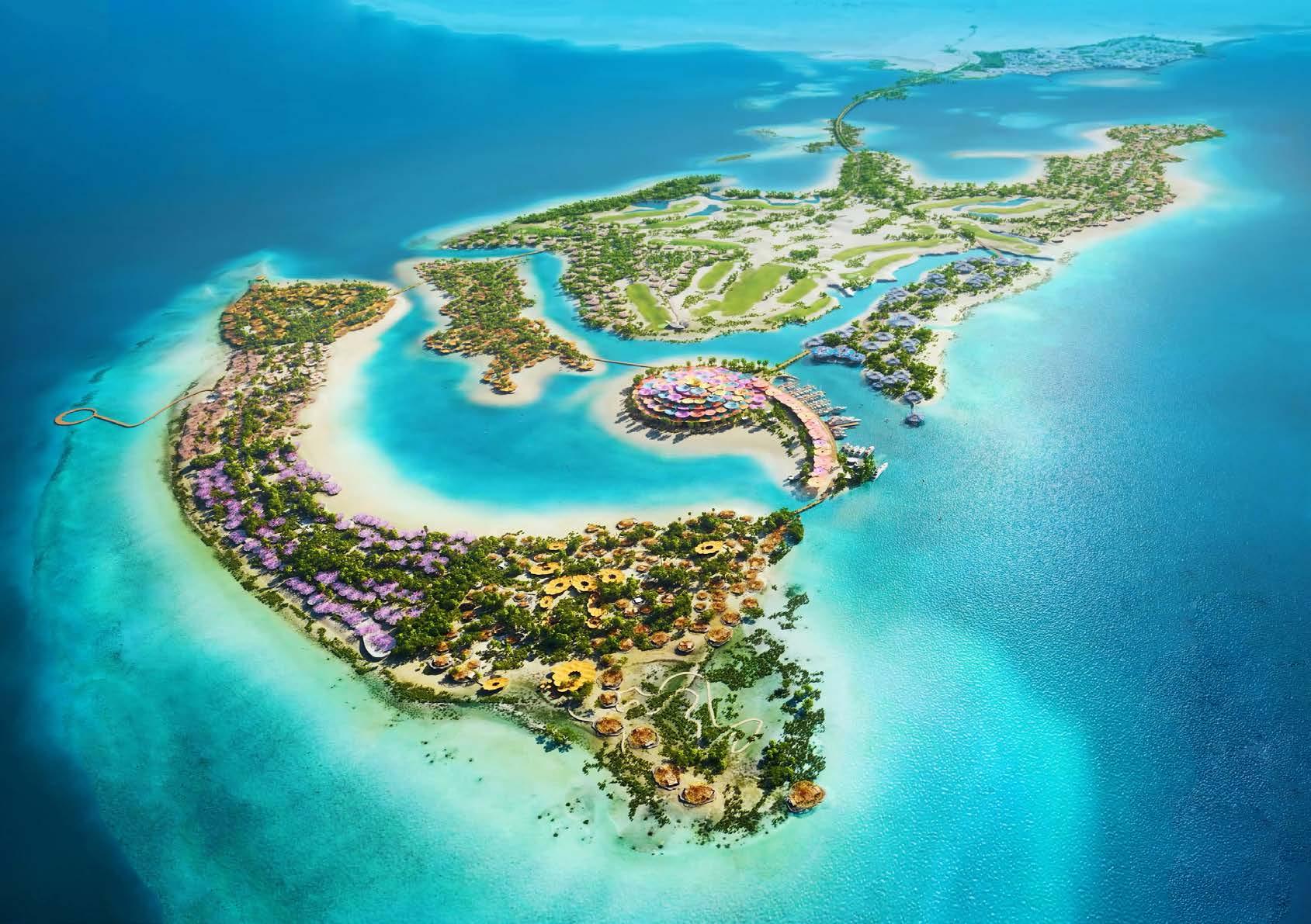
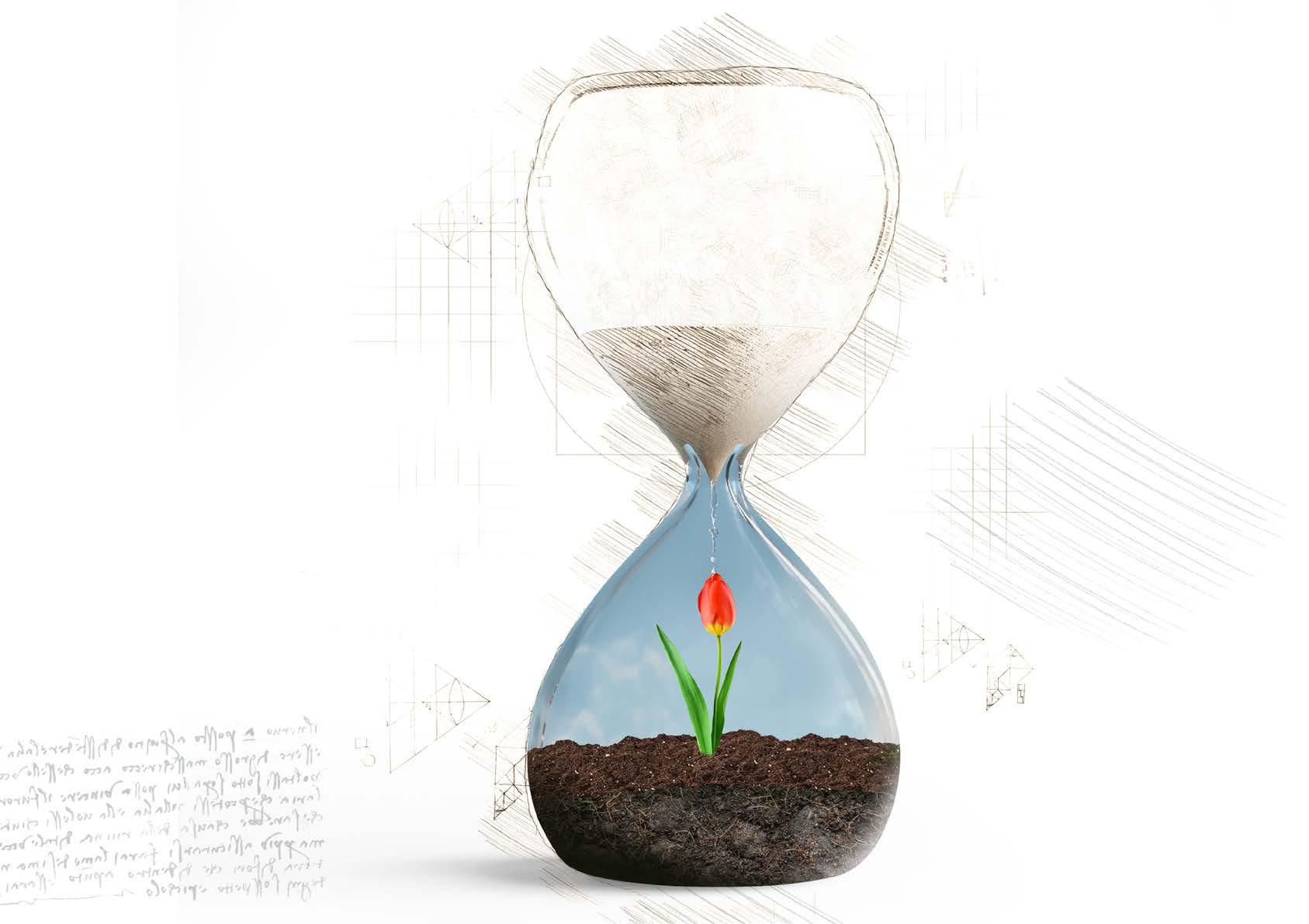
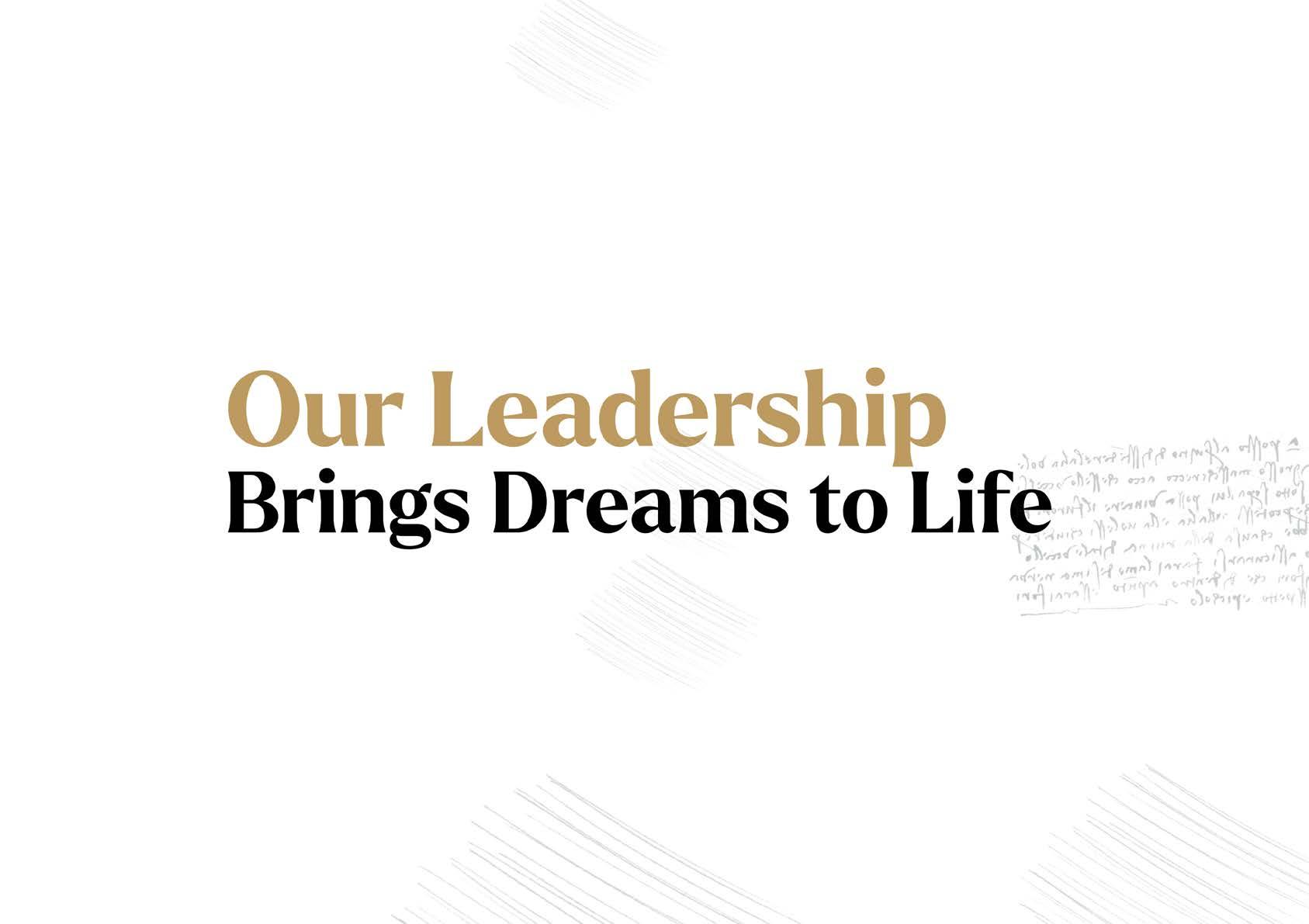
Board of Directors
Led by H.R.H. Crown Prince Mohammed bin Salman bin Abdulaziz, our Board represents the best talent from the corporate and institutional realms. Each of the 10 visionary, experienced and impressive members of the Board is committed to establishing RSG as a forward-thinking leader in regenerative luxury tourism and contributing to Saudi Vision 2030.
“Our real wealth lies in the ambition of our people and the potential of younger generations.”
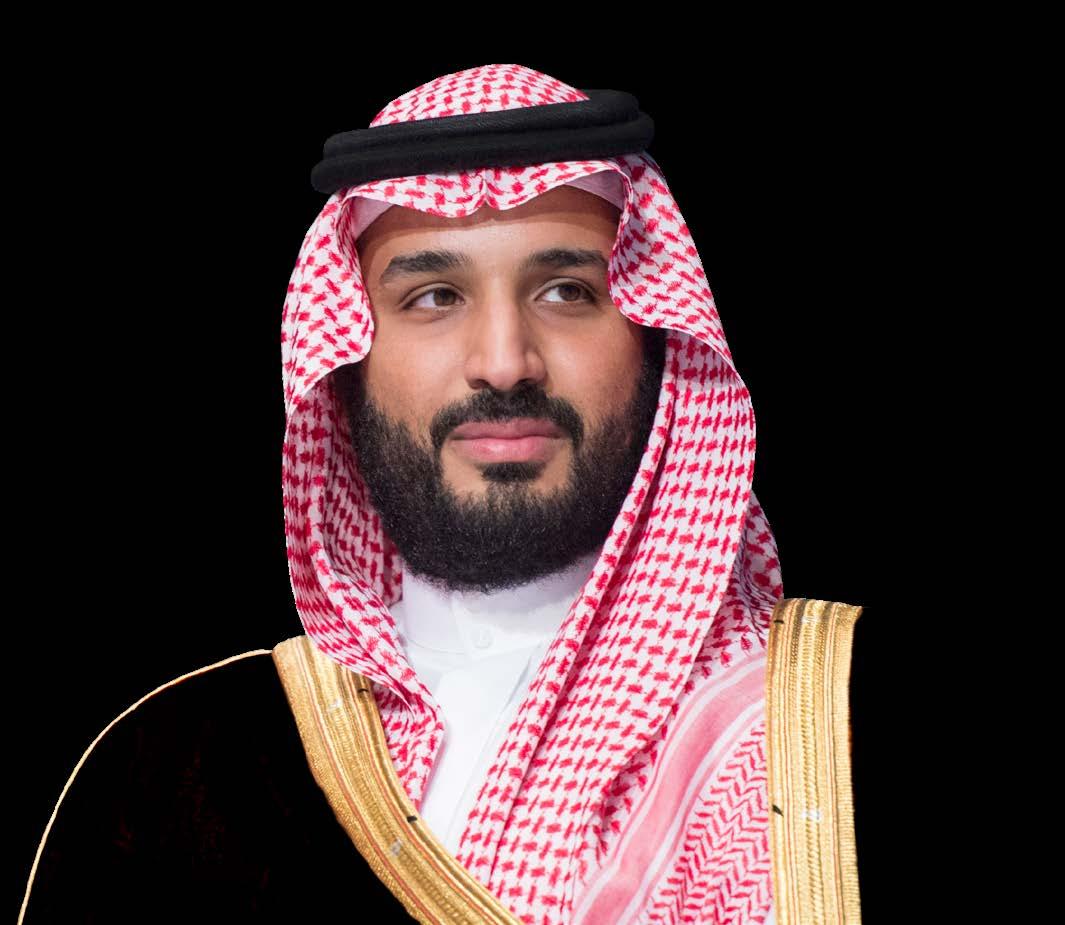
26 RSG Sustainability Report 2021
His Royal Highness Crown Prince Mohammed bin Salman bin Abdulaziz Al-Saud Chairman
H.H Prince Badr bin Abdullah bin Mohammad bin Farhan Al Saud 1
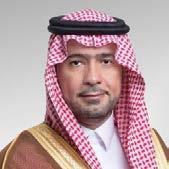
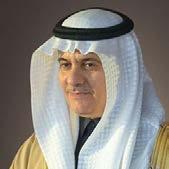
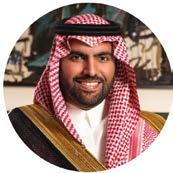
Board Member
H.E. Dr. Mohamed Wahid Hasan 2 Board Member
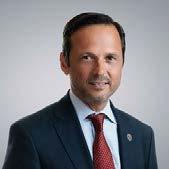
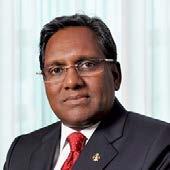
H.E. Dr. Majed bin Abdullah Al-Qassabi Board Member
H.E. Mr. Ahmed bin Aqeel Al-Khatib Board Member
H.E. Eng. Abdulrahman bin Abdulmohsen Al-Fadhley Board Member
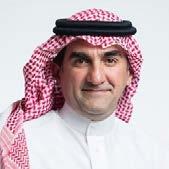
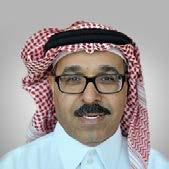
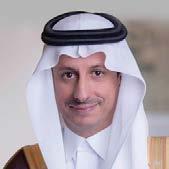
H.E. Mr. Majed bin Abdullah Al-Hogail Board Member
H.E. Mr. Yasir bin Othman Al-Rumayyan
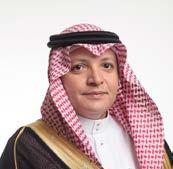
Board Member
H.E. Dr. Fahad bin Abdullah Toonsi Board Member and Secretary General of the Board
Eng. Nadhmi bin Abdrab Alnabi Al-Nasr Board Member
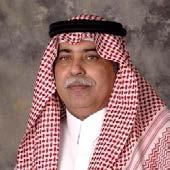
Mr. John Pagano Board Member Group Chief Executive Officer
1. Appointed on 26 December 2021
2. Resigned on 26 December 2021
27 RSG Sustainability Report 2021
Audit Committee
H.E. Mr. Majed bin Abdullah Al-Hogail Committee Chairman
H.E. Mr. Abdulaziz bin Saleh Al-Furaih Member

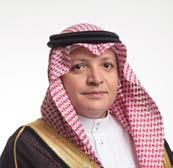


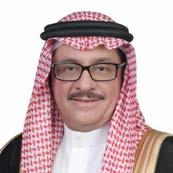
Mr. Yousef bin Mohammed Al-Mubarak Member
Nomination & Remuneration Committee
H.E. Eng. Abdulrahman bin Abdulmohsen Al-Fadhley Committee Chairman
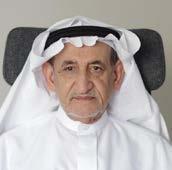
H.E. Mr. Majed bin Abdullah Al-Hogail Member
H.E. Dr. Fahad bin Abdullah Toonsi Member
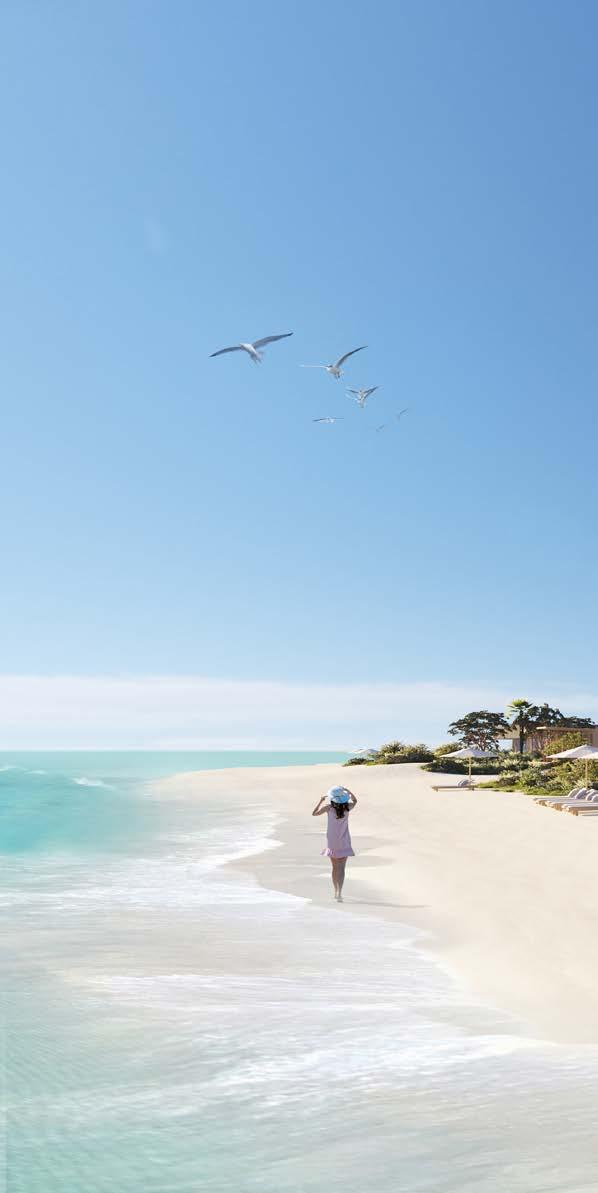
28 RSG Sustainability Report 2021
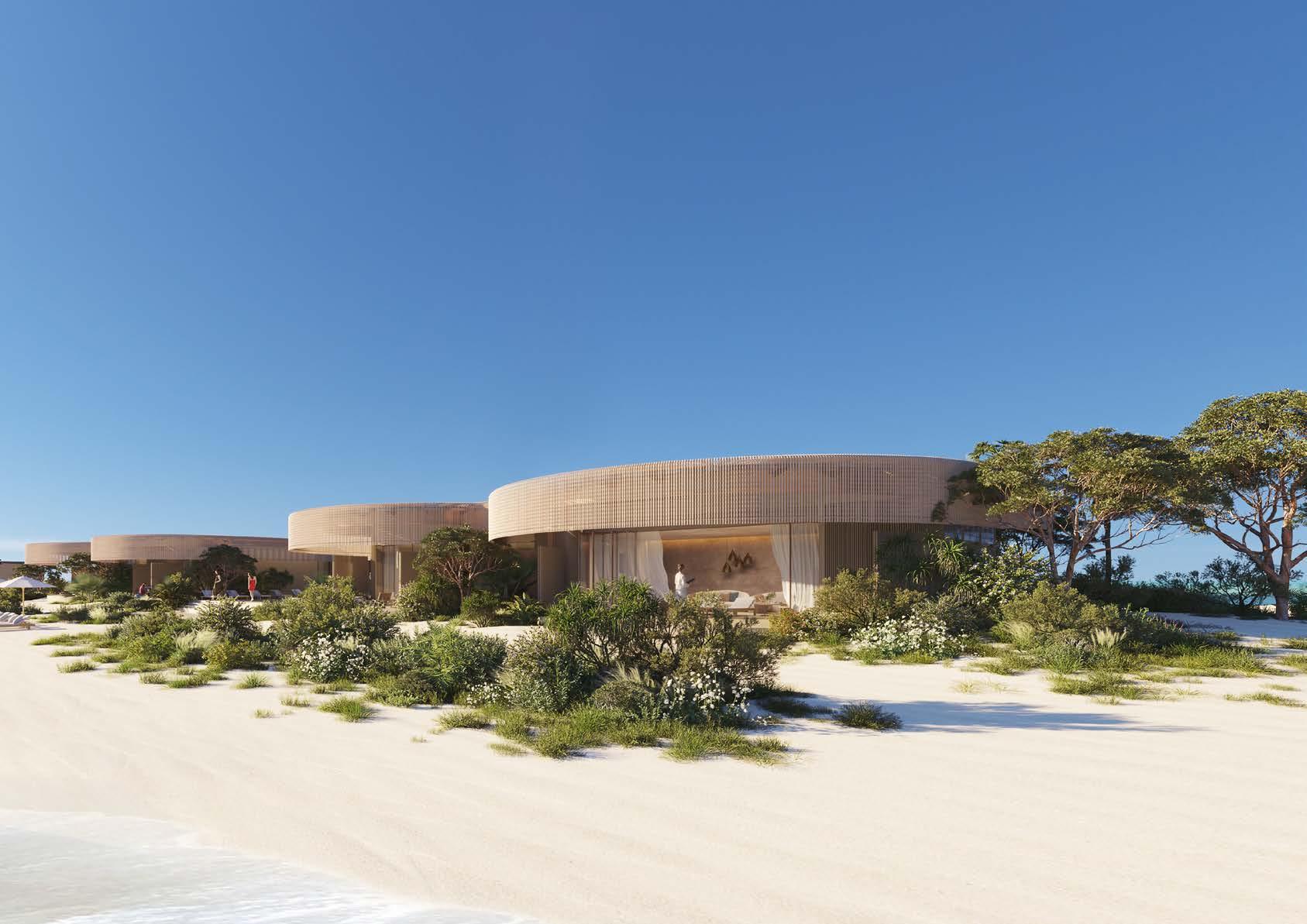
Subsidiary Governance Committee
With our growing ambitions, the number of subsidiaries grew from four to six. In August, we formed the Subsidiary Governance Committee to oversee our subsidiaries.
The members of the Subsidiary Governance Committee bring immense experience, knowledge and a profound belief that our subsidiaries are integral to our future success.
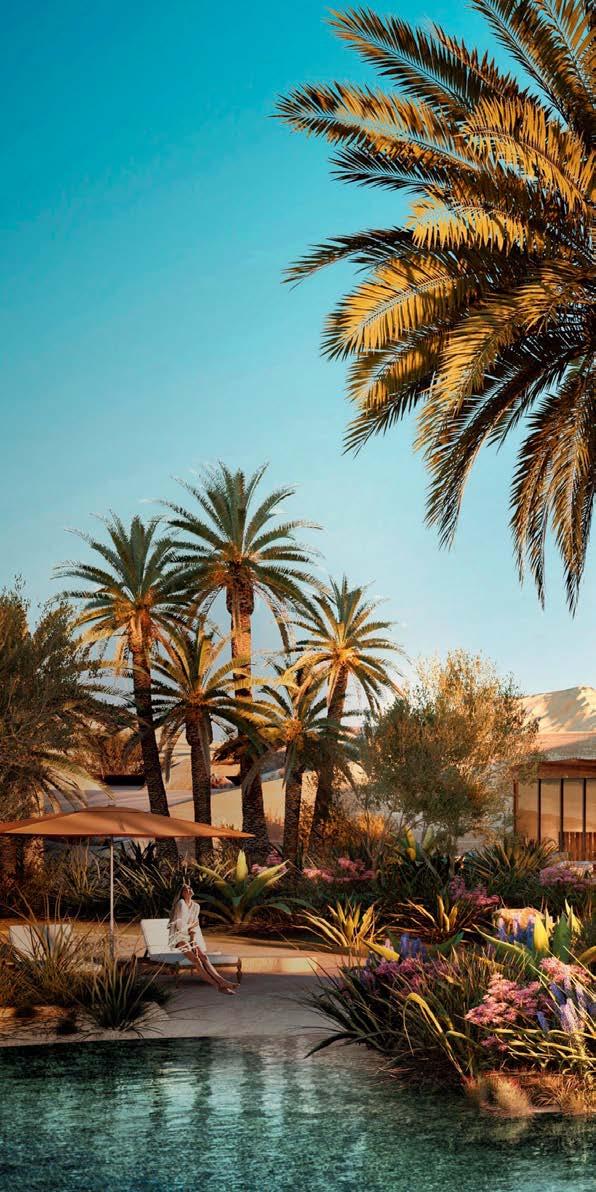
H.E. Dr. Fahad bin Abdullah Toonsi Committee Chairman
H.E. Eng. Abdulrahman bin Abdulmohsen Al-Fadhley Member
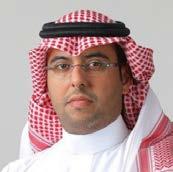
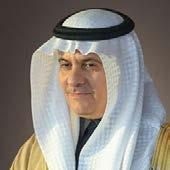
H.E. Mr. Ahmed bin Aqeel Al-Khatib Member
H.E. Mr. Majed bin
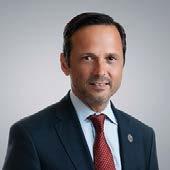

Abdullah Al-Hogail Vice Chairman

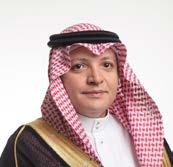
Mr. John Pagano Member
Mr. Asim bin Mohammad Al-Suhaibani Member
30 RSG Sustainability Report 2021
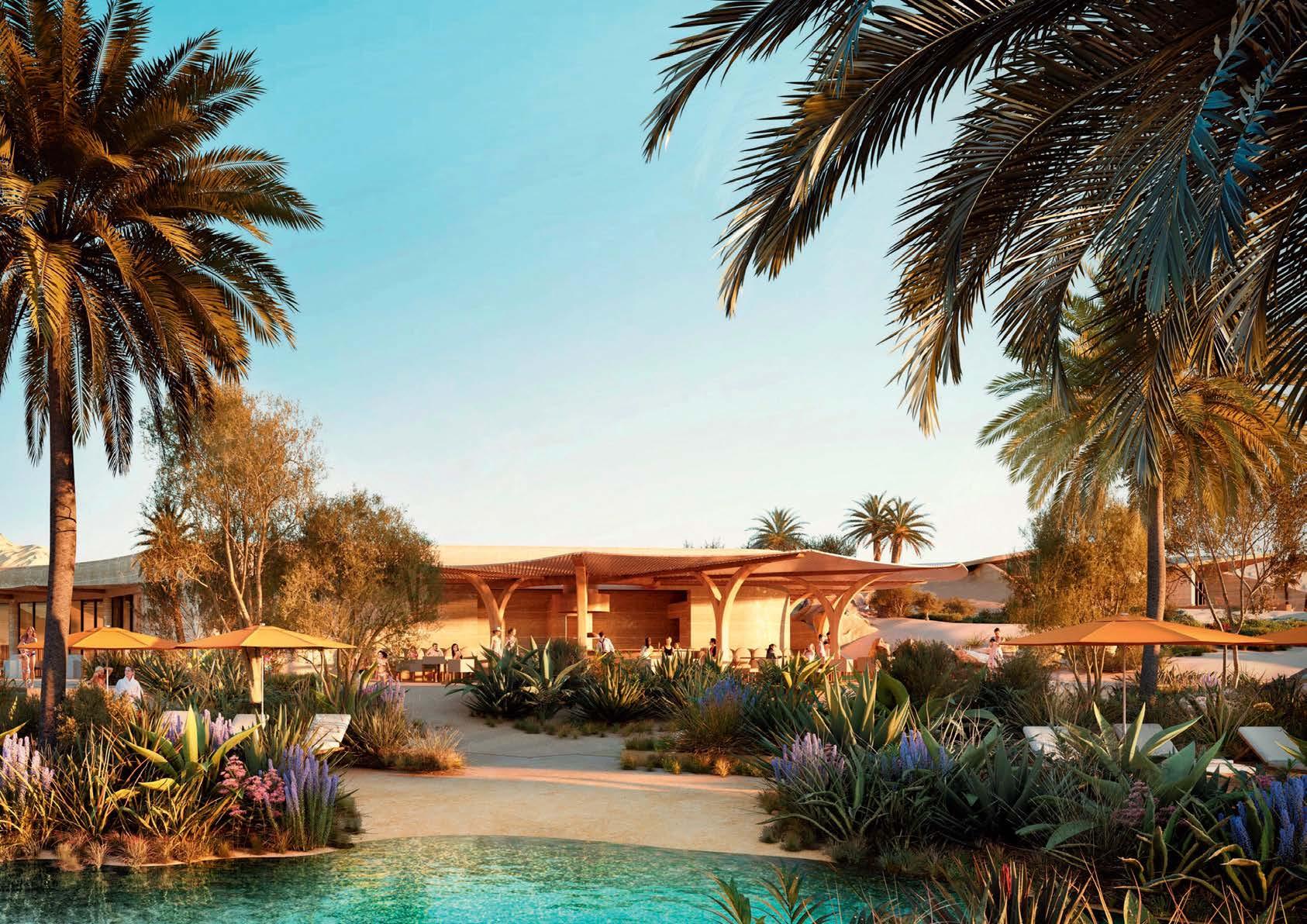
Advisory Board

Our Advisory Board brings together a talented group of experts who provide our Board, CEO, and the RSG’s management team with cutting-edge thinking and strategic guidance. They are also our global ambassadors, shining a light on The Red Sea Project, and therefore helping to position Saudi Arabia on the global tourism map.
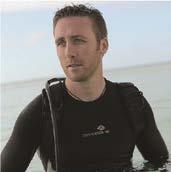
1. Appointed to RSG’s Advisory Board on 12 August 2021

2. Appointed to RSG’s Advisory Board on 17 April 2021



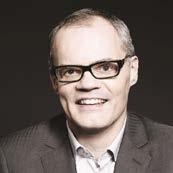

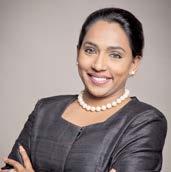
3. On 19 December 2020, the Board of Directors approved the non-renewal of memberships of Mr. J. Carl Ganter, Mr. Vijay Poonoosamy and Mr. Paul Holthus.

32 RSG Sustainability Report 2021
Ms. Aradhana Khowala Committee Chairperson
Mr. William McDonough
Ms. Sue Harmsworth
H.E. Dr. Mohamed Wahid Hasan1 Mr. Philippe Cousteau Jr.
Mr. Frits Dirk van Paaschen
Mr. Piers Schmidt2
Professor Carlos Duarte
Mr. Horst Schulze 1
Ms. Frances-Anne Keeler 2

Executive Management

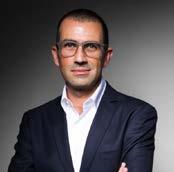
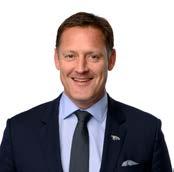
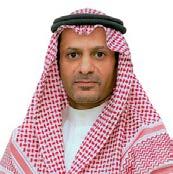
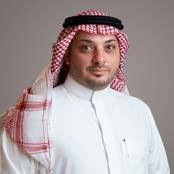
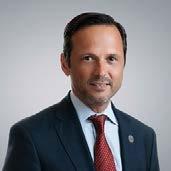
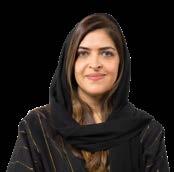
As we seek to revolutionize tourism on a global scale, we are emboldened by an Executive Management team comprising of a diverse group of executives who are passionate about positioning our organization at the forefront of regenerative tourism.

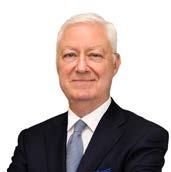
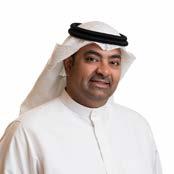

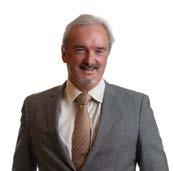
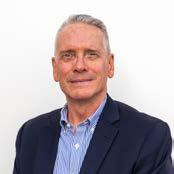
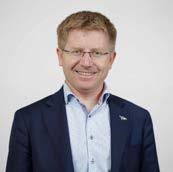
34 RSG Sustainability Report 2021
Ian Simmonds
Group Head of Cost, Commercial & Procurement
Brian Spraker Head of Health and Safety
John Pagano
Group Chief Executive Officer
Ian Williamson Group Chief Projects Delivery Officer
Jay Rosen Group Chief Financial Officer
Dr. Maryam Ali Ficociello Group Chief Governance Officer
Nicholas King Group Chief Development Officer
Ahmad Ghazi Darwish Group Chief Administrative Officer
Raed Albasseet
Group Chief Environment & Sustainability Officer
Dr. Rusty Brainard Red Sea Zone Authority Chief Environmental Officer
Tareq Musmali Group Chief Internal Auditor
Tracy Lanza Group Head of Marketing & Communication
Stuart Davies General Counsel
Anton Bawab Group Head of Operations
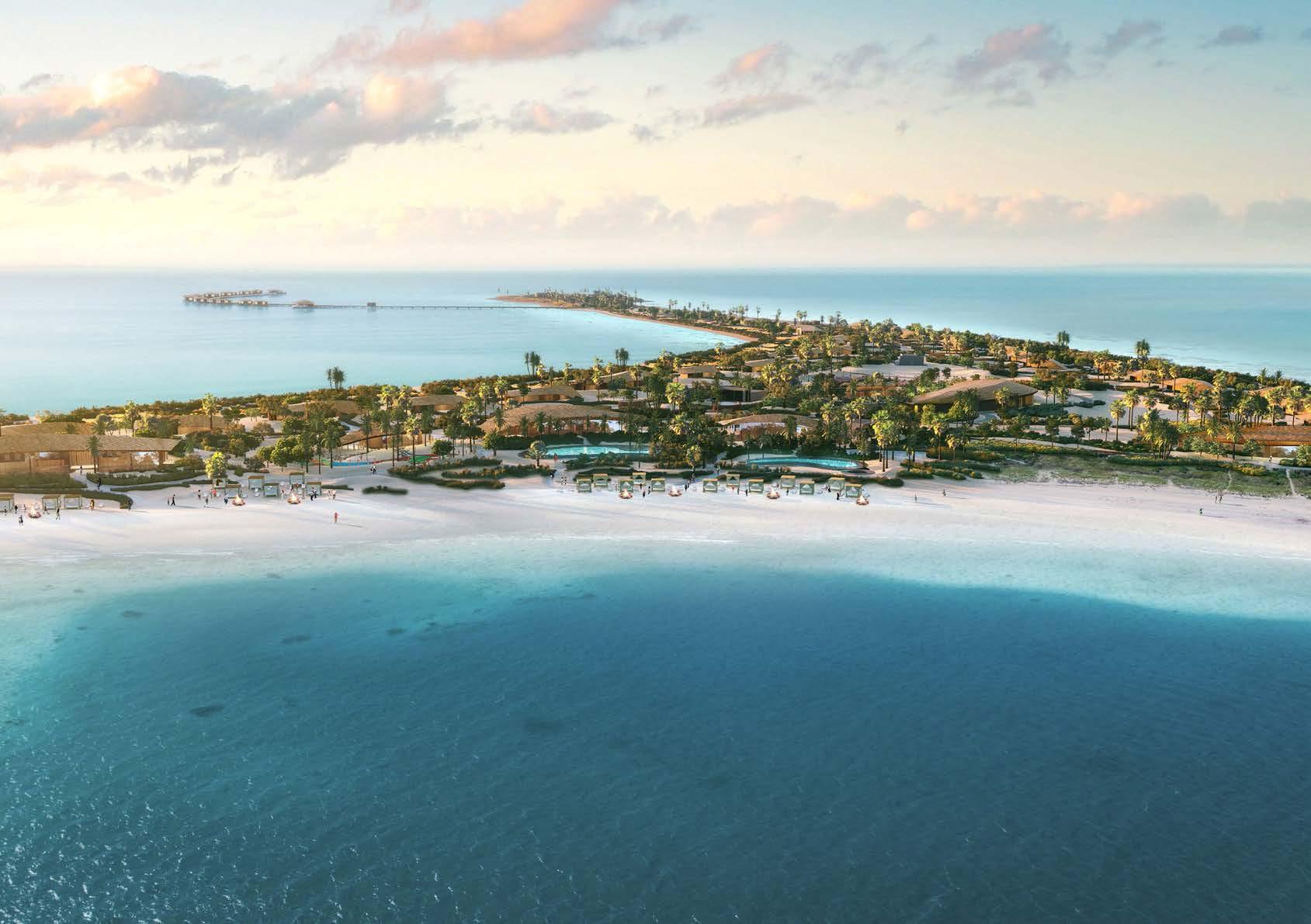
Aligning with our nation’s vision
Vision 2030 is a bold blueprint intended to build the best future for the Kingdom of Saudi Arabia. It is designed to harness and showcase the nation’s greatest strengths, build upon its leading role at the heart of the Arab and Islamic worlds, and help create a more sustainable economy by forging new and stronger cultural business connections with the world.
RSG plays an integral role in supporting each of the three pillars of Vision 2030 and we are committed to demonstrating our contribution to its achievement through our sustainability reporting.
A VIBRANT SOCIETY A THRIVING ECONOMY AN AMBITIOUS NATION

By completion, The Red Sea Project aims to:
Implement a range of community programs in partnership with national ministries and international entities that empower youth and catalyze positive social change through civic engagement.
Directly employ around 35,000 people and support an equivalent number of jobs in the wider community by creating indirect and induced jobs and opportunities for local businesses, entrepreneurs and supporting industries. Our estimated contribution to Saudi Arabia’s Gross Domestic Product (GDP) is 22 billion Saudi Arabian Riyal (SAR) once fully operational.
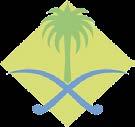
Set new standards in luxury travel and position Saudi Arabia on the global tourism map by providing rare opportunities to enjoy culture and the natural world, together with high-quality personalized accommodation and service.
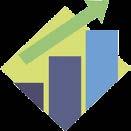
36 RSG Sustainability Report 2021
Vision
Establish RSG as the leading sustainable luxury tourism destination developer of the world.
Mission
To become a leading global real estate company with world-class internal capabilities through the development of The Red Sea Project and by expanding to develop new projects. By establishing a vertically integrated development company, we ensure our ability to build unique destinations to the highest standards of quality and ensure that we deliver on our sustainability commitments while training Saudi talent, transferring skills to the local market, and preparing for a bright and vibrant future of growth and regeneration.
Values
Respect Responsibility Collaboration
• Respect is at the center of everything we do and is the beating heart of our values.
• We treat all our colleagues with respect and embrace different backgrounds and perspectives.
• We have a deep respect for the natural environment and are committed to protecting it for future generations.
• We respect the culture and heritage of Saudi Arabia.
• We are proud to be at the forefront of the responsible tourism industry.
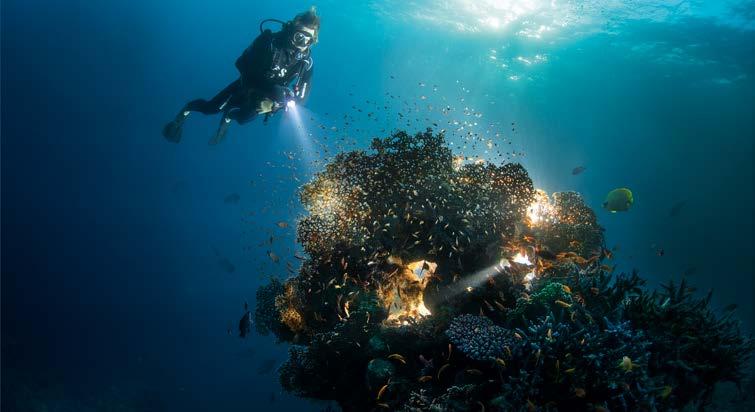
• We develop and positively impact the surrounding social community.
• We are helping to increase opportunities both within the destination’s communities and across Saudi Arabia.
• Sustainability drives our actions to preserve and enhance the environment.
• We take responsibility for the natural environment, and we will preserve, protect and enhance it.
• We communicate, share knowledge and work together in a caring and diverse culture. We work hand-in-hand with our stakeholders and partners to succeed.
• We embrace opportunities to learn and develop skills from our colleagues.
• We believe that by coming together as one team, we can achieve the best outcomes for our company and country.
• We affiliate with like-minded partners and suppliers to achieve RSG’s ambitious goals.
Passion
• We are passionate to achieve results with excellence.
• We continually go beyond what is expected of us to achieve the best outcomes.
• We strive every day to achieve the ambitious targets of our company.
• We are passionate about Saudi Arabia and the opportunity to showcase our warm hospitality to the world.
37 RSG Sustainability Report 2021
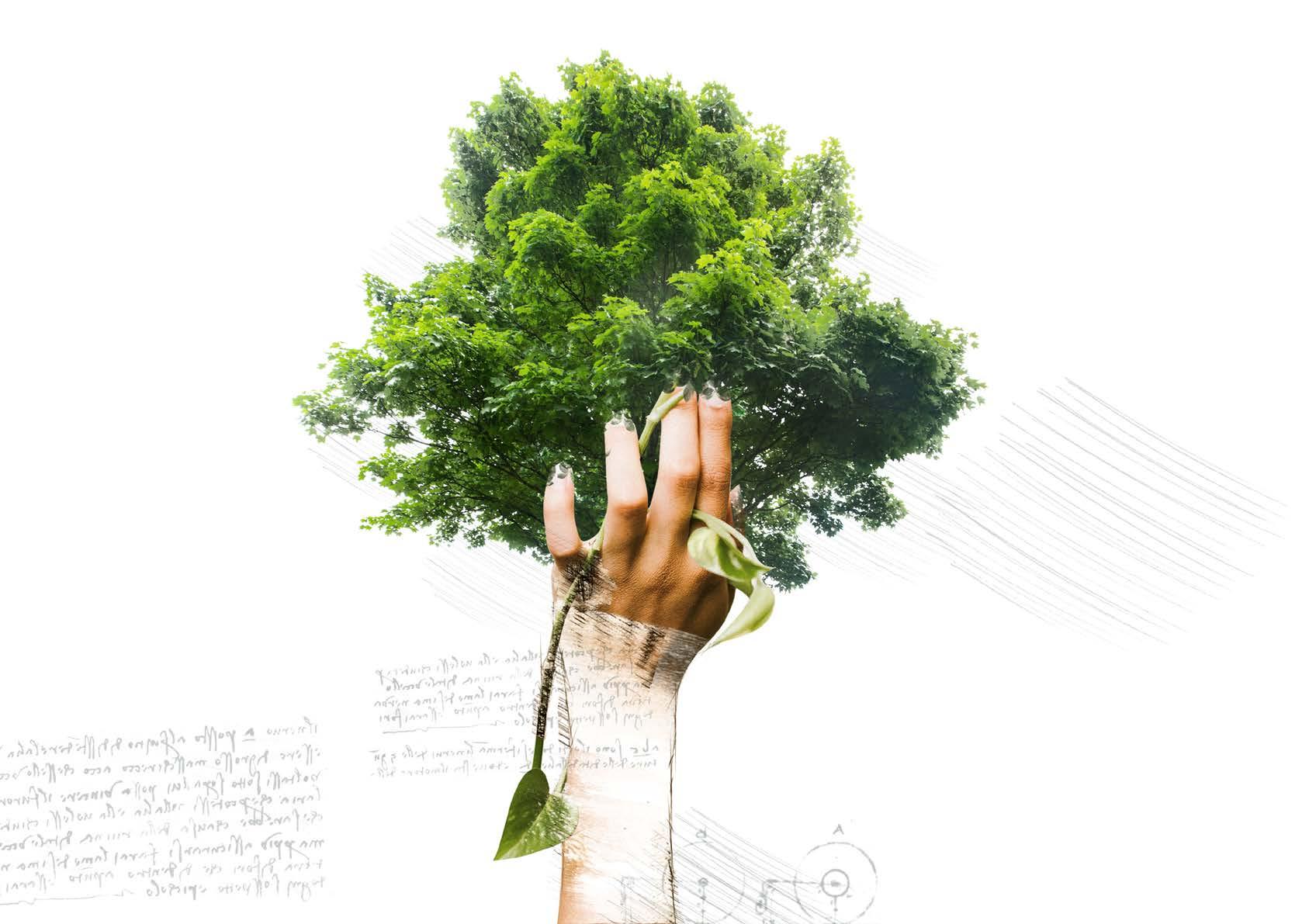
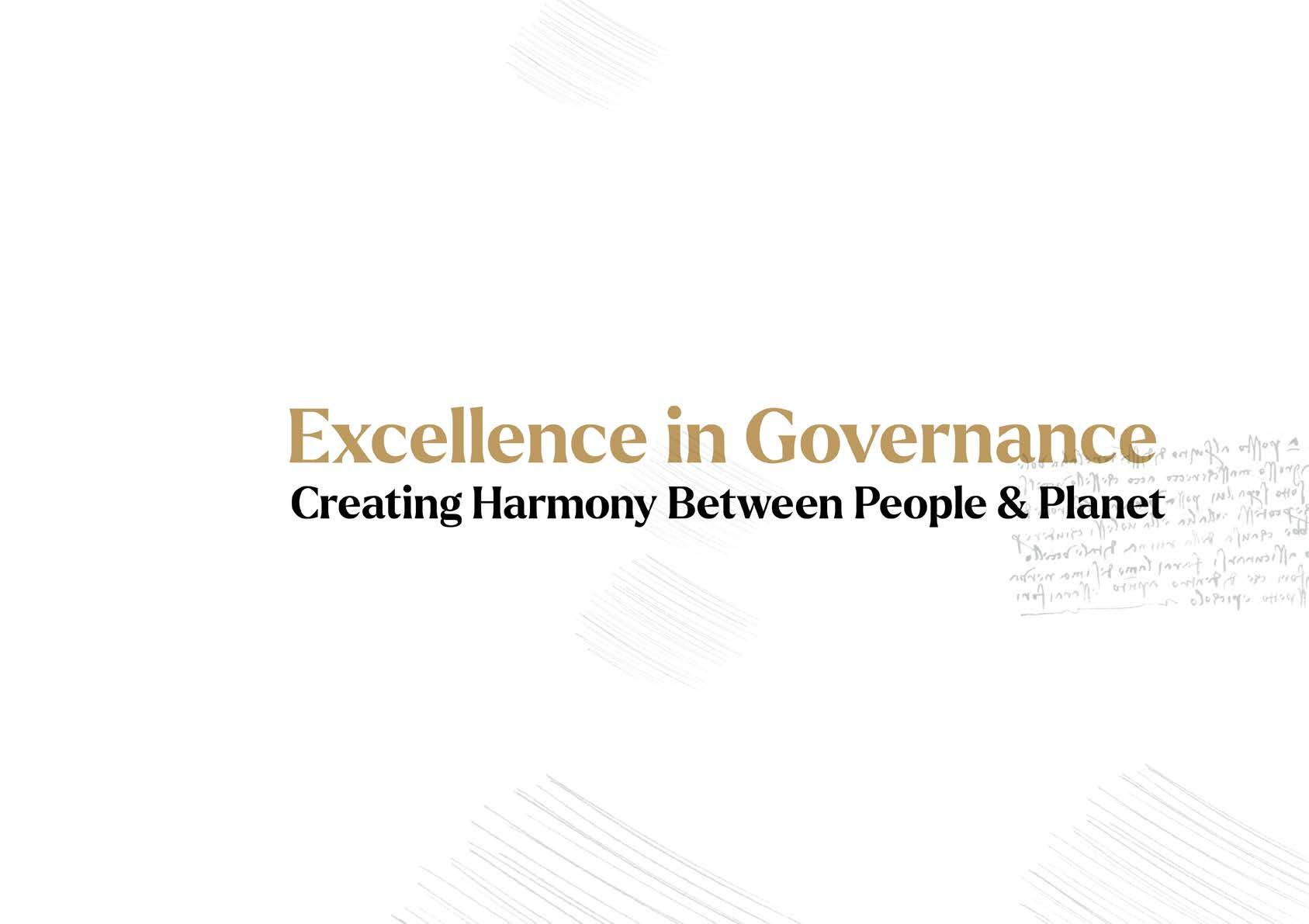
At RSG, we aim to set new standards in sustainable development, respecting the natural world, creating opportunities for local communities and protecting the destination for the future generations. Good governance is much more than simply complying with a set of rules and regulations. It binds all functions of a business together, irrespective of their different priorities and ensures that everyone abides by the same set of ethical standards.
Our experience has taught us tha investing time and resources into setting high standards from the outset pays back dividends. When strong governance principles are defined, they play a key role in establishing credibility with employees, shareholders, investors and business partners. All businesses should view governance as an opportunity to not only set themselves up for success but also to demonstrate responsible oversight and management.
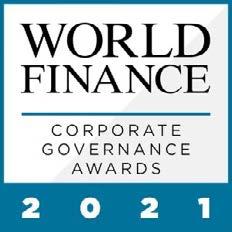
At RSG we are striving to build a ground-breaking tourism destination, and that means taking a comprehensive approach that sets new standards in good governance, compliance and risk management.
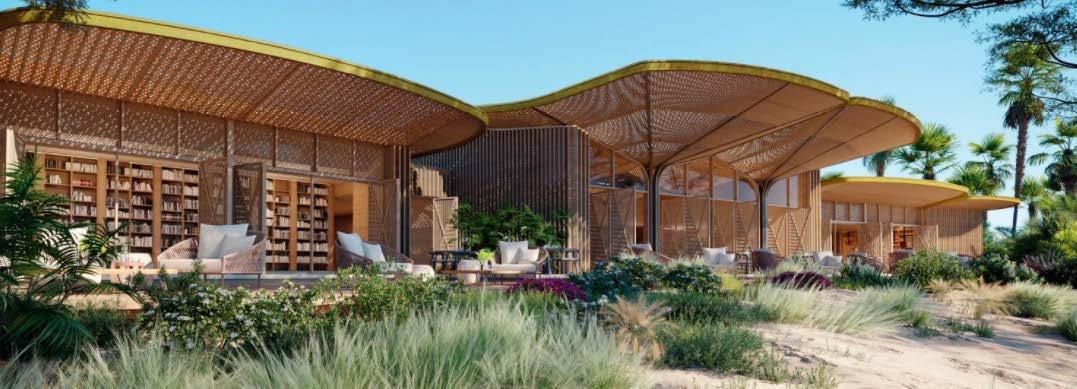 Dr. Maryam Ficociello
Dr. Maryam Ficociello
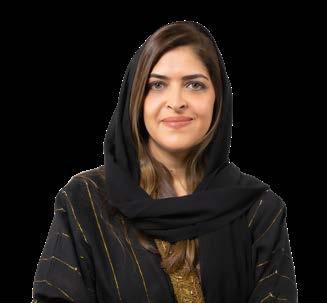
40 RSG Sustainability Report 2021
41 RSG Sustainability Report 2021
Chief Executive Officer
Red Sea Zone Authority Environmental Sustainability Internal Audit Governance, Risk & Compliance Audit Committee Advisory Board Cost, Commercial & Procurement Development Finance & Investment Health & Safety Environment & Sustainability Operations Legal Projects Delivery Administrative Office Global Brand Development & Marketing Nomination & Remuneration Committee Subsidiary Governance Committee
organizational
Group
Board of Directors
Our governance and
structure
Our Management Committees
Six Management Committees drive our business on a day-to-day basis.
Executive Management Committee
Supports our Group CEO in exercising oversight responsibility and coordinates our operational and risk activities in line with our corporate strategy.
Sustainability Management Committee
Reviews and oversees the implementation of our sustainability strategy, environment and sustainability framework, strategic KPIs, targets, programs, and initiatives across our organization, projects and subsidiaries.
We are complying with ISO 37000: Governance of Organizations, and are aiming to become certified in 2022
Raising the bar of good governance
We follow a strong set of governance principles to ensure effectiveness, supervision and accountability across every area of our organization.
Cybersecurity Management Committee
Approves and oversees the implementation of our cybersecurity strategy, while making sure it is aligned with our strategic objectives and compliant with the relevant regulations.
Grievances and Termination Management Committee
Reviews, investigates, and recommends a course of action for grievances raised by employees.
We have committed to going beyond the local legal and regulatory requirements. We follow international frameworks and reporting structures to guarantee that we live by our core governance principles: accountability, transparency, fairness and responsibility.
We have adopted the Open Compliance and Ethics principled approach for an integrated Governance, Risk and Compliance (GRC) Framework.
Business Resilience Management Committee
Oversees Business Resilience Management responsibilities and acts as a strategic committee in the event of a crisis. This includes sustainabilityrelated emergencies and crises.
Risk Management Committee Established in 2021
Oversees and monitors the strategies, policies and practices to identify, manage, mitigate and report our material risks including environmental, social and governance risks.
42 RSG Sustainability Report 2021
Sharing best practices
We believe that sharing best practices with other organizations will unlock a wealth of knowledge and experiences across the business community, speed up the learning curve, and establish a culture of continuous improvement.
Therefore, we have published externally our own Internal Control Toolkit, which sets an example of good governance for other organizations. This toolkit is based on the Committee of Sponsoring Organizations (COSO) Framework and covers the different maturity stages of the internal governance life cycle from project ideation, through to implementation and closing. The toolkit offers step-by-step guidance, templates and tools that can be implemented from day one of a project or business.
Our Internal Control Toolkit covers our corporate strategy, departmental strategies, departmental policies, our risk management approach, internal audit, and many other entity-level controls which are assessed and reviewed on an ongoing basis for continuous improvement. We report periodically to the Board of Directors on the toolkit performance and outcomes to provide them with assurance about our robust control environment.
The RSG’s Internal Control Toolkit is impressively easy to use and follow. By embracing COSO’s Internal Control – Integrated Framework as a foundation, they have compiled a comprehensive and simple guide to structuring governance practices. Bringing this guide into circulation will assist entities in adopting a principles-based approach towards developing, managing and monitoring their internal controls.
Paul J. Sobel, Chairman of COSO
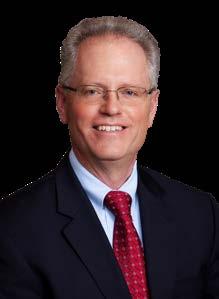
Click here or scan this QR code to find out more

Supporting good governance across KSA
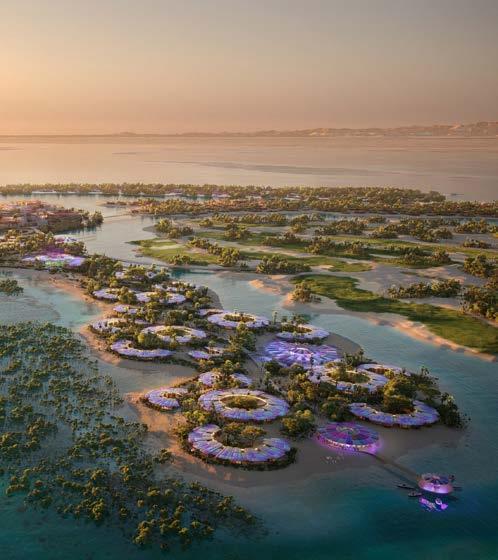
Enabling agile deployment of best practice internal controls
Providing guidance on the implementation and phasing of internal controls
We are pleased to share this tried and tested toolkit to support other entities with their governance journey, thereby improving governance practices across KSA. As more and more entities in KSA become better governed, our economy will become more sustainable over the long term.
H.E. Dr. Fahad Toonsi, Board Member and Secretary General of the Board
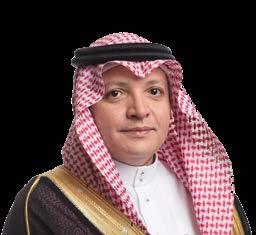
43 RSG Sustainability Report 2021
Digitizing our GRC Program
We have conducted a large-scale implementation of the Enterprise GRC Solution (Solution) which leverages technology to integrate and automate our organization’s risk and control functions and achieve enhanced monitoring, reporting and alignment across multiple divisions, thereby building more trust in our processes. The Solution is planned to be launched by the end of Q1 2022 and will also cover Health and Safety, Business Continuity Management, Environment and Sustainability, and Internal Audit.

44 RSG Sustainability Report 2021
A culture of ethics, integrity and compliance
Ethical conduct, personal and business integrity and legal and regulatory compliance are essential elements of good governance. They help ensure that we stay true to our corporate principles and culture, and place an expectation on us to always do the right thing and in all circumstances. Compliance and Ethics are embedded into our activities, functions and processes to ensure that our responses to compliance obligations remain current and dynamic.
Our policy is to be transparent in our compliance management process, both internally and externally. We aim to create awareness and understanding of our compliance culture. We go beyond compliance with laws and regulations. We are proactive in promoting a culture of ethics and integrity where all employees are aware of our guiding values and are continuously adopting the right behaviors.
We have articulated multiple policies around key areas of focus, including but not limited to:
• Anti-bribery and Corruption
• Code of Conduct
• Confidentiality
• Conflict of Interest
• Gifts and Hospitality
• Related Party Transactions
• Supplier Code of Conduct
• Transparency and Disclosure
• Whistleblowing
Compliance with a Purpose
We are aligning with leading practices and have developed our Compliance Management Program in line with ISO 37301. We aim to become certified by 2022.
Recognitions for our excellence in governance
Ethical Boardroom Awards for excellence in corporate governance Special Recognition Award for Real Estate Developer - Middle East
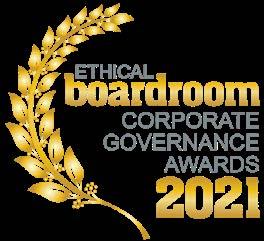
45 RSG Sustainability Report 2021
Combatting unethical and unlawful behavior
An open door policy
All employees are responsible and encouraged to report or consult on matters related to ethics and integrity, and to report concerns about unethical or unlawful behavior to their line manager, the Internal Audit Division or the GRC Division. Our Whistleblowing Policy provides guidelines on when and how to report suspected instances. Our Internal Audit Division investigates the reported matters and may involve other concerned divisions on a case-bycase basis.
Our online Whistleblowing Platform
• Available in English and Arabic
• Accessible 24/7
• Anonymous channel
• Available to employees and non-employees
Non-Discrimination and Non-Retaliation
While we strive to retain anonymity, we are aware that in some instances, persons who are familiar with the situation may be able to guess the whistleblower’s identity. Therefore, our Whistleblowing Policy also protects people who raise such concerns from discrimination, harassment, retaliation, or other adverse employment or reputational consequences.
Sustainability and accountability are two sides of the same coin. As we strive to push the boundaries of regenerative tourism, we have committed to rigorous internal audit procedures, ensuring that we meet the highest standards for ethics, integrity and compliance.
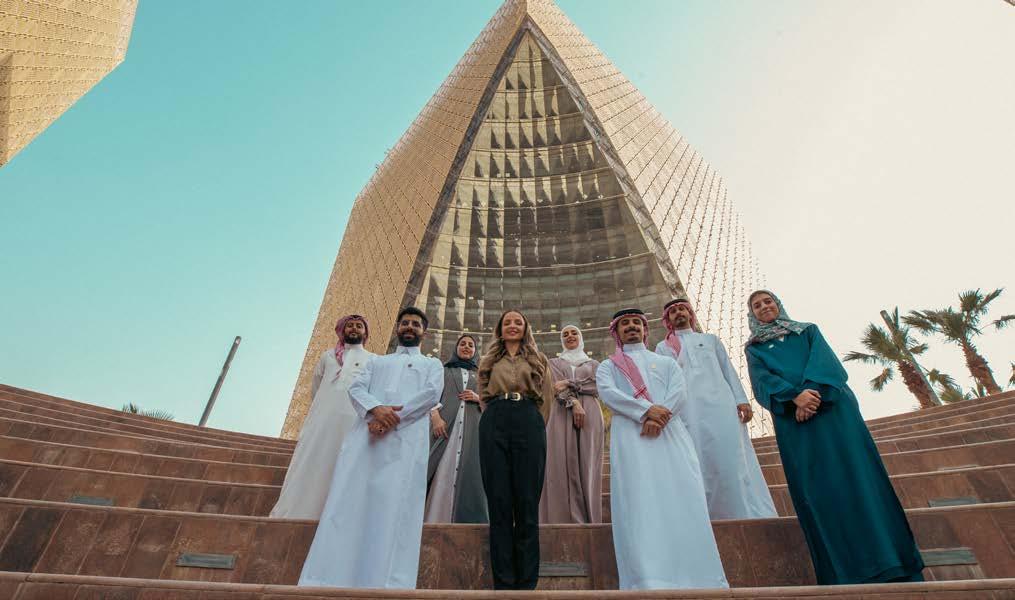 Tareq Musmali, Group Chief Internal Auditor
Tareq Musmali, Group Chief Internal Auditor
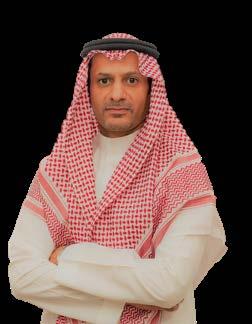
46 RSG Sustainability Report 2021
19 whistleblowing cases were received in 2021 100% were investigated
Governance and Oversight
Our core corporate governance policies, developed by the GRC Division, are regularly reviewed and approved by the Board. Our Code of Conduct encompasses all of the policies mentioned above, and all our employees must annually read it, sign and declare that they will abide by the Code. Our Group Chief Governance Officer maintains oversight and responsibility over disclosures, and through our Compliance Department, all necessary disclosures are raised with our Board (where applicable) and the relevant regulatory bodies.
Avoiding, disclosing and managing conflicts of interest

Our Conflict of Interest policy outlines the guidelines required to avoid, prevent and manage conflicts of interest, and ensure that accountability and transparency are prevalent in our organization. It applies to our Board Members, Committee Members, Executive Management, Employees, Consultants, Contractors, Seconded Staff and any other persons associated with our organization at group or subsidiary-level.
Our policy stipulates that all concerned persons are required to act responsibly, respectably and to remain free of influences that may result in the loss of objectivity regarding business conducted with our organization or its stakeholders. All conflict of interests involving Board Members and Executive Management should be disclosed, managed and reported as per our applicable policies.
47 RSG Sustainability Report 2021
Safeguarding ethics and integrity
As we strive to maintain uncompromising adherence to ethics and integrity, our organization’s policies and processes are by design developed in ways that prevent incidents of misconduct. We have also implemented additional safeguards to enforce compliance.
Risk assessments
We regularly conduct systematic risk assessments to identify, analyze and control potential risks associated with our main activities, and continually establish the necessary safeguards, controls and governance processes.
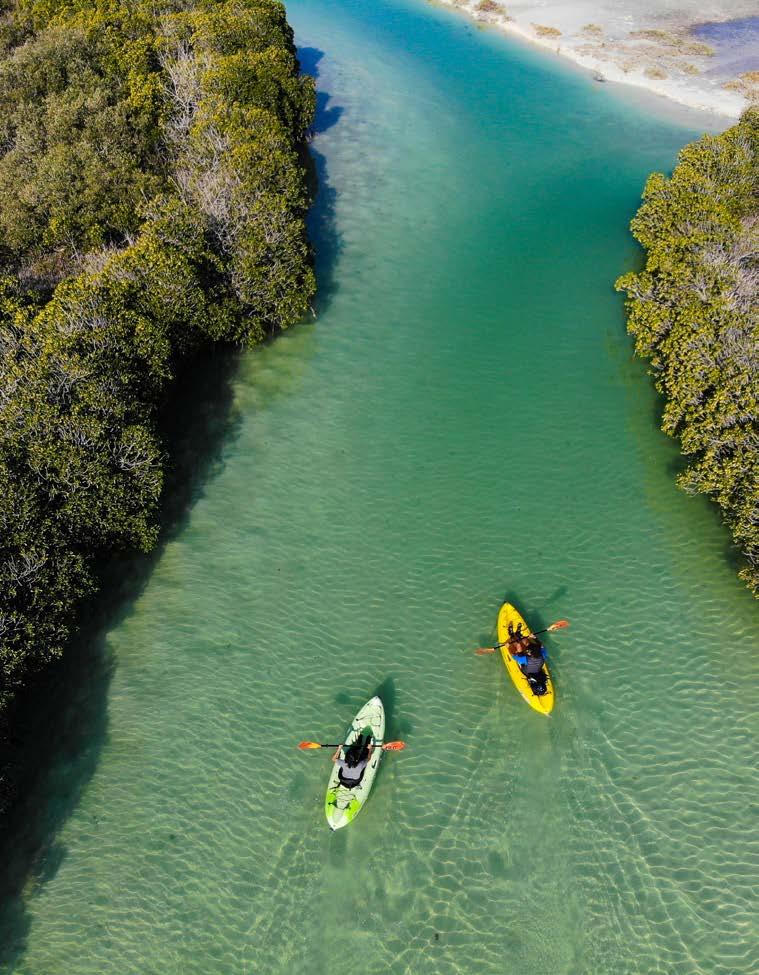
Compliance assessments
We conduct compliance assessments and reviews to ensure adherence to the regulatory landscape and our internal policies. These assessments help us identify areas of actual and potential non-compliance and provide recommendations on our controls frameworks.
Internal Audit reviews
Our Internal Audit Division undertakes independent reviews of key activities and processes to provide reasonable assurance that the relevant policies and processes have been followed. This line of defense helps us evaluate processes, detect potential deviations, and provide recommendations to improve the effectiveness of risk management, and governance processes.
48 RSG Sustainability Report 2021
Our Supplier Code of Conduct
We expect our suppliers to align with our ethics, integrity and compliance culture.

We have developed a Supplier Code of Conduct around legal and ethical standards of conduct that suppliers are expected to adhere to. This Code of Conduct articulates policies around multiple areas of ethical risk. It provides information on how to avoid, recognize and deal with ethical issues, including reporting cases of unethical conduct to our organization in line with our Whistleblowing Policy.
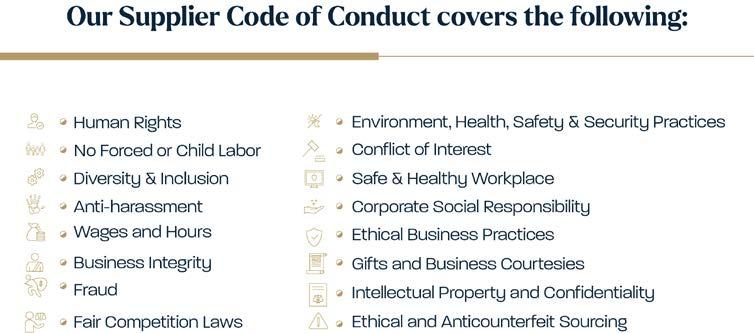
Spotlight on some of the requirements of our Supplier Code of Conduct:
• All suppliers must adhere to the human rights law of KSA, the country in which they operate, and all other applicable standards.
• Slavery or involuntary labor of any kind is prohibited, this includes prison labor, debt bondage, forced labor, human trafficking, physical or psychological abuse, threats of violence, forms of violence, or other forms of physical or mental coercion.
• Suppliers should compensate their employees at least per the minimum legal wage or a wage that meets local industry standards.
• Suppliers should conduct operations in ways that limit overtime to a level that ensures humane and productive working conditions.
• Overtime and any incentive rates should be paid as required to meet standards.
• Workers should receive necessary time off, paid annual leave and holidays, as required by local laws.
49 RSG Sustainability Report 2021
100% of our supplier contracts include an anti-corruption clause
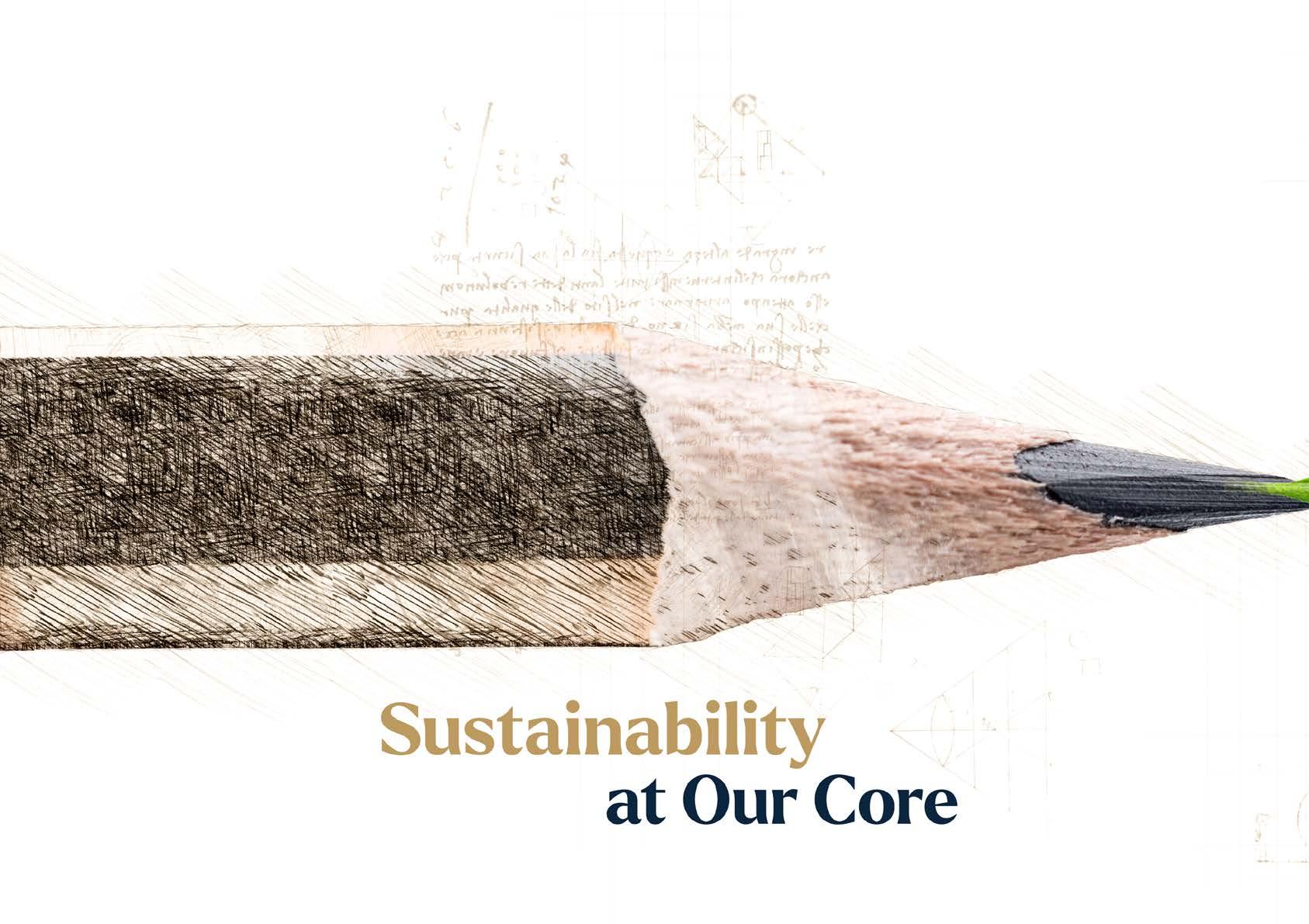

boundaries in every
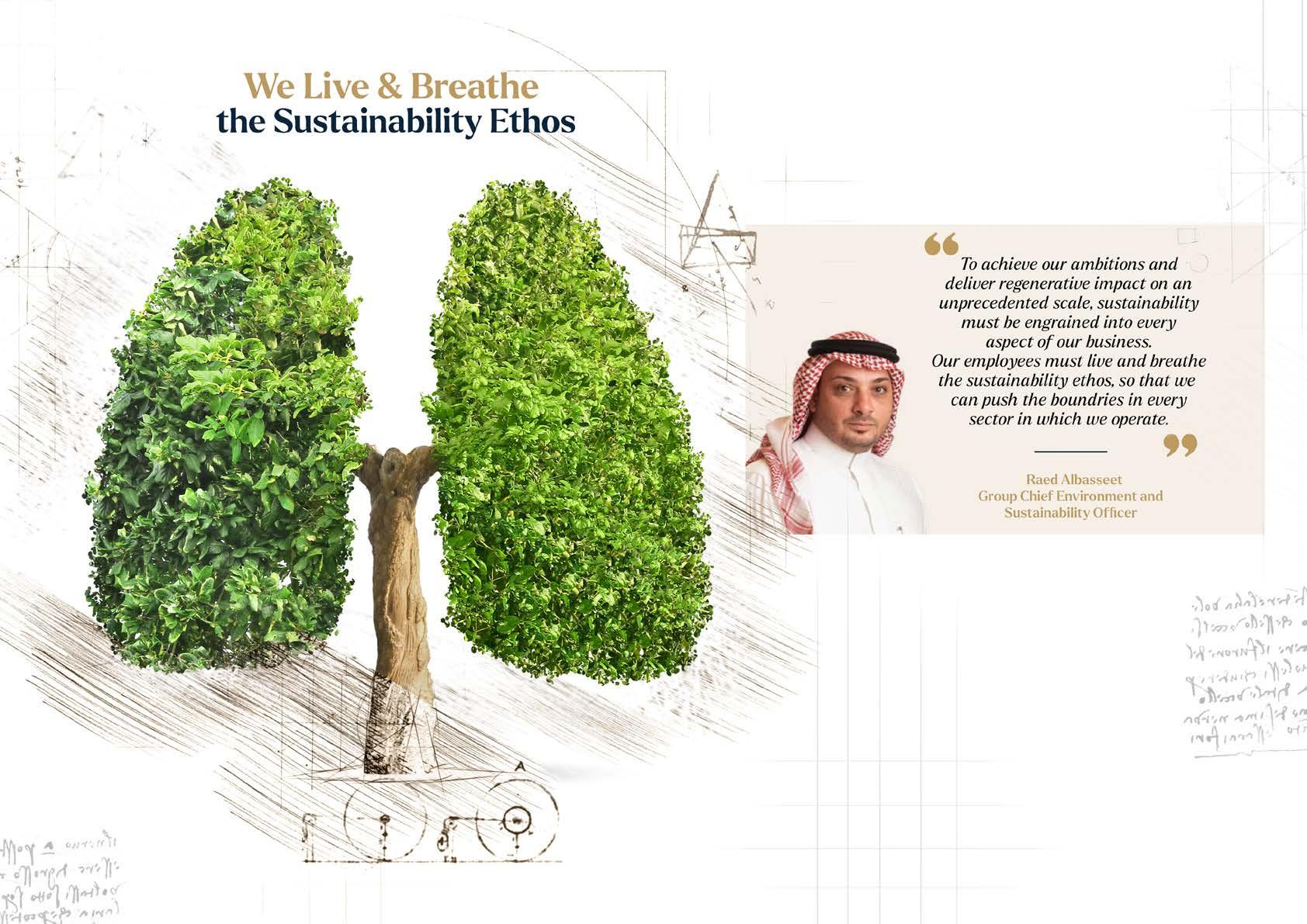
Our Material Topics
Engaging on the highest priority Environmental, Social, and Governance (ESG) issues for our company, system and stakeholders is a key step in how we manage our business. It is also a key component in how we evolve and report on our business and our sustainability performance.
During 2020, we undertook a thorough materiality assessment of our priority issues in collaboration with a cross-functional internal team and key external stakeholders. This analysis helps us to understand our stakeholders’ expectations and global agenda and respond to these in the best possible way.
Having our most significant material issues1 identified, helps us to focus our efforts and report on what matters most to our sustainability performance. Continuing from last year, we have prioritized people and planet through our environmental and social development efforts.
Engagement
• Internal stakeholder workshop for Executive Management
• Internal stakeholder workshop for management
• Key external stakeholder interviews
Analysis
• Analysis of the workshop results to identify the prioritized topics
• Prioritized material topics plotted on a materiality matrix
Validation
• Validation of the list of material topics and materiality matrix with the Group Chief Executive Officer and Group Chief Governance Officer
The results of our materiality assessment are in line with the focus areas of our Sustainability and Enhancement Framework. They form an important foundation for the further development of our sustainable business strategy.

1. More details of our material topics are listed under relevant section.
Our internal stakeholders rated most material topics as critically or highly important based on their understanding of RSG’s aspirations of delivering an exquisite regenerative luxury tourism destination. External stakeholders had more diverse ratings which reflected their different perspectives and interests.
53 RSG Sustainability Report 2021
Our materiality assessment resulted in the following materiality matrix, prioritizing 23 material topics within the environmental, economic and social pillars.
Environmental
Indirect Economic Impacts Anti-competitive Behavior
Communities Environmental Compliance Biodiversity
Customer Health and Safety Customer Privacy Child Labor Employment
Tax Security Practices Public Policy Low Low
IMMATERIAL TOPICS
Human Rights Assessment Forced or Compulsory Labor High High
Significance of Environmental, Social and Economic Impacts
54 RSG Sustainability Report 2021 Influence on Stakeholder Assessments and Decisions
Waste
Emissions
Energy
Procurement Practices Supplier Environmental Assessment Material Water and Effluents Economic Performance Anti-corruption Market Presence
Occupational Health and Safety Labor Management Relations Diversity and Equal Opportunity Training and Education
Non-discrimination Marketing and Labeling Supplier Social Assessment Socio-economic Compliance Local
MATERIAL TOPICS
2 7 1 16 9 22 5 3 4 12 13 18 23 17 14 19 15 20 21 11 10 6 8 Social Economic
RSG Materiality Matrix
55 RSG Sustainability Report 2021 Our topics are aligned with the Sustainable Development Goals (SDGs) Our Material Topics Our Material Topics Relevant UN SDG(s) Relevant UN SDG(s) 9 10 11 12 5 6 7 8 Economic Performance Market Presence Supplier Environmental Assessment Employment Waste Biodiversity Local Communities Indirect Economic Impacts 17 18 19 20 21 22 23 Training and Education Diversity and Equal Opportunity Non-discrimination Customer Health and Safety Customer Privacy Anti-corruption Anti-competitive Behavior 13 14 15 16 Labor Management Relations Human Rights Assessment Forced or Compulsory Labor Occupational Health and Safety 1 2 Environmental Compliance Emissions 4 Water and Effluents 3 Energy
Stakeholder Relations
Engaging in active dialogue with our stakeholders is of great importance to us. Through fruitful and productive dialogue, we consider various perspectives on our involvement with sustainability issues, challenge our thinking, identify and address new trends and share experiences.
Our stakeholders are defined as organizations and individuals who have a certain interest or expectation of our organization, whose decisions influence our organization, or who are influenced by ours.
Our key stakeholders
Shareholders
Employees
Local Municipalities
How we engage with our stakeholders
We Inform
• Corporate website
• Corporate reporting, such as annual report and sustainability report
• Employee portal and internal communications
• Social media and press releases
• Site visits and tours
• Internal awareness material
• Training programs
We consult and involve
• Participation in external congresses and forums
• Dialogue with the local community
• Specialist conferences and discussions
• Consultations with regulators and government entities
• Working groups to consult with stakeholders
Supply Chain
Governmental Entities and Regulators
NGOs and Universities Design and Architecture Firms
Visitors and residents
Participation
• Advisory Board focused on multiple areas including sustainability
• Collaboration with education and research institutions
Operators Financial Institutions
Giga Projects
• Alignment with other Giga projects
• Participation of executives from multiple functions in our Sustainability Management Committee and our Sustainability Taskforce
• Active engagement of local communities in the project areas in different initiatives
• Student events and enrichment activities
Local Communities and businesses
56 RSG Sustainability Report 2021
Listening to our stakeholders’ concerns
Our external stakeholders matter to us. We want to provide them with a platform to reach out in case they have any concerns so we can effectively address them in a timely manner. Therefore, we have developed an external grievance management procedure which articulates how grievances should be received, managed and resolved. Our External Affairs and Government Relations (EA&GR) Department is responsible for our External Grievance Management Procedure. They receive and process grievances from the local community and follow up with the concerned divisions to ensure that these issues are investigated and resolved. They are responsible to maintain our external grievance register and forms which help us in establishing a documented, traceable and auditable process. Given that our Social Development Department continuously engages with the local community, they also receive some of the grievances. They monitor the external grievance management procedure and support the EA&GR Department in finding successful resolutions and avoiding any recurrence of similar issues.
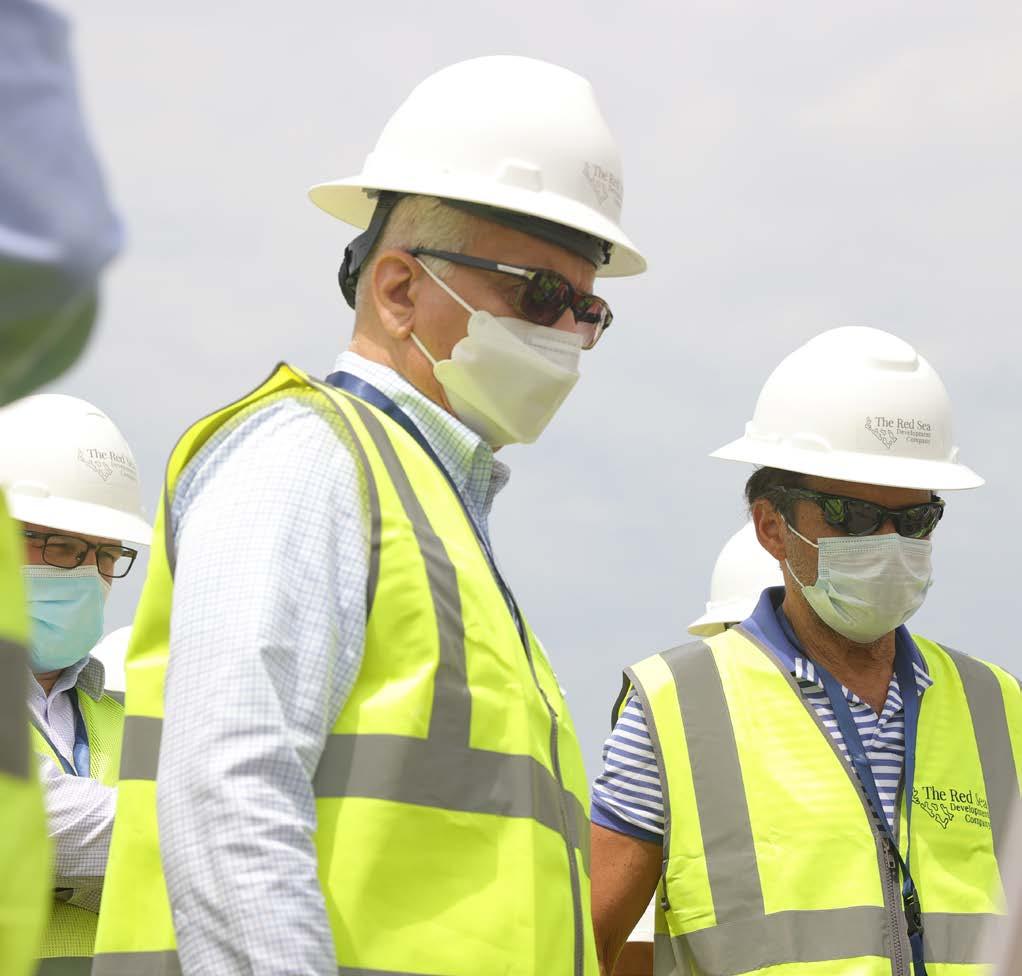
57 RSG Sustainability Report 2021
Creating value to all stakeholders
OUR OBJECTIVES
HOW WE CREATE VALUE
OUR OUTCOMES
Economy
Effectively and responsibly utilize available resources to generate expected return and sustain economic growth of the project and continuity in the long term
Attract investment into the tourism sector of KSA Develop tourism sector & strengthen the Kingdom’s position as a global tourist destination
Environment
Achieve environmental sustainability to safeguard and enhance the environment and our natural resources as well as enhance biodiversity in the area
Maximize growth and profitability Increase contribution to economic diversification Maximize GDP contribution
Ensure project development according to plan
Set new standard in sustainability
Financial Capital
Ensuring RSG’s attractiveness for investments (including green investments)
Human Capital
Ensuring skilled, performance oriented and collaborative team
Manufactured Capital
Creating a Red Sea Zone Authority supported by required infrastructure and technologies
Establish
Society
Empower local communities to improve socioeconomic and cultural conditions
to the green finance sector
Architectural Capital Building unique architectural designs to enhance experiences Natural Capital Protecting the environment and enhancing the ecosystem Social Capital Empowering local people and culture to be celebrated and advanced
Sustainability
Economy Processes Finance Stakeholder
58 RSG Sustainability Report 2021
Gain investor trust Create opportunities for business in KSA Ensure benefits for the community Create network of trusted partnerships Achieve high stakeholder satisfaction Create bespoke, exclusive & memorable visitor journeys
best-practice organizational structure and processes Establish attractive working and living conditions Create net positive impact Create seamless and effortless product & server experience Issue green loan Contribute
Sustainability
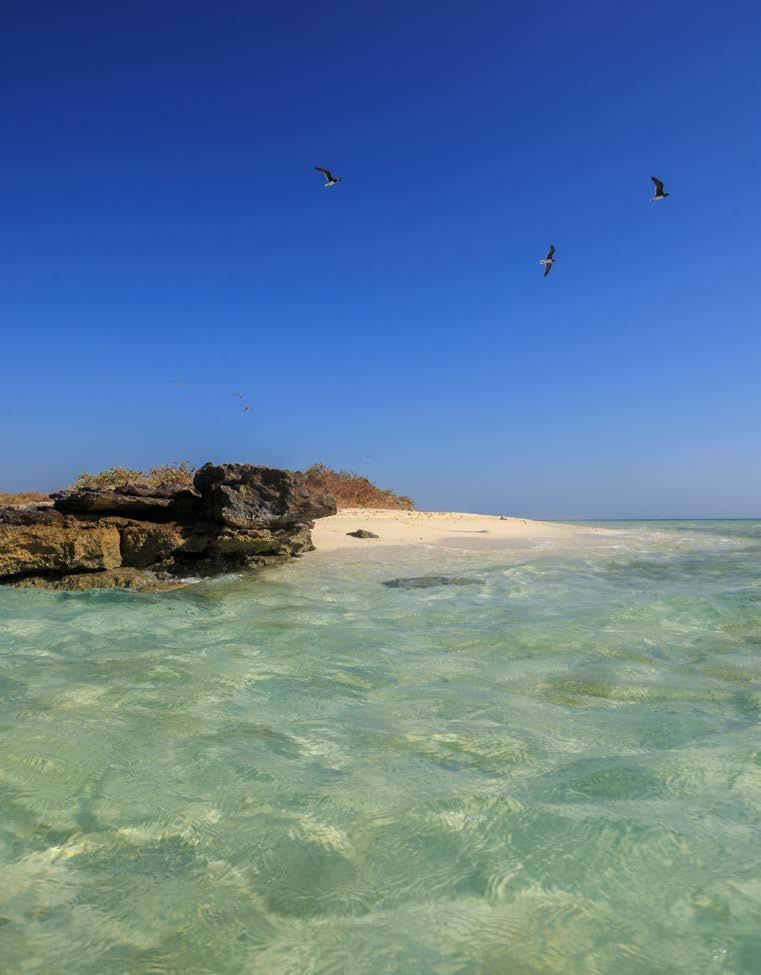
59 RSG Sustainability Report 2021
and Enhancement
Our value creation approach is enabled by our Sustainability and Enhancement Framework which focuses on our objectives towards achieving positive environmental, social and economic impacts through our day-to-day operations. OUR OBJECTIVES LEVERS GENERAL CHALLENGES ENVIRONMENT Achieve environmental sustainability to safeguard and enhance the environment and our natural resources as well as enhance biodiversity in the area. 1. Ecosystem-based management and governance 2. Policies and regulations 3. Permitting and licensing 4. Compliance monitoring and enforcement 5. Rea Sea Partnerships 6. Assessment Monitoring and Research 7. Digital technology innovations 8. Engaged and educated stakeholders • Water • Land • Atmosphere • Biodiversity Building and construction Waste Energy Food Transportation Human interaction Extraordinary events or circumstances PROTECTION AND ENHANCEMENT NATURAL ASSETS SOCIETY Empower local communities to improve socioeconomic and cultural conditions. 1. Management, institutions and governance 2. Policies and regulations 3. Effective grievance mechanisms 4. Rea Sea Partnerships 5. Livelihood management 6. Communication and engagement 7. Cultural preservation and management • Local population • Destination users • Destination employees and families • Suppliers and vendors Unemployment Accessibility and Transportation Population influx Economic displacement Infrastructure readiness DEVELOPMENT AND ENHANCEMENT STAKEHOLDERS ECONOMY Effectively and responsibly utilize available resources to generate expected return and sustain economic growth of the project and continuity in the long-term. 1. Management, institution and governance 2. Policies and regulations 3. Compliance, monitoring and enhancement 4. Government support 5. Rea Sea Partnership 6. Site survey, monitoring and research 7. Unique investment opportunities 8. Employment opportunities • Self-sufficiency • Tourism and local spend • Income per capita • Foreign direct investment • Local content • Circular economy High capital and operating expenditures Limited census, monitoring and modeling Shortage in required skills Quality goods and services Limited local products DEVELOPMENT AND ENHANCEMENT ENHANCEMENT DIMENSIONS
Framework
Managing our sustainability performance
Our sustainability governance model ensures that all decision makers have appropriate authority, competence and resources for the responsibilities given to them. Setting the tone from the top demonstrates commitment across all management levels to drive greater efficiencies and improved outcomes. It also ensures that sustainability is embedded into our everyday decision making for a long-term stewardship.
Our Sustainability Management Committee
Chaired by our Group CEO, our Sustainability Management Committee comprises members from RSG’s Executive Management and has the following mandate:
Oversees our Environmental, Social, and Governance programs, Sustainability and Enhancement Framework, and our sustainable procurement programs.
Effectively and responsibly utilize available resources to generate expected return and sustain economic growth of the project and continuity in the long term.
Plays an integral role in reviewing and recommending sustainability-related objectives, strategic Key Performance Indicators (KPIs) across our group, projects and subsidiaries.
Supports the integration of sustainability practices and decision-making throughout our operations.
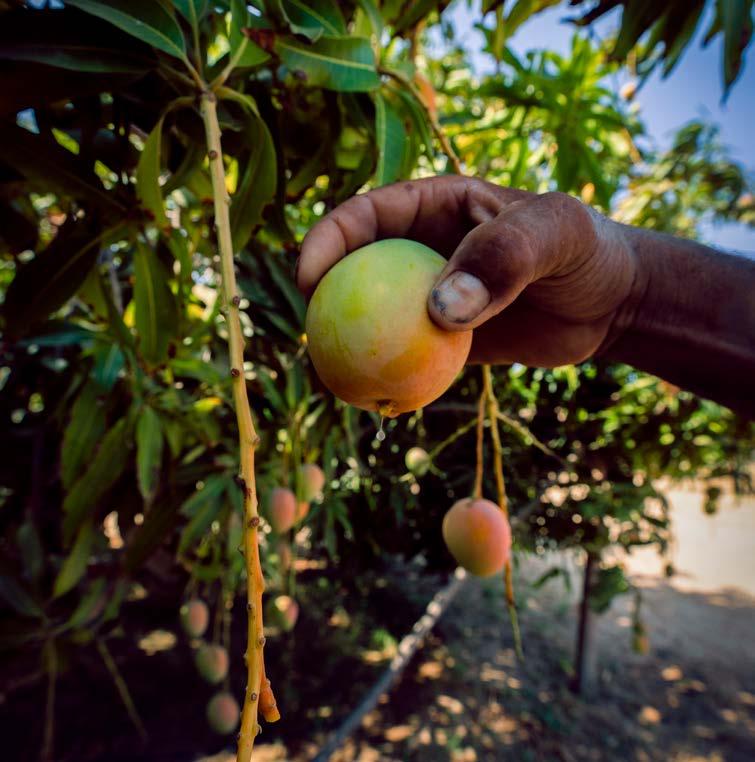
Oversees, reviews, approves and endorses our sustainability policies, objectives, strategies, priorities, initiatives, goals and targets.
Gives authority and enforcement to the concerned divisions on the effective implementation of the sustainability strategy and reviews the completeness of the implementation plans.
Monitors, evaluates and reviews sustainability-related issues, trends and benchmarks that could impact our operations and performance.
Our Sustainability Taskforce
Our Sustainability Taskforce assists our Sustainability Management Committee. It comprises professionals from multiple divisions who support in the collation and reporting of data, information, programs and initiatives related to sustainability.
60 RSG Sustainability Report 2021
Sustainability Management Committee Members

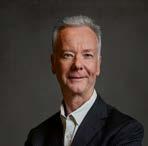
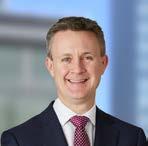


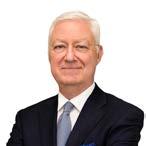
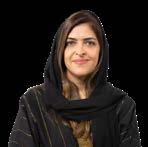
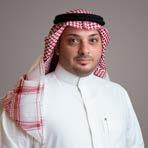
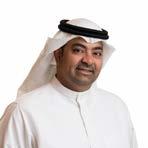
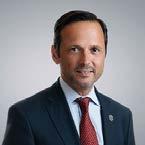
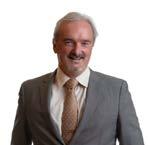
61 RSG Sustainability Report 2021
Ian Williamson Group Chief Projects Delivery Officer
John Pagano Group Chief Executive Officer
Ahmad Ghazi Darwish Group Chief Administrative Officer
Raed Albasseet Group Chief Environment & Sustainability Officer
Dr. Maryam Ali Ficociello Group Chief Governance Officer
Nicholas King Group Chief Development Officer
Dr. Rusty Brainard Red Sea Zone Authority Chief Environmental Officer
Tracy Lanza
Group Head of Marketing & Communication
Tim Williams Head of People Strategy and Culture
Brendan Jack
Red Sea Zone Authority Chief Sustainability Officer
Committed to implement dark sky guidelines
Our Environment and Sustainability Principles
To support the implementation of our environment and sustainability framework, we have developed nine environment and sustainability principles for our stakeholders to adhere to. These principles serve to not only maintain our environmental and social assets, but also protect these for the future. They are applicable to all operators, employees, consultants, and contractors who work in the development of The Red Sea Project. We continuously review our environment and sustainability principles to make sure they are aligned with key organizational changes such as our group structure or our organization’s maturity.
These environment and sustainability principles include:
Water consumption management
This principle works towards our goals of near-zero water discharge and compliance against our masterplan commitments and green certification requirements. It ensures that water conservation and efficiency are practiced across all our assets.
Solid waste management
Our waste hierarchy has been designed to ensure that the least amount of waste is sent to landfill, zero discharge to oceans, and avoidance of hazardous waste generation. Wherever possible we are developing strategies to reduce single-use plastics and to promote circular processes through recycling and reuse.
Energy efficiency
As part of our commitment to net-zero emissions over the lifetime of the Project, we are targeting becoming 100% powered by renewable energy. For all our assets we seek to maximize energy efficiency, prioritize reduction in energy use, and design building systems and processes that require low energy. Additionally, our transportation strategy has been geared to maximize the utilization of land and sea electrical carriers.
Green certification
As part of our efforts to be transparent and align with leading best practices, we are actively pursuing and achieving green certifications to validate and improve our sustainability performance.
Greenhouse Gas emission
We are targeting net-zero emissions for our building assets and company vehicles. In addition to renewable energy, we will also be incorporating low-emission design into our assets and ensuring zero solid waste to landfill during the operation.
Socio-environmental governance
It is imperative that our operations take place in an environment guided by a transparent, ethical, and fair governance structure. Our Environmental, Social and Governance (ESG) taskforce is responsible for achieving our sustainability targets, due diligence on compliance, alignment with international standards and delivery on investments. As part of this principle, we pursue mutually supportive relationships with our stakeholders.
Stakeholder engagement
As a value driven business, this principle ensures that we continue to engage with our internal and external stakeholders. This involves implementation of a stakeholder management plan, communication, and risk management.
Site selection
To ensure that our developments have limited negative impacts, we adhere to the precautionary principle and are committed to offsetting any negative impacts on the environment and promoting well-being and community connectivity.
Sustainable procurement
Our sustainability commitments also extend to our value chain which includes our consultants and contractors. Through the sustainable procurement principle, we can ensure that our assets are developed in line with our ethical requirements and meet the requirements of our green accreditations and sustainability targets.
62 RSG Sustainability Report 2021
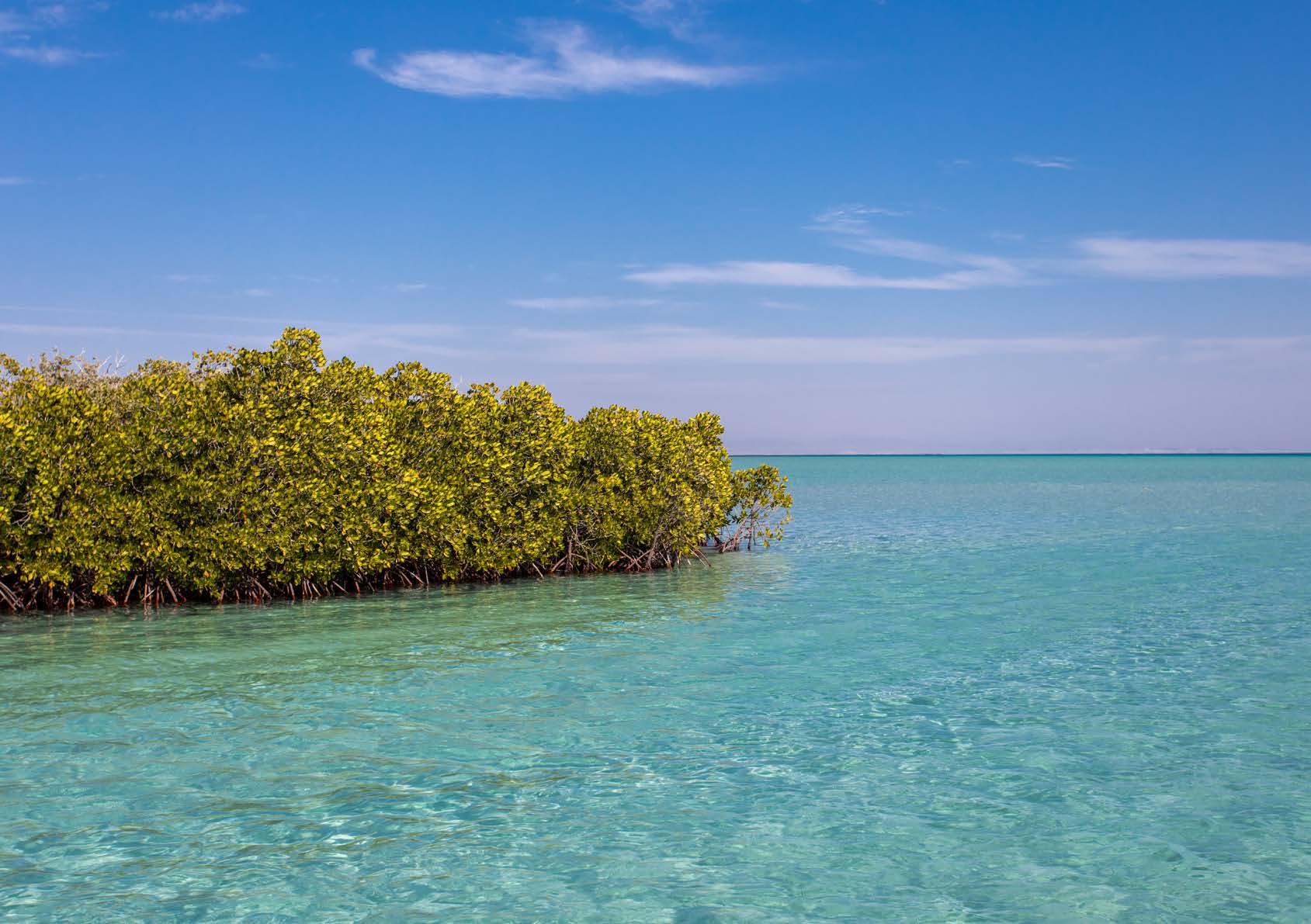
Monitoring and reporting of our Sustainability Performance Management
As we work to fulfill our vision and sustainability commitments, it is critical to continually measure and report on performance, identify improvement opportunities, and set priorities.
Therefore, we developed a structured operating model for our sustainability performance management, which comprises pre-defined processes, targets and KPIs enabled by technology and operated by data contributors from multiple divisions. We started establishing our baseline during 2021. We aim to report on our baseline data in future sustainability reports.
KPIs
• Quantitative metrics to monitor our sustainability performance across economic, environmental and social areas, and address the GRI Standards disclosure requirements.
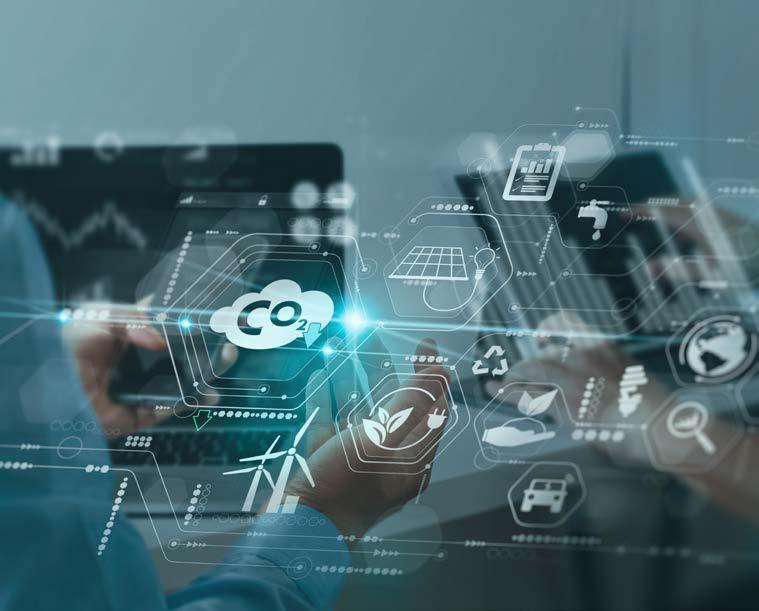
• The KPIs cover the entire lifecycle of the project from construction to operations.
• We are currently working to establish our baseline so we can subsequently track our progress against it.
•
PEOPLE AND ORGANIZATION
A sustainability reporting taskforce
The taskforce coordination is led by the corporate Environment and Sustainability Division.
• Taskforce members from multiple divisions from our headquarters and project site are involved in the process.
Our Sustainability Performance Management
TECHNOLOGY
Our sustainability performance management system, a digital platform accessible to:
• All members of the taskforce to input the sustainability data.
• The taskforce coordinator to monitor and report the data monthly.
PROCESSES
A monthly process involving collection and analysis of data as well as reporting in a periodic sustainability performance management report.
64 RSG Sustainability Report 2021
Our exceptional GRESB results
For
the second consecutive year
In 2021, we undertook our second Global Real Estate Sustainability Benchmark (GRESB) assessment to have an independent view of how our ESG performance compares with peer organizations, and to get actionable insights into key areas of improvement. GRESB provides a credible benchmark aligned with globally recognized reporting standards including GRI Standards, PRI, SASB, DJSI, TCFD recommendations, the Paris Climate Agreement and the United Nations Sustainable Development Goals (UN SDGs).
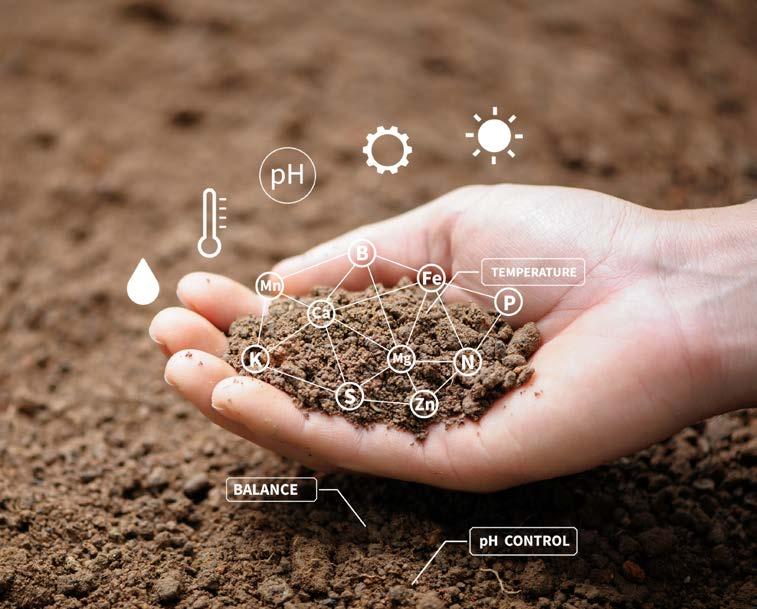
91/100 in our 2021 ESG assessment and benchmark exercise (+7 pts vs 2020)
Green Star for Management and Development components, for the second consecutive year
Five-star rated entity (+1 star vs 2020)
In-depth assessments from credible third-party assessors like GRESB are essential as the destination moves from design and planning through to construction and delivery. These critical evaluations hold us to account at every step and ensure we are meeting our ambitious environmental commitments.
Raed Albasseet Group Chief Environment and Sustainability Officer
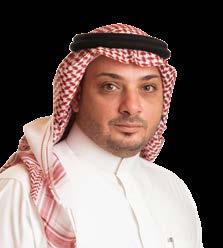
Regional Sector Leader Award in recognition of being one of the highest scoring entity per sector/ region/ nature
Enhanced rating in recognition of our strong environmental governance structure and commitment to environmental protection and regeneration
65 RSG Sustainability Report 2021
How our results compare
2020 2021
GRESB Score 84 91 Star Rating



Other
Green Star

Awarded to entities placed in the fourth quintile, recognized as GRESB 4 Star rated entities.


Awarded to entities placed in the top fifth quintile, recognized as GRESB 5 Star rated entities.
Awarded to Real Estate entities with a score higher than 50% of the points allocated to each relevant component.
Sector Leader
Highest scoring entities per sector/ region/ nature of ownership.
66 RSG Sustainability Report 2021
Awards Green Star Green Star Sector Leader
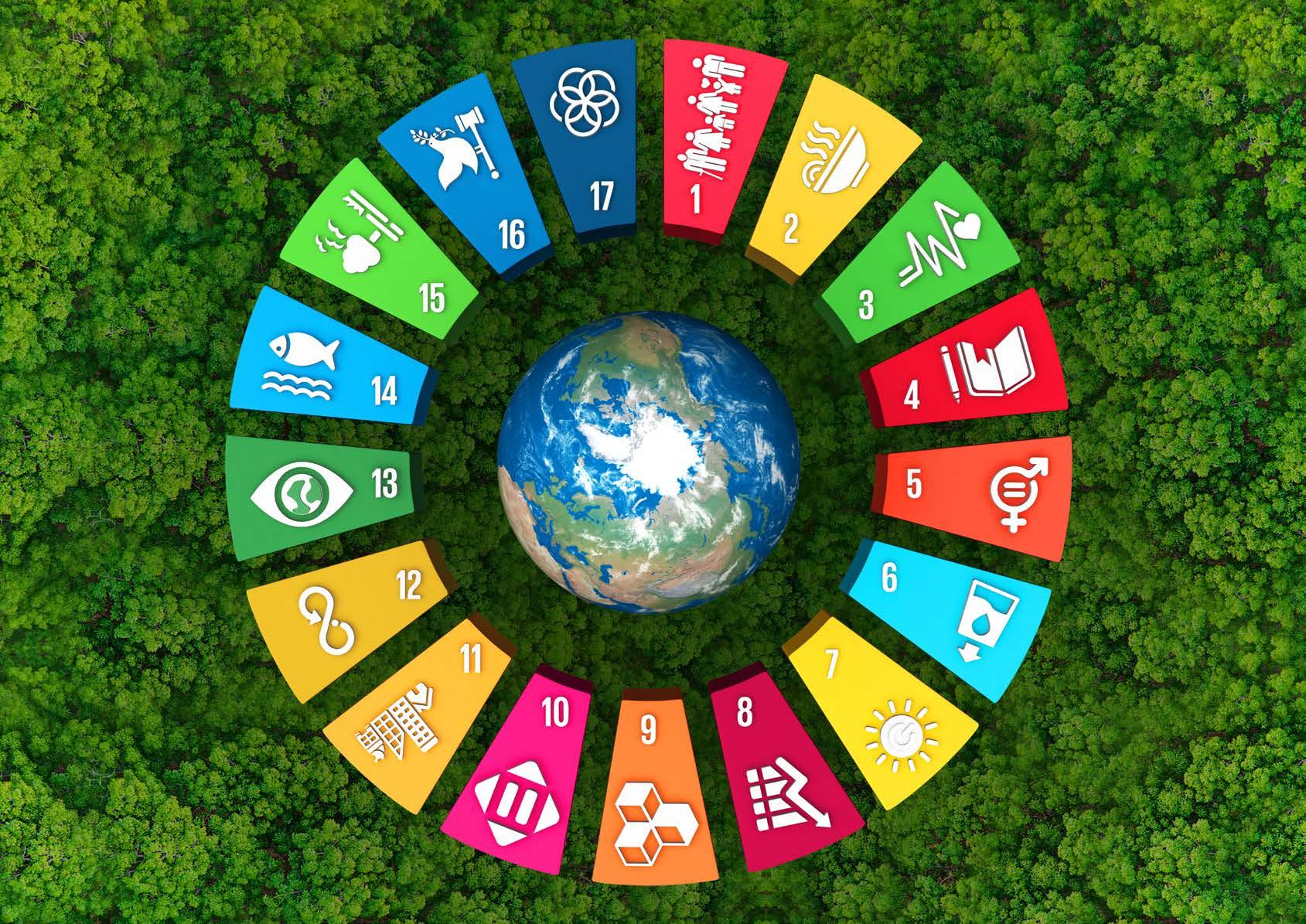
Managing our sustainability-related risks

At RSG, our Risk & Resilience Department envisions to be a fully integrated business partner that enables business resilience and risk-based decision-making. Our Enterprise Risk & Resilience Framework aims to proactively prevent, reduce, respond to and recover from adverse events while enhancing the risk & resilience culture and supporting effective governance.
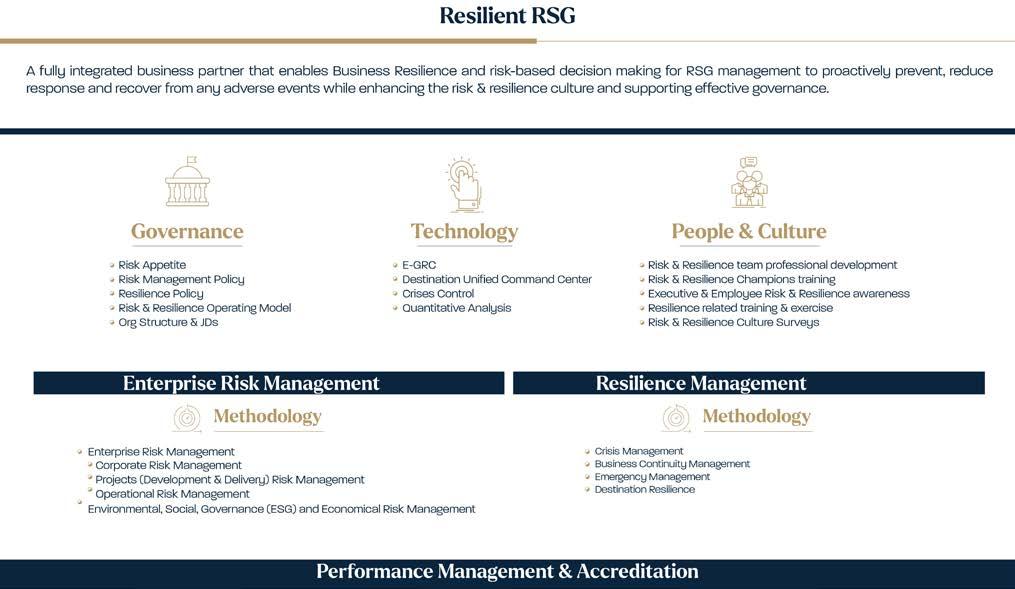
With our organization’s ambition to take sustainability to the next level of regenerative tourism, ESG and economic risk management are at the heart of what we do. Starting from our Board-approved risk appetite, we have identified the risk boundaries for our environmental and social commitments.
As we conduct frequent risk assessments across the various levels of our group, we have a solid understanding of our material sustainability topics. Accordingly, we effectively articulate various mitigation strategies to address relevant threats and ensure effective execution of the identified mitigations.
68 RSG Sustainability Report 2021
Selection of risk categories covered by our ERM framework and their mapping to our material sustainability topics
Risk category covered by our ERM framework Material topic
Cyber, technology and data Customer privacy
Health, safety and security risk Health and safety Environmental sustainability Energy, emissions, biodiversity, water, waste and environmental compliance
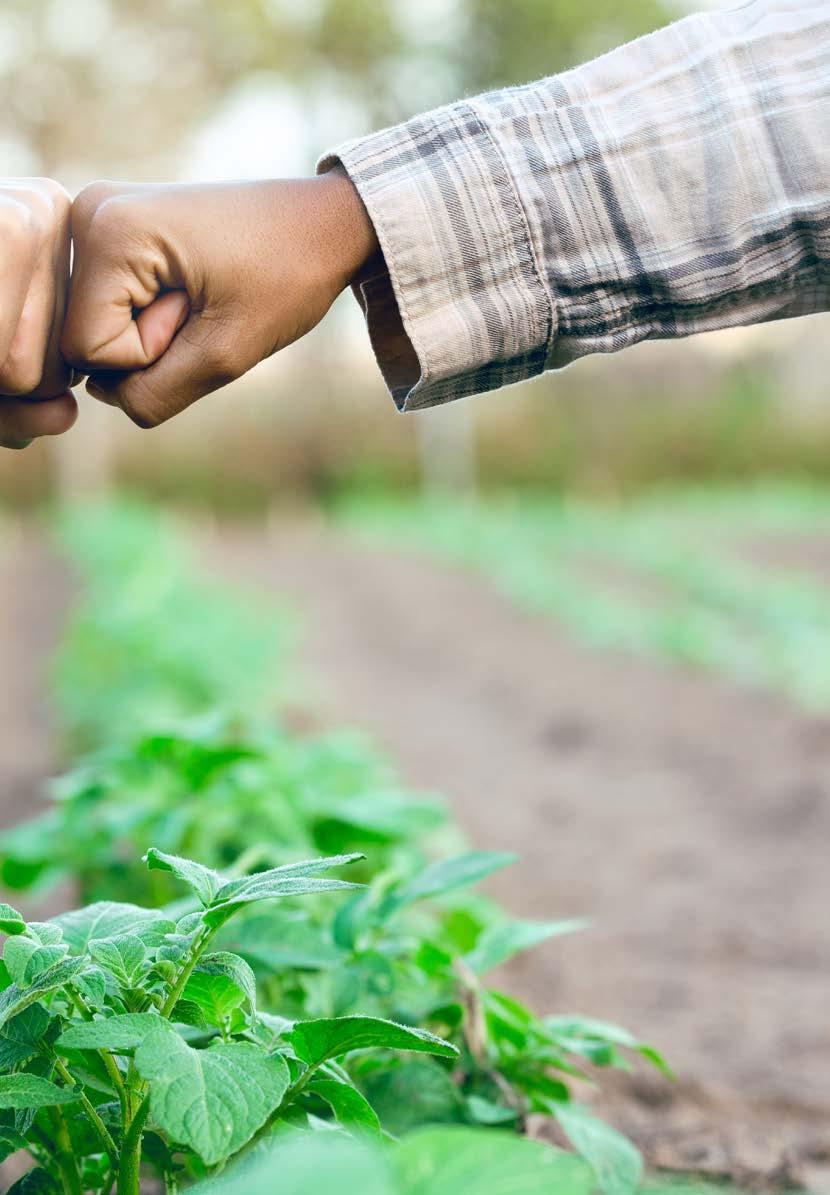
Zero Tolerance
appetite to any health & safety, technology, cyber or data-related risks
We were successfully re-certified for ISO 31000:2018, the highest available standard in risk management. This certification provides assurance that our Enterprise Risk Management (ERM) and Project Risk Management processes are aligned with international leading practices.
69 RSG Sustainability Report 2021
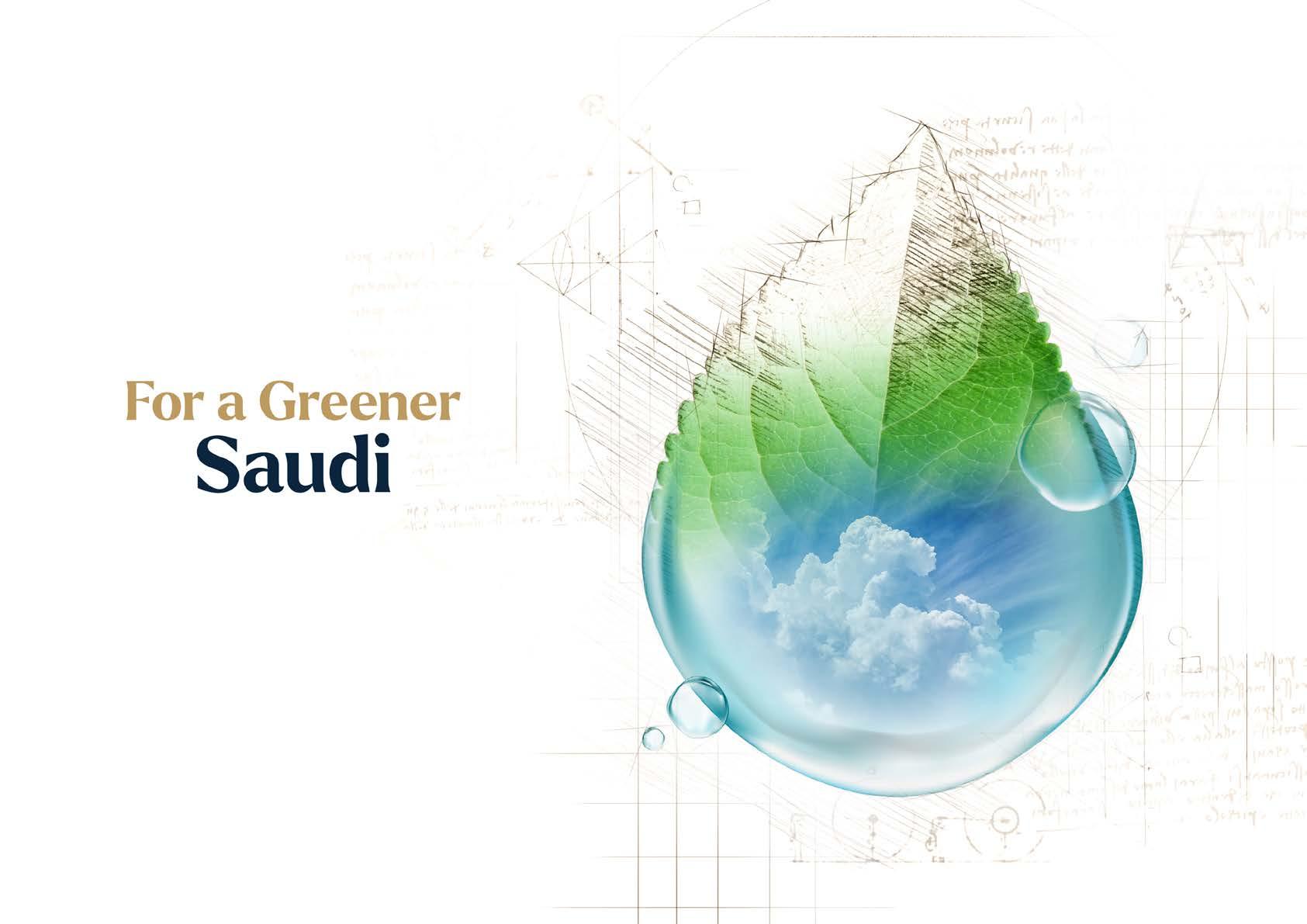
Managing our environmental risks
Leadership responsibilities have been identified and allocated across our group to ensure effective integration of environmental risks in our enterprise risk management framework. As an integral part of our regular risk assessment exercises, we have established environmental risk and compliance registers besides our environmental and social impact assessments that are regularly conducted.
strategy and data security efforts. We conduct quarterly cybersecurity risk assessments to better identify, control, and mitigate all types of cyber risk such as ransomware, data leaks, phishing, malware, insider threats and cyberattacks. At the same time, we are creating a culture of cybersecurity awareness across the organization. We run regular organization-wide campaigns to educate every person that they have a role to play in protecting organization data, and to enable them to proactively identify and report on suspicious emails and links.
Managing our health and safety risks
Health and safety risks are embedded in our enterprise risk management framework and cover both corporate and projects sites. With our Board of Directors, we have articulated our organization’s risk appetite on health and safety and developed Key Risks Indicators that help us monitor our risk exposure and provide us with early signs to prevent and mitigate potential unfavorable events in a timely manner.
Moreover, our health and safety risk assessments are vital to enable us to continuously identify potential hazards for injury or ill-health, evaluate their likelihood given our current safeguards, and accordingly make informed decisions on whether our safeguarding measures need to be strengthened further.
Building a resilient organization
Managing cyber, technology and data risks
We highly leverage information systems and technology to conduct business at corporate, sites and destinations. We are aware this creates vulnerabilities, which we should proactively identify and address to ensure data confidentiality, integrity and availability. In line with our ambition to be a smart destination, our corresponding risk appetite depicts zero-tolerance to any risk arising from cyber penetration, attack, or data leakage. Therefore, we ring fence our data environment with Data Loss Protection (DLP) coupled with cyber risk assessments, which are integral parts of our risk management
Our Business Resilience Framework provides guidance on how incidents, emergencies and crises should be notified, escalated, investigated and managed. The framework covers multiple scenarios that might impact our sustainability ambitions such as hazardous spills, air pollution, water pollution, odor, lighting, noise and vibration, waste management and disposal, biodiversity, archeology and cultural heritage.
We have conducted simulations for scenarios covering multiple areas such as cyber, physical security, crisis communications, and have accordingly defined our response mechanisms.
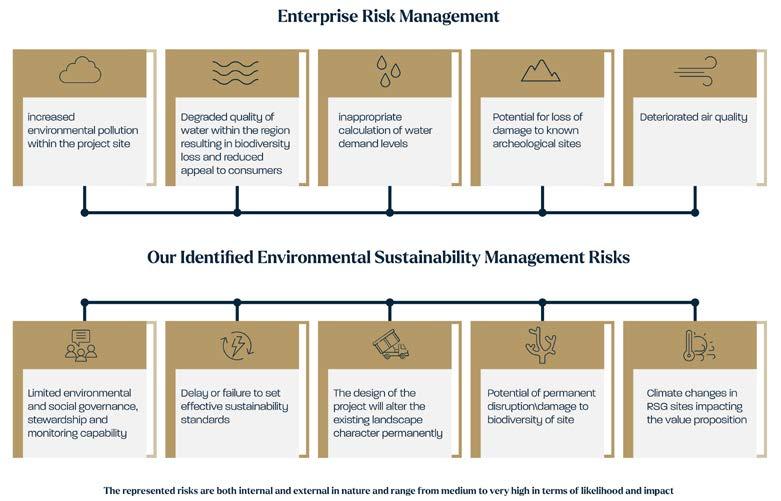
71 RSG Sustainability Report 2021
Learning from the COVID–19 pandemic
The COVID-19 pandemic, which continued to disrupt and unsettle our world in 2021, has put our response and recovery solutions to the test. Overcoming the challenges of the COVID-19 pandemic required coordination and collaboration with multiple stakeholders through our COVID-19 Taskforce, in addition to active engagement and compliance from all employees.
Despite the unpredictability of a post-COVID-19 pandemic world, we were able to continue our most critical activities. We learned a lot from the 2020 outbreak, and we adopted new ways of working which have become our business as usual in 2021:
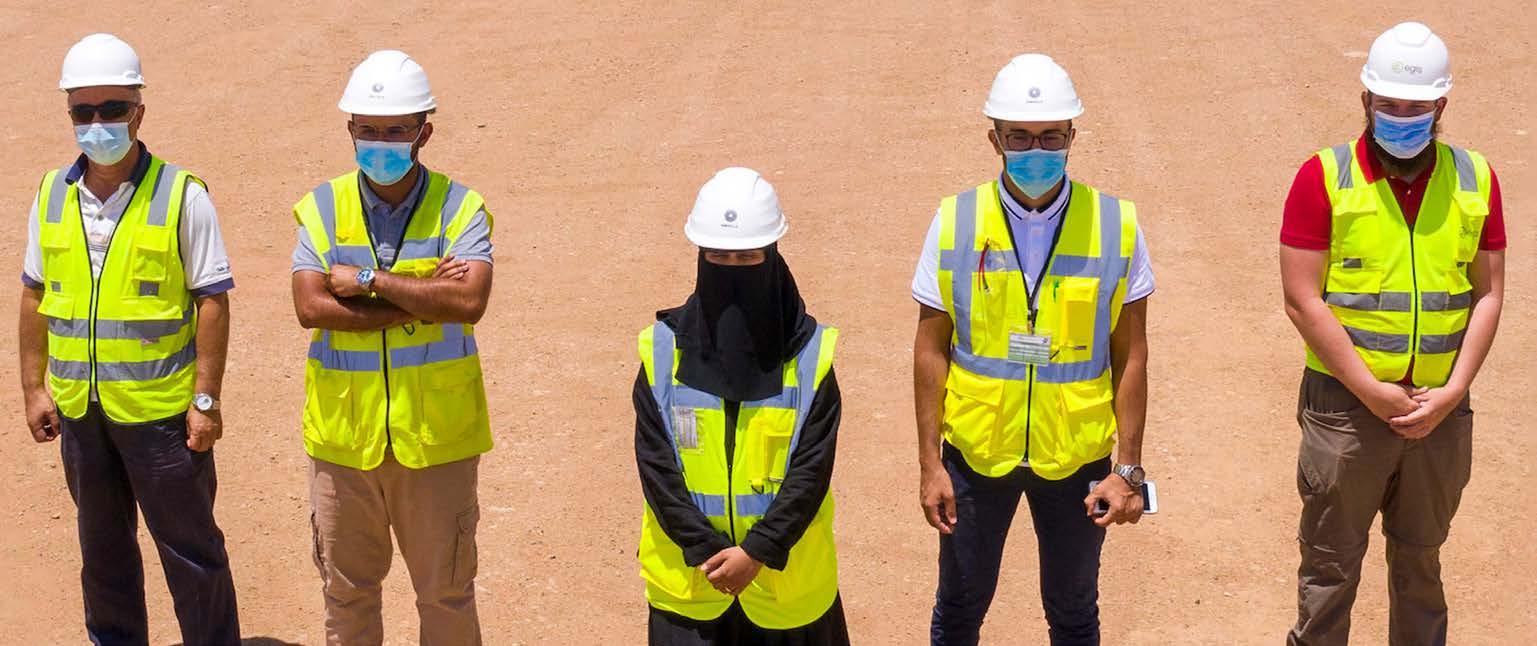
• Our Command-and-Control structure, led by the Business Resilience Management Committee, remains key to our resilience strategy and emergency response plan. The structure aims to provide direction whenever a challenging situation occurs and prepares us for a fast and efficient response in the future.
• We expanded our incident escalation process and we continue to develop a culture of proactive responsiveness which leverages on the work already done for the COVID-19 pandemic. We will continue to embed lessons learned into the post-COVID-19 pandemic world and will focus on elaborating response plans to address incidents, emergencies and crises.
72 RSG Sustainability Report 2021
Data responsibility and customer privacy
Protecting personal data
We believe that every person has a fundamental right to have their personal data protected. Our employees, suppliers, business partners and other external stakeholders have entrusted us with their personal data, and it is our duty to protect it.
Moreover, as we aim for The Red Sea Project to be a smart destination, data security and personal data privacy will be critical to gain the trust of our future customers and their fast adoption of our digital technologies.
Therefore, we are implementing a robust data management and personal data protection program that covers the end-to-end lifecycle of data collection, storing and processing. The program comprises technical controls, standardized policies and procedures for data management, pre-defined mechanisms to report data breaches to local and global regulatory bodies as well as training programs to our employees.
For customer-facing services, we request active consent prior to collecting personal data, and provide transparent information of how data will be stored and processed while at the same time educating our customers on their data rights. We collect and store only the customer data that is necessary to provide a service and then dispose of it in accordance with customer data regulatory requirements.
The well-being of our esteemed guests and our valued employees is our absolute priority. We maintain state-of-the-art security procedures across all our projects, meticulously following national and international standards of information security.
Sultan Moraished, Chief Information Security Officer
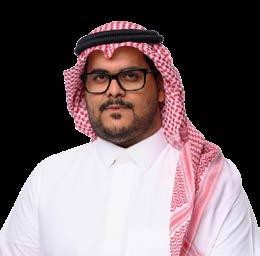
ISO 27001: Certification for Information Security Management System
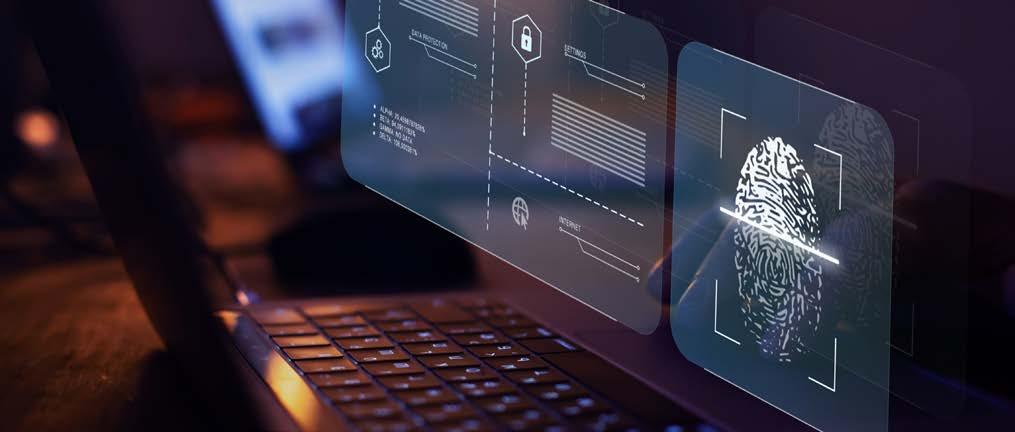
Zero substantiated complaints concerning breaches of privacy and losses of data
We comply with the National Cybersecurity Authority (NCA) Essential Cybersecurity Controls which covers technology implementation, policies and procedures, introducing new workflows and educating senior management and employees about the changes before rolling them out. We also adopted the ISO 27001 standard for Information Security Management System.
73 RSG Sustainability Report 2021
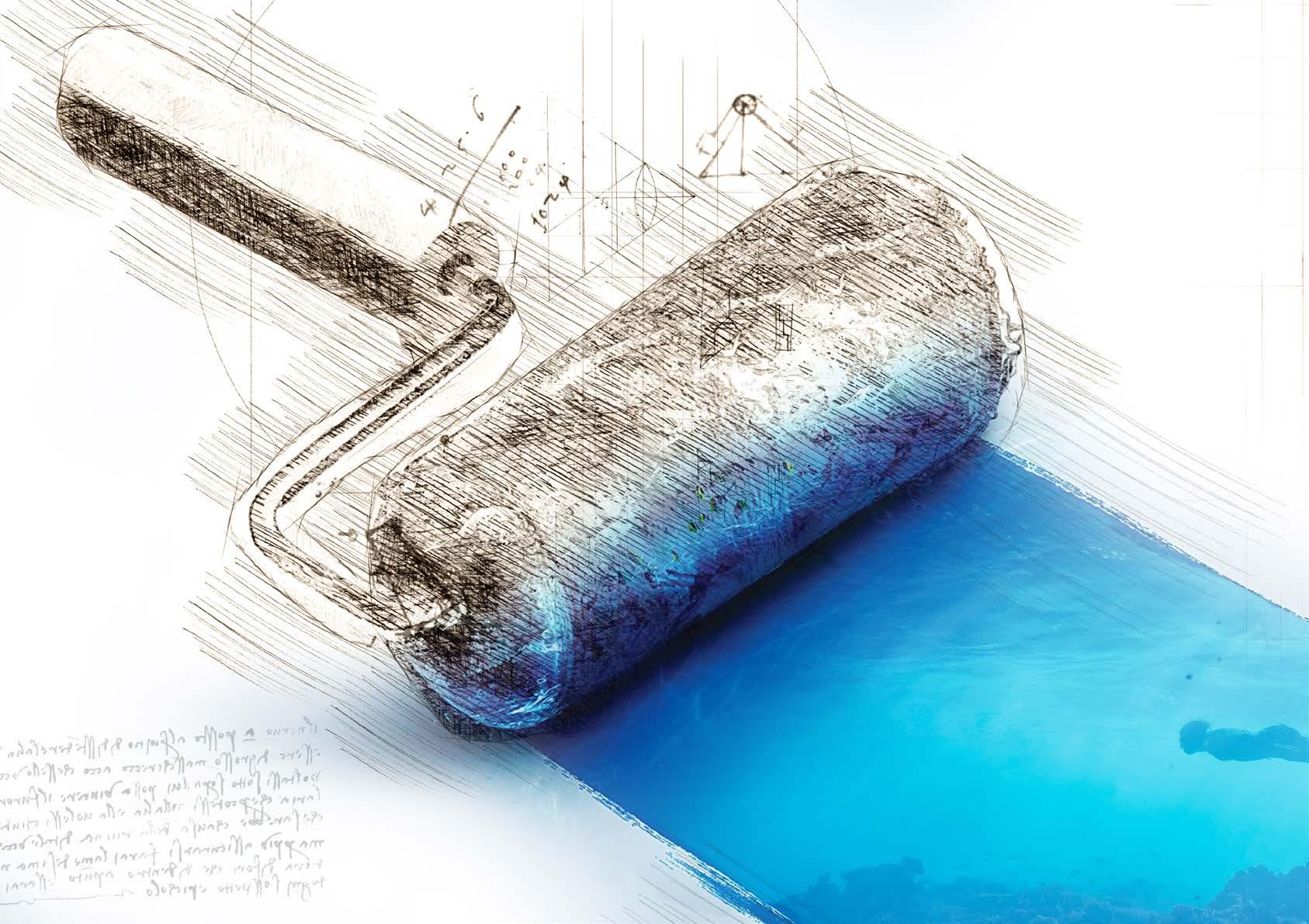
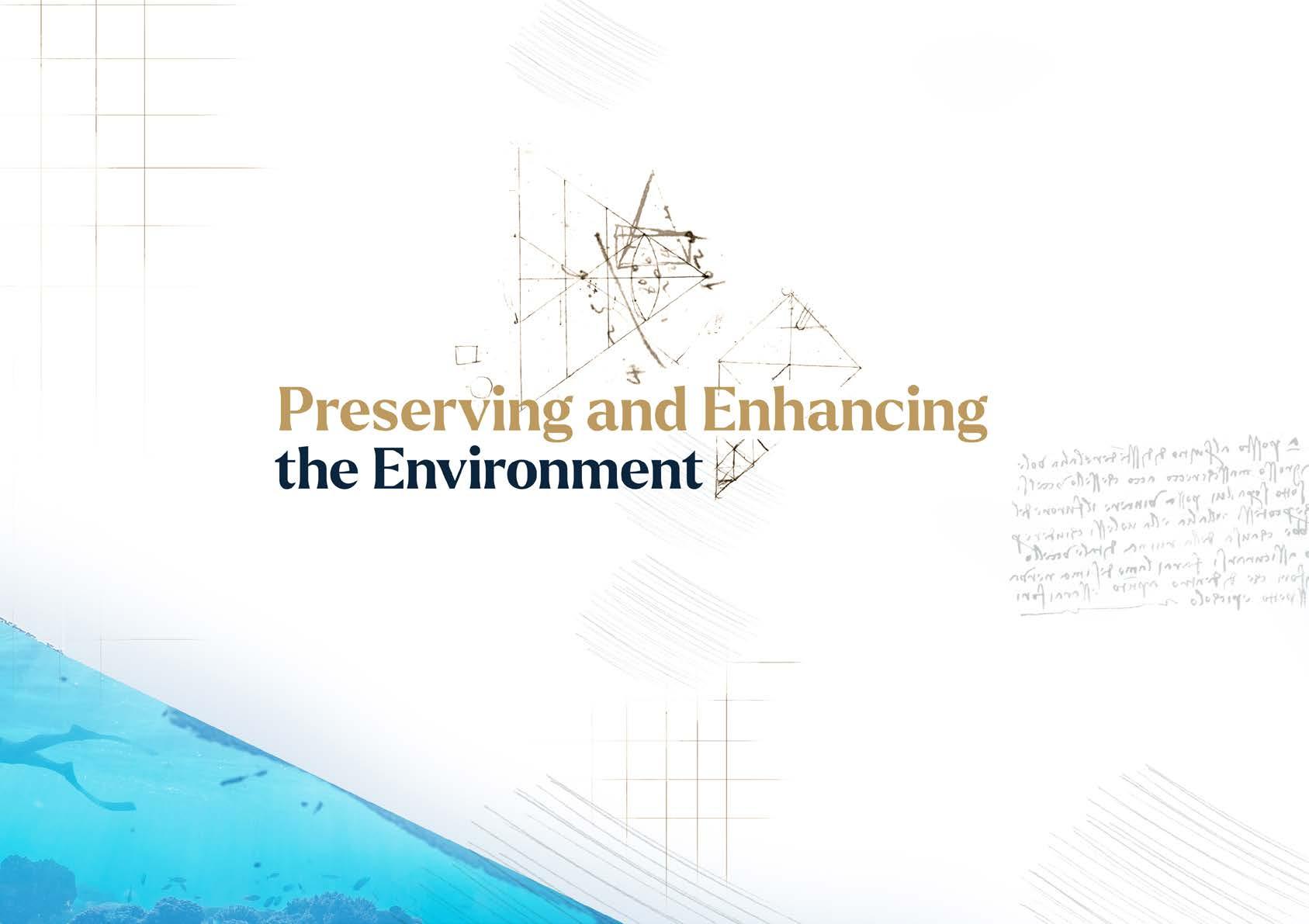
Preserving and enhancing the environment
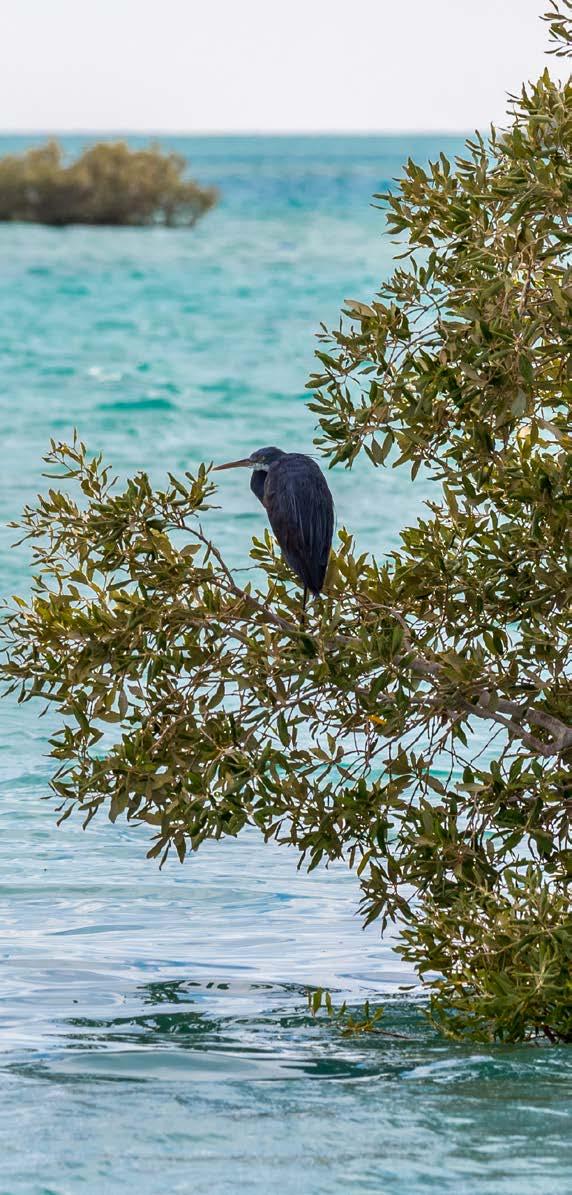
Alignment to Saudi Green Initiative
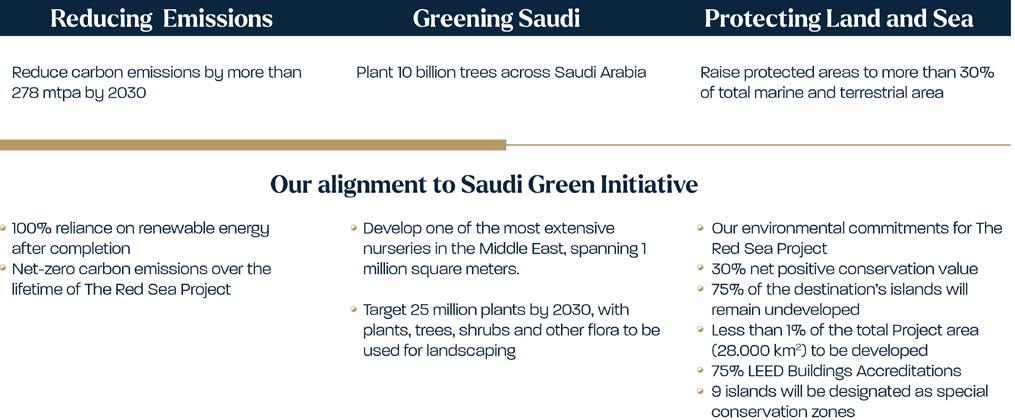
With the launch of the Saudi Green Initiative, the Kingdom has reaffirmed its belief in a sustainable future for all. The first wave of more than 60 initiatives announced under Saudi Green Initiative — and unveiled at the October 2021 Saudi Green Initiative Forum — represent over SAR700b investment to contribute to the growth of the green economy.
Saudi Green Initiative brings together environmental protection, energy transformation and sustainability programs to work towards three overarching targets to achieve a common goal of a green future.
76 RSG Sustainability Report 2021
Safeguarding the environment
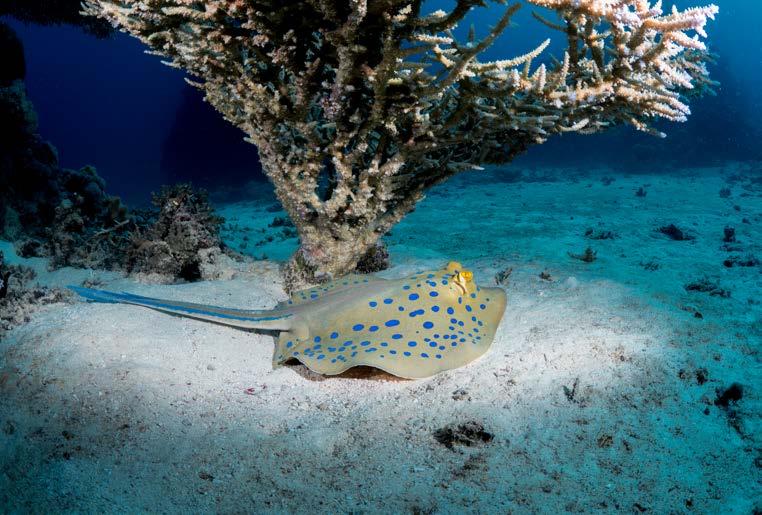
Our green certification principle
As part of our ambitions to establish a regenerative destination, we are implementing international best practices across all our organization. We pursue globally renowned standards and certifications in environmental sustainability to help us gain an independent perspective on our performance.
• First development in Middle East to secure first stage platinum certification under LEED for cities
• Blue Flag compliance for beaches and marinas
• GRESB environmental score 49/51
Our Environmental Management System (EMS)
We have a comprehensive Environmental Management System (EMS), which has achieved certification to ISO 14001:2015. Our dedicated Environmental teams manage the EMS, which covers all aspects of our environmental performance, including construction, operations and corporate offices. Our EMS includes procedures to ensure we comply with all relevant environmental legislation and our Environmental and Sustainability Policy & Principles are adhered to across all construction projects and areas we operate.
We regularly monitor our environmental performance against pre-defined objectives and conduct internal audits over all aspects of our EMS to have an independent review of the effectiveness, suitability and areas of improvement.
Sustainability Performance Management System (SPMS)
In line with GRI Standards, we developed and implemented our Sustainability Performance Management System (SPMS). Since June 2021, our SPMS team has been engaging with Taskforce members to collect and analyze performance data on a monthly basis. Taskforce members and senior management can access dashboards to see how well we are performing. This data is being used to establish baselines across our key metrics, which we will be using for target setting and continual improvement going forward. Our six months of 2021 data is not complete for several key assets, as they became operational only during Q3 and Q4. Accordingly, since it does not cover our entire reporting period and excludes some key assets, we are not including herein. However, we are continuing to extend our SPMS and will be reporting on our baseline data in future sustainability reports.
Our ISO 14001:2015 – EMS certification
The Red Sea Project was the first Giga project in the KSA to achieve ISO 14001:2015 Certification, a testimony of the effectiveness of our EMS.
77 RSG Sustainability Report 2021
Preventing and mitigating our environmental impact
We apply Multi-Criteria Decision Analysis (MCDA) to screen multiple sites to avoid, reduce, and minimize environmental and social risks. The approach enables the decision-makers to rank or screen several sites expediently and efficiently. Sites are characterized with respect to the following four Environmental and Social (E&S) categories for the purpose of comparative screening:
• Physical
• Biological
• Human Use
• Social/ Socioeconomic
Through effective use of high-resolution satellite imagery and remote sensing techniques, marine and terrestrial habitat maps are developed to identify environmental and social sensitivities. These maps allow us to:
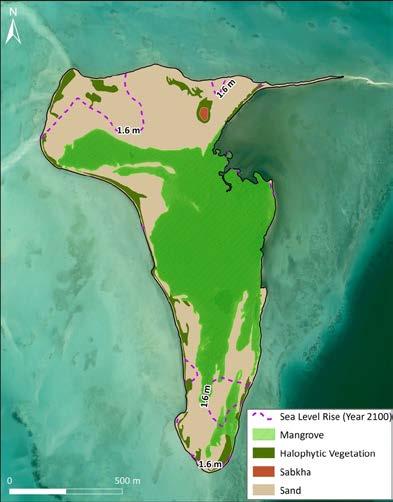
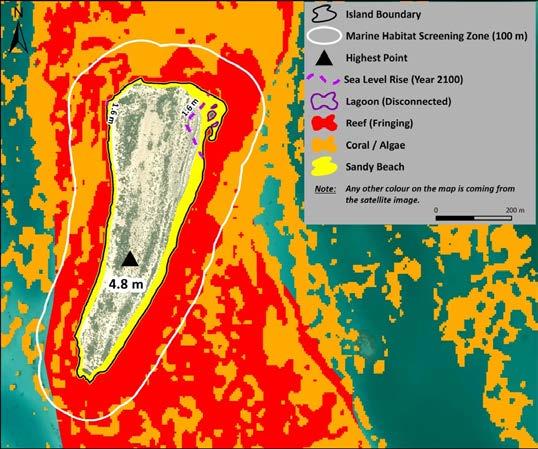
• Avoid critical habitats
• Maintain safe distance from breeding and nesting sites
• Locate development footprint:
• Outside the core zones of nationally and internationally designated Protected Areas
• Without adversely impacting local metocean and hydrodynamic conditions
• Outside areas of inundation from sea level rise due to Climate Change
• Provide required offsets to protect archeological and cultural heritage resources
• Respect and maintain safe distance from human settlements
We have articulated a mobility strategy which puts both people and the environment at the center.
Our transport system follows the precautionary principle through habitat corridors that prioritize biodiversity while enabling connectivity and accessibility for people.
78 RSG Sustainability Report 2021
Ensuring regeneration: our integrated environmental planning framework
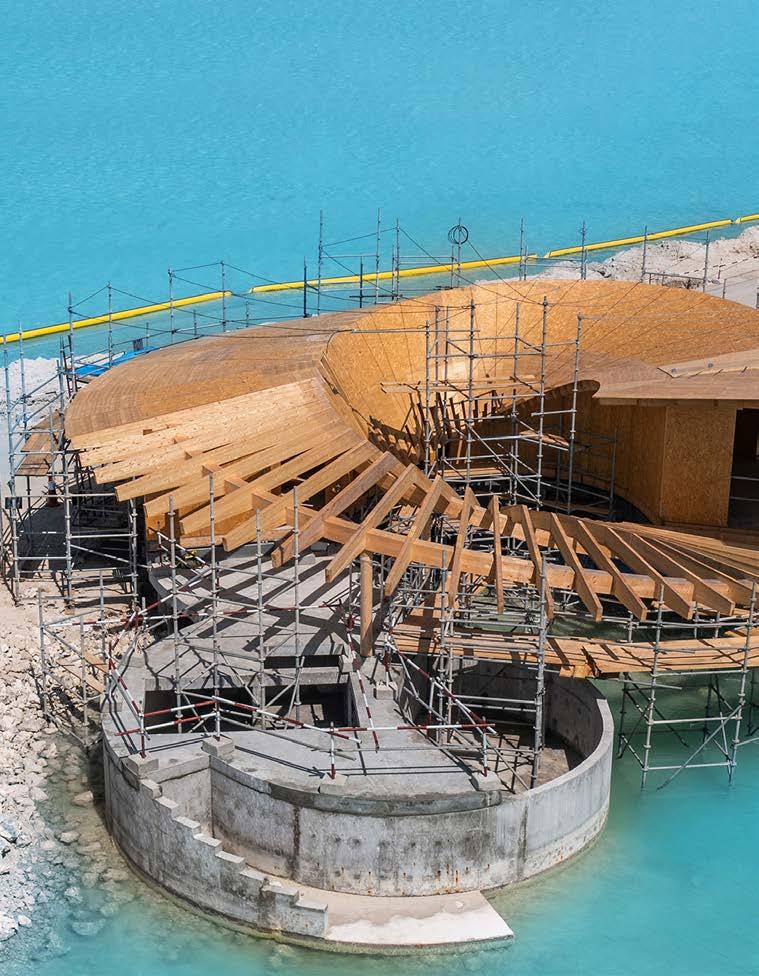
We are committed to understand and reduce our impact on the environment across multiple areas including energy, water, waste, biodiversity, local communities and archeological sites. We follow a four-stage process of baseline data collection, assessments, and reviews to make informed decisions about where and how we focus our developments and manage our operations.
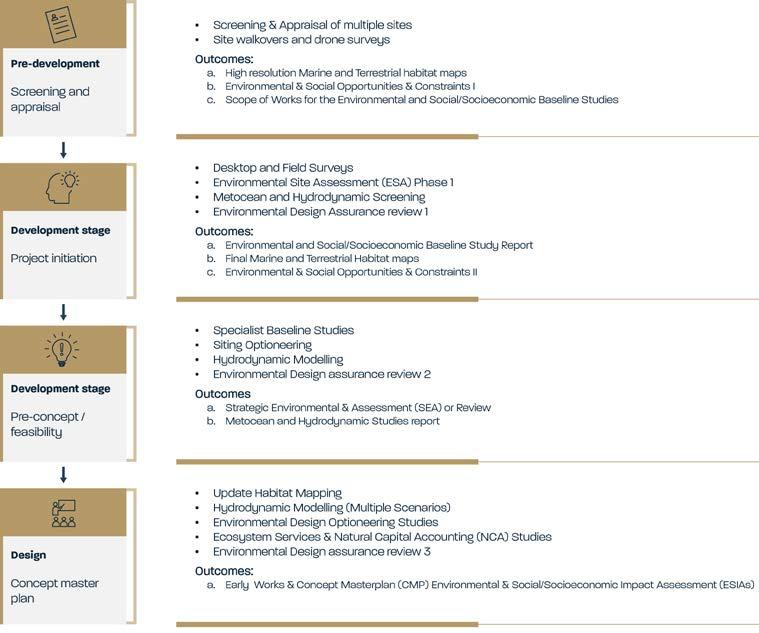
79 RSG Sustainability Report 2021
Spotlight on Value Driven Approach (VDA) and Ecosystem
Services
Our VDA is a bespoke environmental stewardship framework to support identification and realization of opportunities that enhance environmental values and benefits (ecosystem services) provided by the marine, coastal and terrestrial ecosystems within the area of influence. The VDA is aligned to our Environment and Sustainability Policy and Principles and Environmental Sustainability Design Guidelines. It is implemented through the Environmental & Social Impact Assessment (ESIA) process and embedded within our Project Delivery Framework.
The VDA approach provides the impetus to achieve the overall goal of 30% increase in net conservation value over a 20-year period. We aim to go beyond the mitigation of environmental and social impacts by actively seeking and realizing opportunities to enhance the services and benefits provided by ecosystems through project activities and to raise the bar of environmental sustainability within the tourism sector.
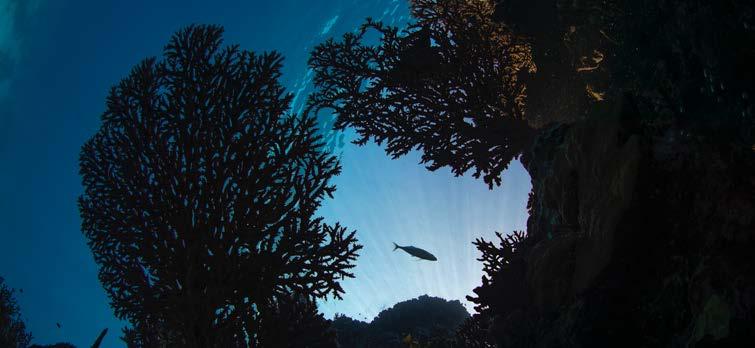
The VDA analyzes the impacts and dependencies of the project on ecosystem services and identifies potential areas of improvement to mitigate risks to the project and to the ongoing delivery of the benefits provided by ecosystem services. It also identifies where there may be opportunities to enhance the delivery of ecosystem services through project activities and, ultimately, to support us in achieving our increase in net conservation value goal.
Our supplier environmental screening and assessment
Our sustainable procurement principle articulates our mechanisms to ensure that sustainability criteria, including environmental criteria, are considered in the procurement decisions for the delivery of The Red Sea Project. We implement this principle by:
• Integrating specific sustainability criteria into the specification requirements for all our tenders, and applying those requirements when screening and selecting suppliers, as part of the contractual arrangements.
• For design and construction-related works, project-specific environmental and sustainability requirements are identified based on the results of our ESIA mitigation plan. They are then summarized within the requirements for the delivery of the projects, with clear targets and management procedures to be followed. Our suppliers are screened and selected based on their ability to comply with the requirements.
Regular environmental audits are conducted on the construction sites to assess our suppliers’ compliance with the pre-set sustainability criteria. These audits enable us to identify and agree on Environmental Performance Improvement Plans with suppliers.
Collaborations and partnerships
We are pursuing advancements in technology and strategic partnerships to build on research and implementation of science and impact driven programs covering multiple environmental areas.
80 RSG Sustainability Report 2021
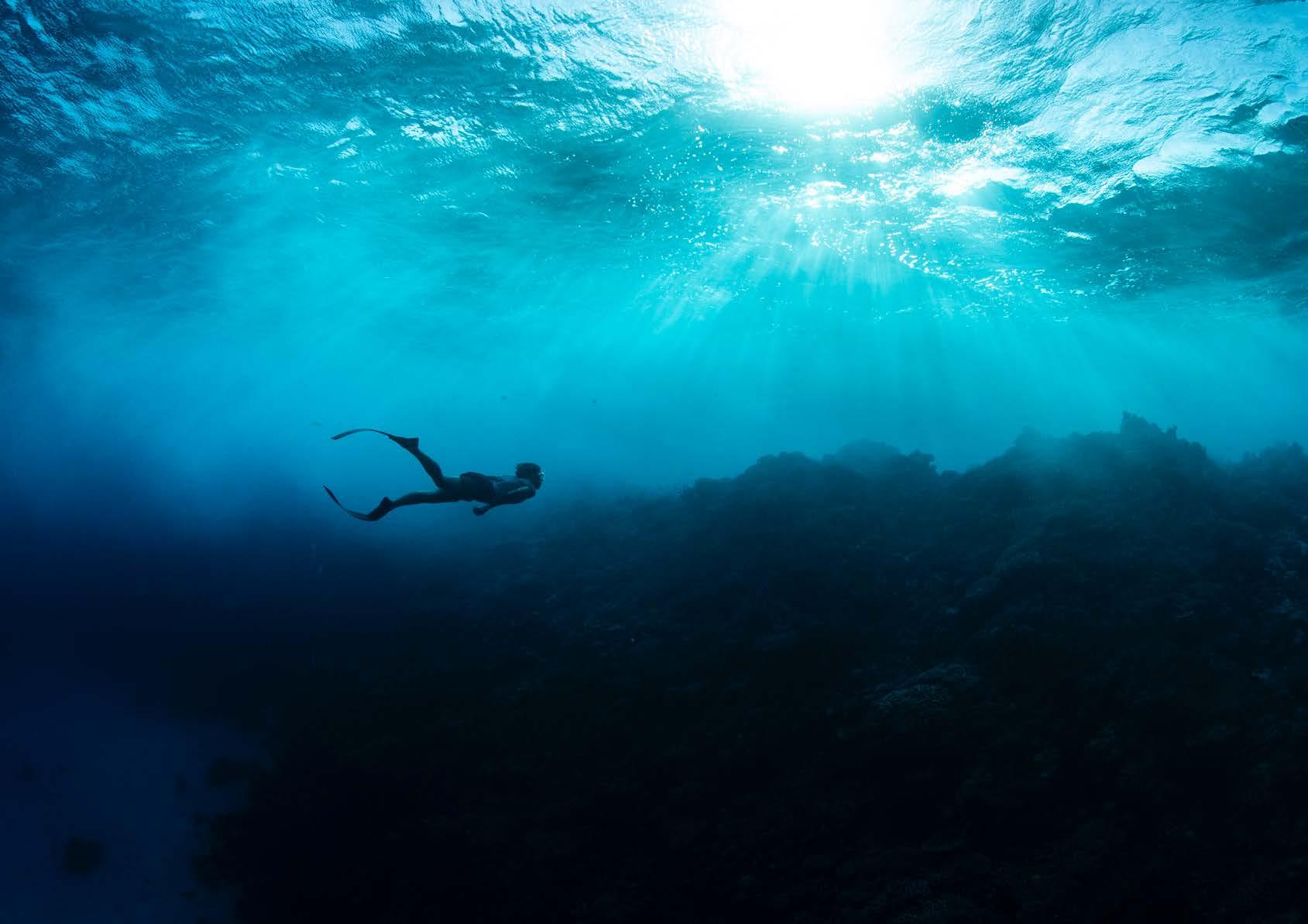
Energy and Emissions
Our ambitions
• Contributing to KSA’s net-zero ambition for 2060
• Net-zero carbon emissions from assets over the lifetime of The Red Sea Project
• Largest tourism destination 100% powered by renewable energy
As the Kingdom aims to accelerate energy transition and reach net-zero by 2060, we have made ambitious plans to have net-zero carbon emissions over the lifetime of The Red Sea Project. Achieving this objective will help us contribute to climate change mitigation, energy security and investment competitiveness while supporting the resilience of our ecosystems and avoiding health impacts of greenhouse gases. Our Energy Efficiency and Greenhouse Gas Emissions Principles articulate our aspirational roadmap to achieving net-zero emissions.
Key highlights from our aspirational principles
Energy Efficiency Principle
• Reduce, reuse, recycle energy by designing to maximize energy efficiency
• Design a green mobility strategy that maximizes our roll-out of clean transportation, using electric, hybrid and hydrogen vehicles
• Renewable power generation, on land and sea, as much as possible
Greenhouse Gas Emissions Principle
• Transition to Electric Vehicles powered by renewables, as much as possible, while switching to biofuels and low-carbon fuels for the remainder
• Use of insulation materials with low global warming potential and refrigerants with minimal ozone depletion potential
• Operating on a 100% renewable power supply, incorporating solar photovoltaics and battery energy storage systems
Striving to become carbon neutral
We are working towards our ambition to become carbon neutral through multiple initiatives:
Embodied carbon
• Procuring green concrete mixes with low embodied carbon.
• Opting for off-site construction to the extent possible.
• Adopting world-class construction logistics.
Construction stage carbon
• Securing LEED for Cities pre-certification on master plans.
• Staying on track to meet 75% LEED accreditations, with Mostadam meeting the remainder not applicable to LEED.
• Prioritizing recycled steel.
• Screening and selecting suppliers based on their ability to comply with environmental requirements.
• Encouraging procurement of materials with Environmental Product Declarations.
Operational carbon
• Designing energy-efficient assets, including high standards for passive designs and building envelopes.
• Aiming to rely 100% on renewables for power supply across all infrastructure and buildings.
• Aiming to offset carbon within our boundaries via nature-based solutions.
• Aiming to promote walkability and cyclability.
82 RSG Sustainability Report 2021
Aligning with Leadership in Energy and Environmental Design (LEED)
By aligning with LEED certification requirements, we are:
• Designing energy-efficient assets.
• Investing in on-site renewables.
• Expecting projects commissioned by third parties to confirm energy efficiency measures and their effectiveness.
• Designing cooling equipment that uses Hydrochlorofluorocarbon (HFC) blends for refrigerants, with zero use of Chlorofluorocarbon-based (CFC) refrigerants, and aiming to replace HFCs when technically feasible.
• Using insulation materials with low global warming potential.
• Monitoring our performance through energy management systems.
Like any organization that is trying to push the boundaries of what is possible, we are facing challenges in implementation. We are working with our stakeholders to overcome them and bring creative solutions to the KSA. Many of our solutions involve innovative models of partnerships such as Public-Private Partnerships (PPP).
Our PPP for sustainable power generation: a ground-breaking milestone

In 2021, we awarded our highest value contract to date to a consortium led by ACWA Power to design, build, operate and transfer our utilities infrastructure. This PPP agreement includes the provision of renewable energy, district cooling, solid waste management, wastewater treatment and potable water.
Particularly for renewable energy, the contract marks a significant step forward for our Project, establishing it as the region’s first and the world’s largest tourism destination powered solely by renewable energy.
83 RSG Sustainability Report 2021
1200 CO2
Monitoring air quality
We plan to track ambient air quality daily across the project’s site with focus on locations with high impact as per our Environmental and Social Impact Assessment report. These locations will be equipped with apparatus for accurate and reliable monitoring which are approved by the KSA National Center for Environmental Compliance (NCEC). Monitored pollutants will include particulate matters (PM2.5, PM10), SOx, NOx and CO, and actions will be taken to ensure levels remain within the guidelines set by NCEC.
Monitoring, measuring and managing our performance
We monitor our energy consumption and emissions on a monthly basis through our SPMS which hosts sustainability data from our corporate office in our headquarters in Riyadh, as well as our operations and constructions on The Red Sea Project’s site. We also use an EMS that covers environmental compliance and mitigation measures on The Red Sea Project’s site. Our Sustainability Management Committee evaluates the performance of our energy and emissions initiatives, such as our energy consumption patterns and our reduction and transition initiatives.
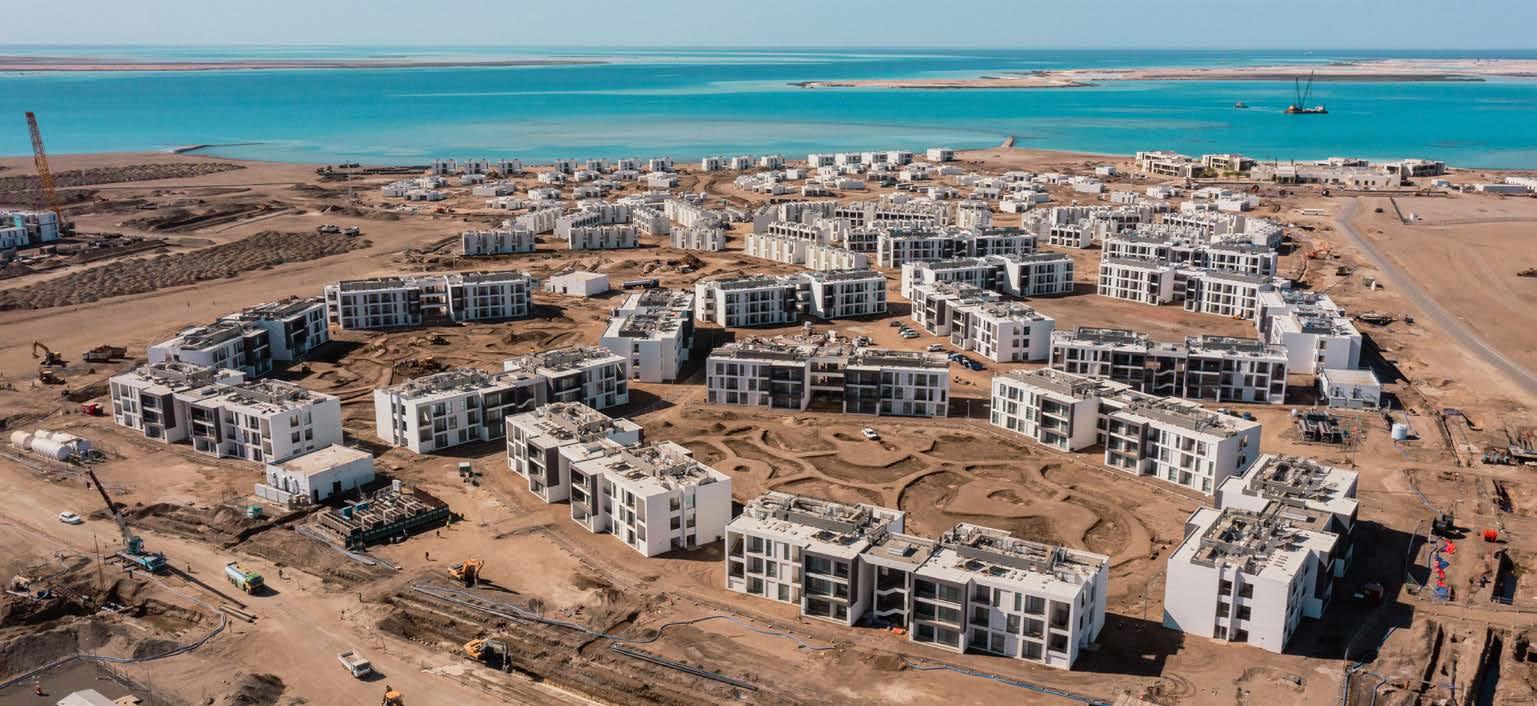
84 RSG Sustainability Report 2021
Water and Effluents
Our water consumption management principle
• Maximize water use efficiency: optimize systems and processes to conserve water through effective demand management.
• Implement an integrative design to examine the life cycle impacts in water extraction, processing and discharge.
We are committed towards the responsible management of water resources and reduction of our environmental impact. This includes optimizing water efficiency in our operations, thus minimizing consumption and wastewater across our projects through sophisticated water treatment processes that ensure limited discharge into the natural environment. We monitor the water consumption of our contractors and third parties on site, to flag excessive use and promote conservation.
How we source, use, treat and discharge water
We collect water from Sea Water Reverse Osmosis (SWRO) Plants from the city of Umluj for water use on site. This practice will continue until our own Reverse Osmosis (RO) plants at site become operational. Water is stored in tanks on site and only used as required with zero discharge to any water bodies.
We issued instructions to contractors to only use water sourced from Saudi Arabia’s Saline Water Conversion Corporation (SWCC), where we signed a contractual agreement with SWCC for the provision of up to 5,000 m3/day. Through our temporary RO which will be operational in the near future, we will supply water from RSG as well. In 2021, groundwater was used temporarily for the engineered backfill during the airport runway construction. As the water abstracted was applied to the backfilled soils to enable compaction, there was in effect no impact on groundwater.
To meet our ambition towards near-zero water discharge, wastewater is treated following Ministry of Environment, Water, and Agriculture (MEWA) or NCEC standard and later used as Treated Sewage Effluent (TSE) for irrigation. During the initial construction phase, all the sewage is disposed offsite at governmental licensed facilities. In 2022, we plan to commission the constructed wetland which will initially receive 6,000 m3/day and will later be expanded to 16,000 m3/day.
85 RSG Sustainability Report 2021
Managing water performance
Water management and performance are monitored across all our projects through the internal SPMS which provides us with analysis and insights on excessive use that can be addressed through water management. Currently, we are working on establishing robust and reliable baseline data, which will enable us to set targets and KPIs aligned with our environment and sustainability principles, and subsequently monitor our progress.
Monitoring water quality
In the initial stage of the development, we conducted comprehensive ESIAs to determine baselines and suitable mitigation measures for potential impacts associated with the development. Various sampling methods in line with the NCEC were implemented, such as water sampling of surface, ground and marine water. Moreover, marine buoys are placed in areas where development would occur to continuously monitor water quality.
We monitor water quality using in-situ methodologies and buoys that consider different parameters such as turbidity, temperature, salinity, quantity of dissolved oxygen and pH. Water samples are regularly extracted with the recommended sampling frequency of the ESIA reports which were developed for each developmental asset. We analyze water samples for organic and inorganic elements and for nutrients by following the Saudi MEWA and NCEC list of testing parameters.
This monitoring allows us to track the various trends in water quality over time with high accuracy and provides us the ability to mitigate or remediate any negative results.
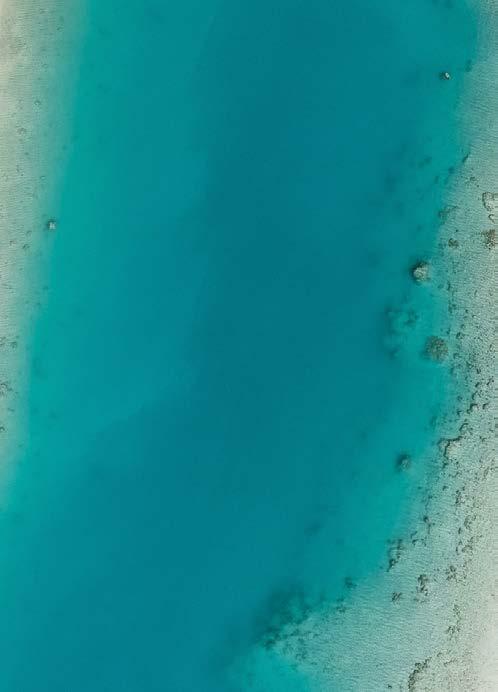
Mitigating our impact on water quality
In 2021, our main impact on water resources was related to water quality due to dredging. To mitigate this impact, we appointed contractors with strict contractual requirements in terms of sediment control through protection items such as silt curtains as well as water quality monitoring buoys to accurately measure the effectiveness of the silt curtains. On full-time employed sites, our environmental compliance team conducts daily inspections at the construction sites to ensure minimal impact on water quality.
Leveraging our PPP with ACWA Power
As part of our PPP, three SWRO plants are being constructed. Two are planned to be completed by the end of 2022, and the third in 2023. The plants will use seawater to generate drinking water, which will be used also for firefighting and for additional irrigation demands. The facilities will be designed in compliance with Saudi national legislation limits and the International Finance Corporation (IFC) Standards.
The main SWRO plant is being constructed by the PPP with a capacity of 37,500 m3/day through a Utility Concession Agreement (UCA) for 25 years. Once it is commissioned, the plant will be integrated with our first 12,500 m3/day SWRO plant and transferred to Marafiq, to create one SWRO Plant with a total capacity of 50,000 m3/day.
With 45% of the project in the construction phase, we are focusing on building water stewardship in the design of our assets. More than 75% of our assets are on track to be certified either by LEED or Mostadam which require consideration of life cycle impacts in the extraction, processing and discharge of water with large emphasis on water conservation.
86 RSG Sustainability Report 2021
Mitigating and remediating the impact of our water discharge

From a pre-construction standpoint, we conduct hydrodynamic modeling, bathometric surveys and dispersion modeling to determine the best possible location for the discharge points. During operations, there are rigorous sampling programs in place to ensure discharge water is to specification and not negatively impacting the surrounding environment. Further to this, continuous monitoring buoys are placed around the modeled dispersion zone to ensure water quality is continuously within the approved designed (as well as regulatory) limits. There is currently zero RO discharge within the lagoon as this will also be the case during the operations phase. Additionally, we conduct hydrodynamic modelling at all our offshore activities involving dredging to ensure oceanographic processes, marine and coastal, are not affected by developmental activities.
Actions: We implement the mitigation hierarchy (avoid, reduce, compensate) to mitigate and remediate potentially harmful effects or impacts on environmental receptors (biological or physico-chemical).
Monitoring: We monitor the physico-chemical, biological and social components across all developmental activities in accordance with the ESIA reporting process, as required by the IFC and Saudi NCEC Standards. This ensures the effectiveness of the mitigation measures taken and enables us to reduce any potential impacts on our primary substances of concern. We monitor quantities of sewage being sent to wastewater treatment plants from activities on site.
Researching solutions to reduce impact of brine discharge
In 2020, we signed a Master Research Agreement (MRA) with KAUST to guide and provide mechanisms for collaborative research and development, covering different areas of research such as marine ecosystem assessment, monitoring, water desalination and brine discharge.
Under this collaboration, we also explored the feasibility of co-developing The Red Sea Project-KAUST Marine Research and Coral Conservation Center (MRCCC). The center will support long-term marine ecosystem monitoring and research. This will facilitate successful implementation of the ambitious environmental conservation and enhancement objectives.
87 RSG Sustainability Report 2021
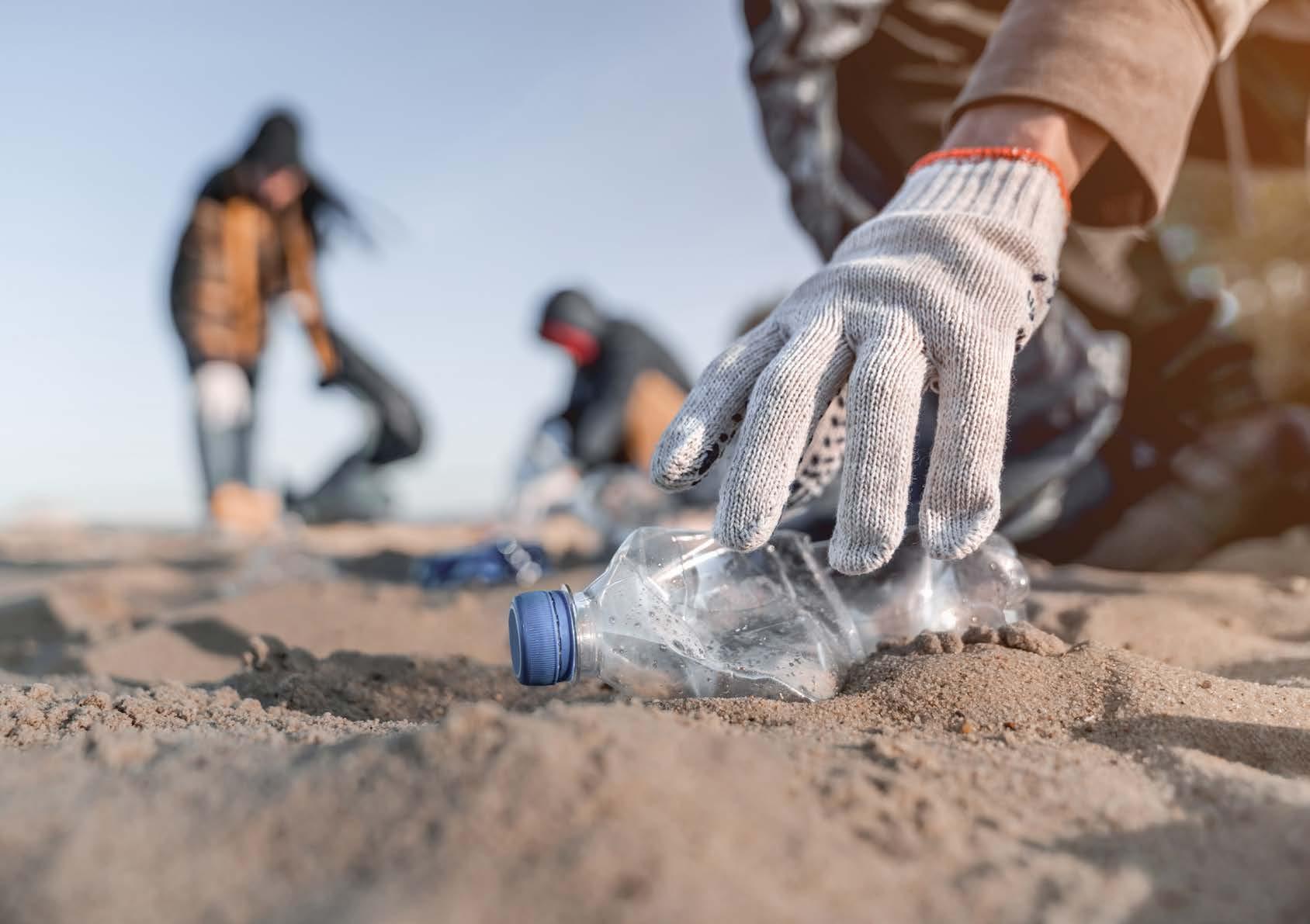
Waste
Building a destination of this scale, from the ground up and with no pre-established infrastructure, generates thousands of tons of rubble, rock and concrete. Moreover, the project’s workforce size, equivalent to the population of a small town, generates tons of household waste. Yet, as we build a world-leading destination from scratch, we are also devising new benchmarks for large scale development projects globally. We have therefore articulated an ambitious waste management principle to minimize waste to landfill as far as technically possible.
Key highlights from our
waste management principle
• Diversion from landfill in construction phases
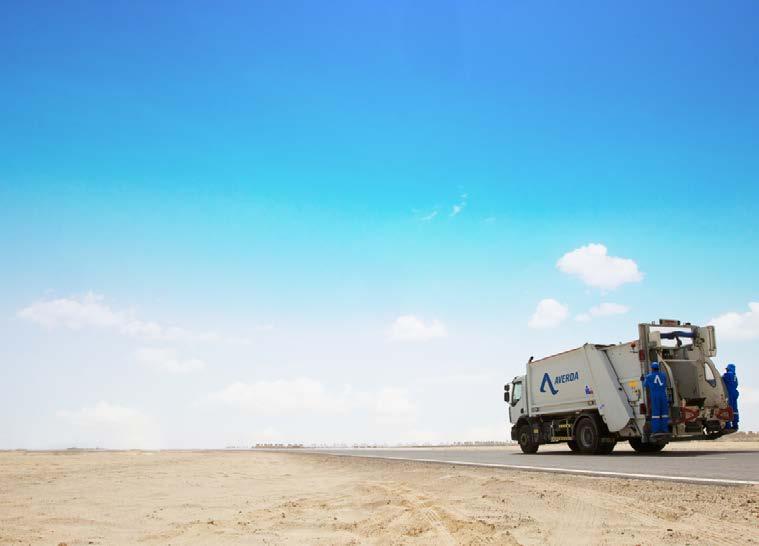
• Avoiding hazardous waste generation
Our waste management hierarchy articulates our order of preference to reduce and manage waste with the ultimate aim to minimize waste disposal. Across our value chain, we have mapped possible sources of waste and are identifying opportunities to prevent or reduce waste. In case prevention or reduction of waste is not applicable or possible, we focus on reusing or recycling.
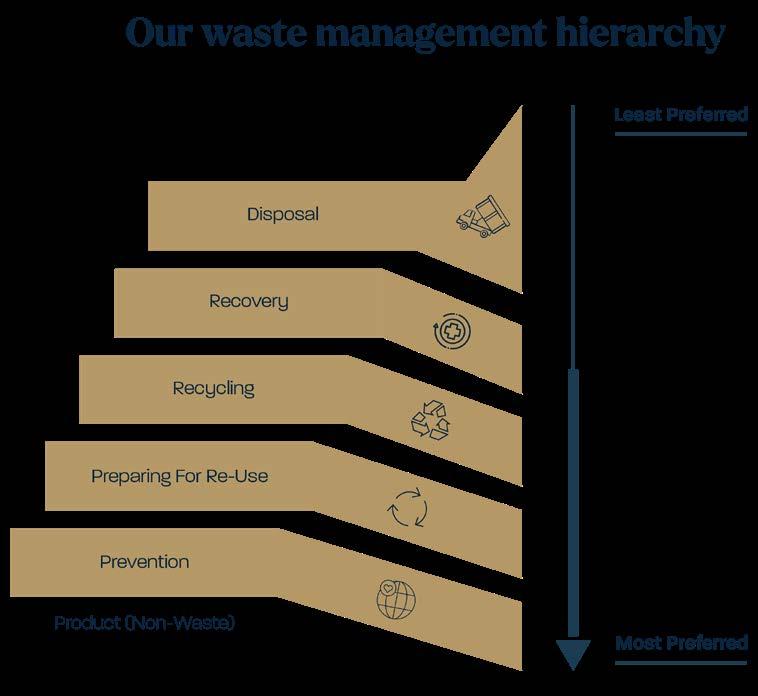
89 RSG Sustainability Report 2021
Our waste management facility
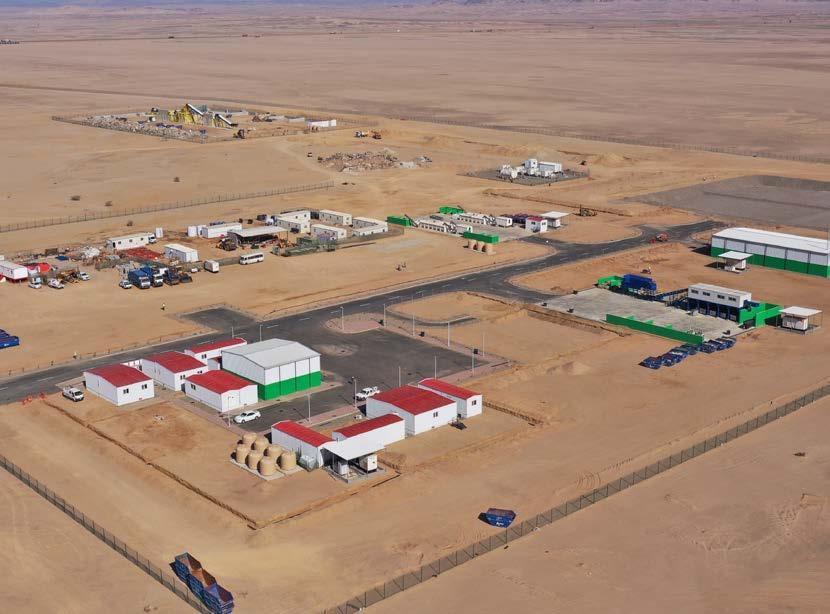
To achieve our ambitious goal of waste diversion from landfill, we have opened an integrated environmentally friendly waste management facility at the project’s site. The facility manages and collects waste generated by our construction activities, administration offices and residential facilities while aligning with our waste management hierarchy. All our contractors are required to collaborate with our waste management facility for the appropriate implementation of our waste management hierarchy.
1. Construction waste is sorted, treated with special machinery, and transformed into smaller particles to be reused for other purposes such as aggregate for building roads.
2. Besides construction waste, dedicated recycling bins allow us to segregate recyclable glass, plastics, cans, paper and cards at the source and collect them separately before being transferred for recycling by our facility management or by other licensed waste and recycling management centers.
3. Food and organic waste are turned into compost and circled back to soil.
4. After these processes, the remaining proportion of non-recyclable non-hazardous materials is incinerated.
5. Our hazardous waste is not currently being recycled. 100% of all hazardous waste is collected by an NCEC approved waste transporter and transported to an approved NCEC receiving facility where waste is treated through various treatment methods depending on the type of hazardous waste.
Through these processes, we are minimizing the amount of waste diverted to landfill to the maximum extent technically possible. A small unavoidable proportion of residual nonhazardous waste remains which cannot be reused, recycled, composted or incinerated, and therefore has to be disposed in landfills.
In my 40-year career, it’s the first time I’ve seen a facility of this magnitude built at the outset of construction. The facility allows us to conduct waste segregation at every area of the construction sites across the development, followed by the collection and then repurposing and recycling.
Ian Williamson, Group Chief Projects Delivery Officer

90 RSG Sustainability Report 2021
Preventing waste
While implementing a robust waste management process, we recognize that the most efficient waste management hierarchies are those that prevent waste generation from the start. Therefore, we have adopted innovative design and construction methods for multiple developments to help us reduce waste generation.
Despite challenges in its construction and handover due to COVID, our integrated waste management centre was delivered in 2020, and was fully functional in 2021. Operated by Averda, our construction waste processing plant enabled us to exceed our internal diversion from landfill targets. While in our offices, our Green Office program was initiated to support with phasing down the use of single use plastic in our corporate offices, as well as minimizing paper-use.
Spotlight on some of our initiatives
Off-site manufacturing In collaboration with a leading timber construction company, we are implementing off-site manufacturing methods for all timber material that is used for the development of two of our resorts on Ummahat Al Shaykh Island. These off-site manufacturing methods help us reduce waste and the human impact of construction activities, thus contributing to preserving the natural environment.
Prefabricated modular construction For our Coastal Village, we collaborated with a modular design and off-site construction company for the off-site fabrication of modular units. Compared with conventional construction methods, modular construction allows reduction in construction waste, while maximizing accuracy, productivity and quality. It also contributes to environmental sustainability through improved airtightness and thermal performance. Overall, our on-site construction waste is estimated at 35 kg/sqm, much lower than international benchmarks set in LEED v4.1 BD+C rating system at 75kg/ sqm.
Monitoring our waste management performance
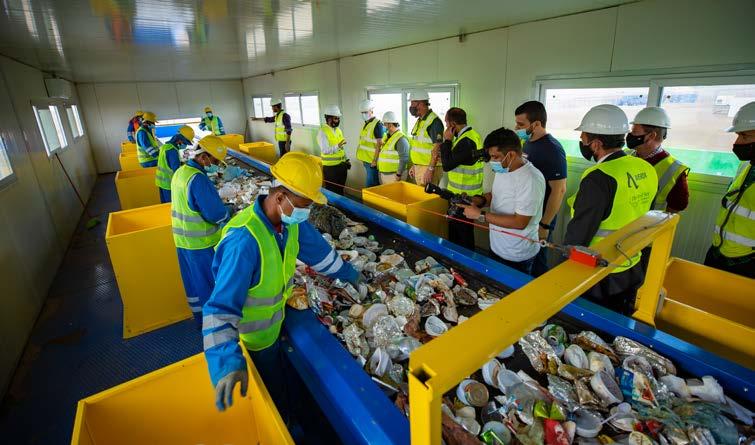
In line with our waste management principles, we have placed multiple requirements for each development starting from the design stage:
• Producing a detailed Waste Management Strategy to outline diversion from landfill during operations and how waste will be prevented from reaching all water bodies
• Presenting a procurement strategy for the operational phase that outlines how singleuse plastics will be designed out of the development and operational phases and present innovative approaches to sustainable procurement
• Presenting a Hazardous Materials Management Plan for the construction and operational phase that outlines how hazardous waste will be avoided by design
• Producing a Construction Waste Management Plan at the end of the design stage, prior to the hand over to the construction phase
• Outlining where and how suitable recycling and recovery infrastructure will be embedded within the plot boundary
Our SPMS captures waste-related data for our construction, operations and corporate offices at The Red Sea Project..
91 RSG Sustainability Report 2021
Biodiversity
Our biodiversity ambitions are closely aligned with the Saudi Green Initiative’s three overarching targets on reducing emissions, protecting land and sea, and greening KSA. Through the protection and restoration of natural landscapes, promotion of biodiversity, and one of the most extensive nurseries in the Middle East, we are playing a significant role in contributing to a greener future for KSA.
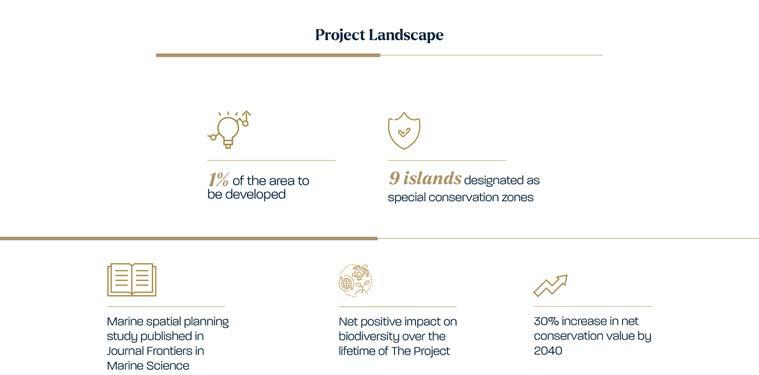
The Red Sea Project will create access to previously untouched landscape in a sustainable and ecologically responsible manner. Within the next two decades, the Project aims to achieve 30% increase in net conservation value in marine and terrestrial biodiversity. The success of this goal will be measured by a documented increase in species abundance and richness through offset and enhancement efforts of habitats such as mangroves, seagrass, corals and terrestrial vegetation.
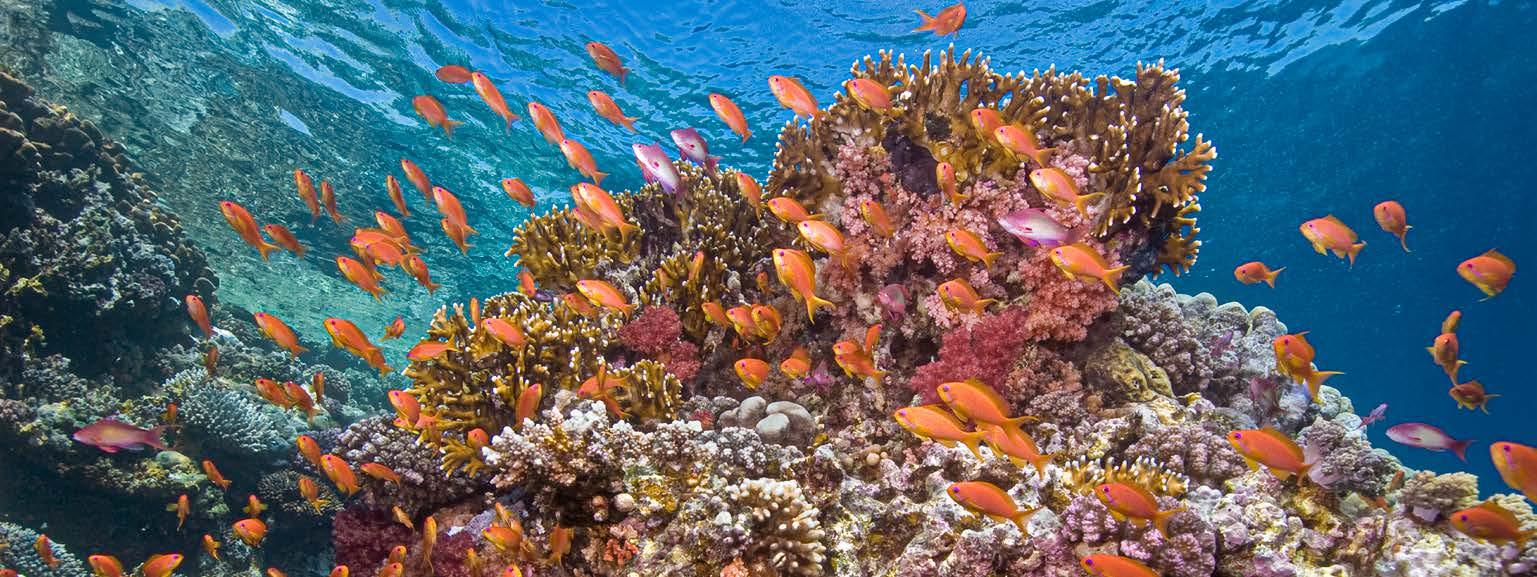
92 RSG Sustainability Report 2021
Conservation by Design
Our approach towards ‘Conservation by Design’ adopts best practices and is simple: set goals and priorities, develop strategies, act, and measure results.
Our overall goal is to achieve increase in net conservation value over the next two decades. To realize this goal, RSG undertook Marine Spatial Planning (MSP) for the valued environmental and biodiversity assets, considered the outcomes of the MSP within the Concept Master Plan (CMP) Strategic Environmental Assessment and developed the Biodiversity Action Plan (BAP) for the Project. This has enabled us to locate development footprint in areas of least impact, avoid and minimize habitat loss and identify and realize opportunities for regeneration and ecosystem services enhancement.
To act upon and deliver these strategies, our Environmental and Social Impact Assessments (ESIAs) provide robust mitigation plans which are aligned with World Bank (WB)/ International Finance Corporation (IFC) Performance Standards, UN Sustainable Development Goals and Equator Principles. ESIA mitigation plans are augmented with Asset based regeneration and compensation plans which integrate with the project BAP. This approach enables us to demonstrate and achieve an increase in net conservation value.
Offsetting and additionality measures are focused on mangroves, birds, corals and seagrass. Prospective sites for mangrove offsets are identified ideal for mangrove growth and provide higher rates of success. In 2021, visits were undertaken in the Red Sea Zone Authority with the National Center for Vegetation Cover (NCVC) in The Red Sea Project and Jizan Mangrove Nursery sites. Trial initiatives on artificial enhancement and restoration models for artificial bird nesting, ecological landscaping, artificial seagrass, and reef habitat creation are being developed. Our landscaping design aims to create additional habitat, utilizing native species, for invertebrates which will add to the prey base for local wildlife such as certain bats and birds. We have also created disturbance free zones around set-aside islands for conservation and around known nest (both birds and turtles) locations on developed islands. A program of continued annual monitoring of breeding ‘numbers and success’ on all islands is being implemented.
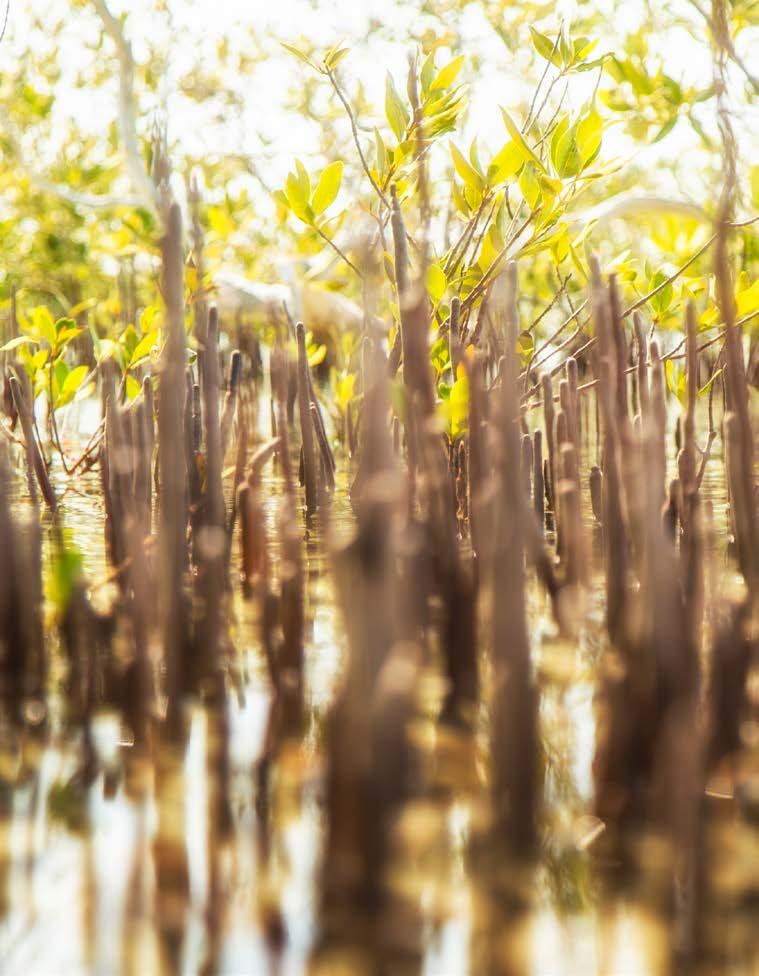
93 RSG Sustainability Report 2021
Mitigation of light pollution through the implementation of dark sky guidelines
Light pollution not only wastes energy, but is also detrimental to biodiversity as it disturbs the nocturnal environment and wildlife behavior. To minimize light pollution on our sites, we are implementing guidelines that were developed based on the principles of the International Dark-Sky Association. These guidelines were incorporated throughout all design phases, and issued to contractors and consultants as part of their contracts. In 2021, a Memorandum of Understanding (MoU) was signed with the International DarkSky Association, to apply for an IDA certification.
As part of our dark sky initiative, we also achieved:
• Completing a dark sky survey in the adjacent cities to assess and recommend strategies for mitigating light pollution.
• Local tourist guides were trained through a ‘train the trainer’ module on light pollution to raise awareness and promote astro-tourism activities.
• A community awareness campaign was conducted on light pollution and the benefits of the dark sky initiative.
Protected areas
To maintain the sanctity of the natural landscape, we have identified nine locations within The Rea Sea Project’s area that have been declared as special conservation zones. This means that no development will take place in these areas, and the landscape will be free of any anthropogenic activity.
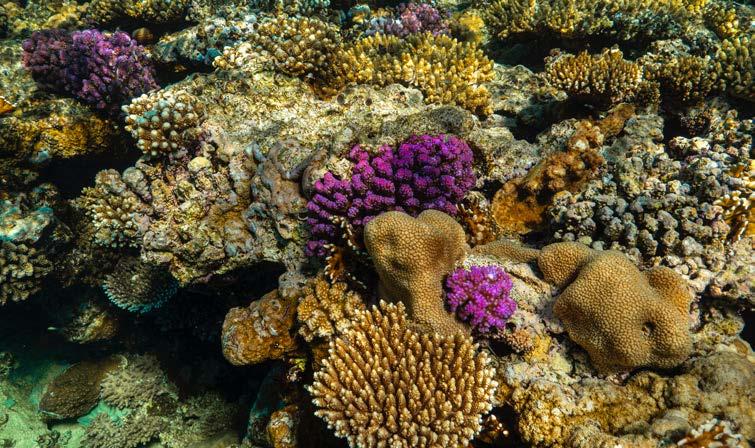
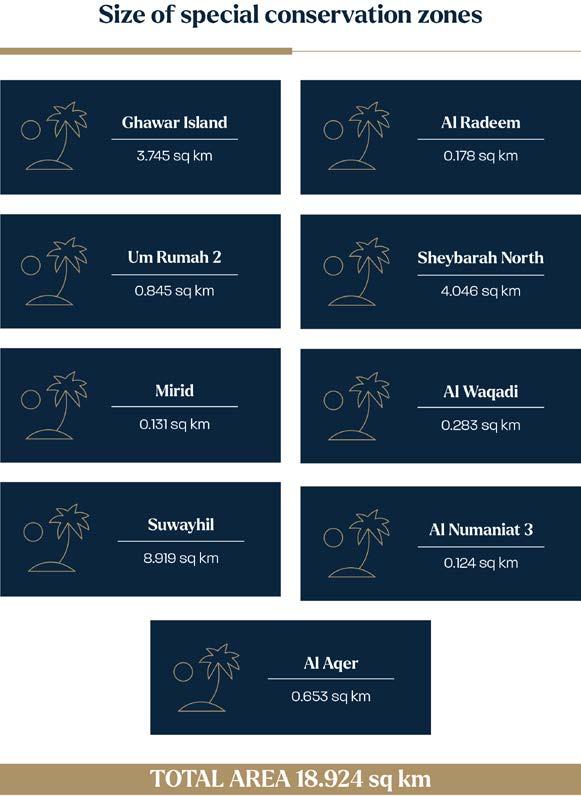
94 RSG Sustainability Report 2021
Conserving biodiversity
Several species of marine mammals, avifauna and reptiles are found in The Red Sea Project. From a conservation perspective, these species are taken into consideration during the design, development and implementation of construction and operations. Environmental baseline surveys have monitored species richness, abundance, and presence within and proximity to our development footprint. Surveys will be continued as part of our long-term monitoring plan to study the behavior of these species and monitor any changes in population and/or species diversity. More information about habitats and species at The Red Sea Project can be found in the appendix.
RSG is committed to biodiversity enhancement in accordance with the Saudi Green Initiative. In alignment with this initiative, response to ill and injured wildlife — particularly sensitive populations – is important. All rescue/ rehabilitation is undertaken with permission from National Center for Wildlife. The Department of Environmental Sustainability, Red Sea Zone Authority, takes care to assess each case presented to us with trained wildlife responders in coordination with expert aquarium veterinarians and veterinary technicians. This way, we ensure that every response is safe and necessary to the animal’s survival. RSG is also implementing a turtle tagging initiative in order to monitor and understand if they are able to thrive following their rehabilitation, as well as the foraging areas of the turtles we release, giving us a unique perspective since the majority of turtles tagged in RSG area have been nesting females.
Key species found in The Red Sea Project’s area
The Hawksbill Turtle
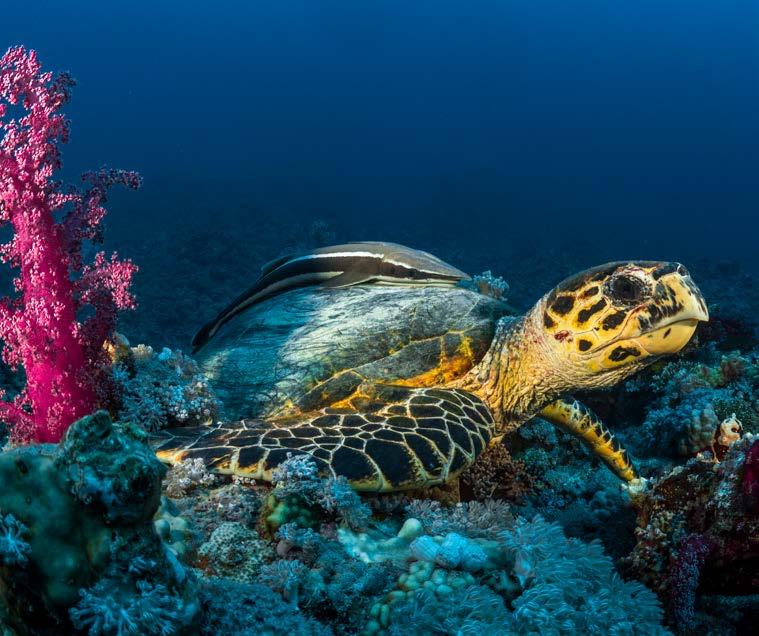
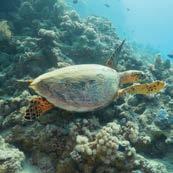
Critically endangered

The only critically endangered species found in this area is the Hawksbill Turtle. As part of our protection of species, following the success of tagging surveys in 2020, this year we continued to tag Green and Hawksbill Turtles to investigate their nesting behavior, and distribution of foraging and inter-nesting habitats. A total of 20 Green Turtles, and six Hawksbill Turtles were captured, tagged and released during their nesting seasons at two nesting islands in the Alwajh Lagoon, i.e., Al Waqqadi and Breem Islands. This data enables
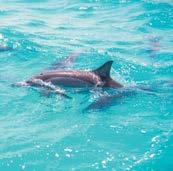
95 RSG Sustainability Report 2021
Hawksbill Turtle
Endangered Green Turtle, Indian Ocean Humpback Dolphin
Vulnerable Sooty Falcon, Spiny Tailed Lizard, Dugong
us to understand the migration patterns and behaviors of turtles which form a part of our key decision-making process when developing our plans.

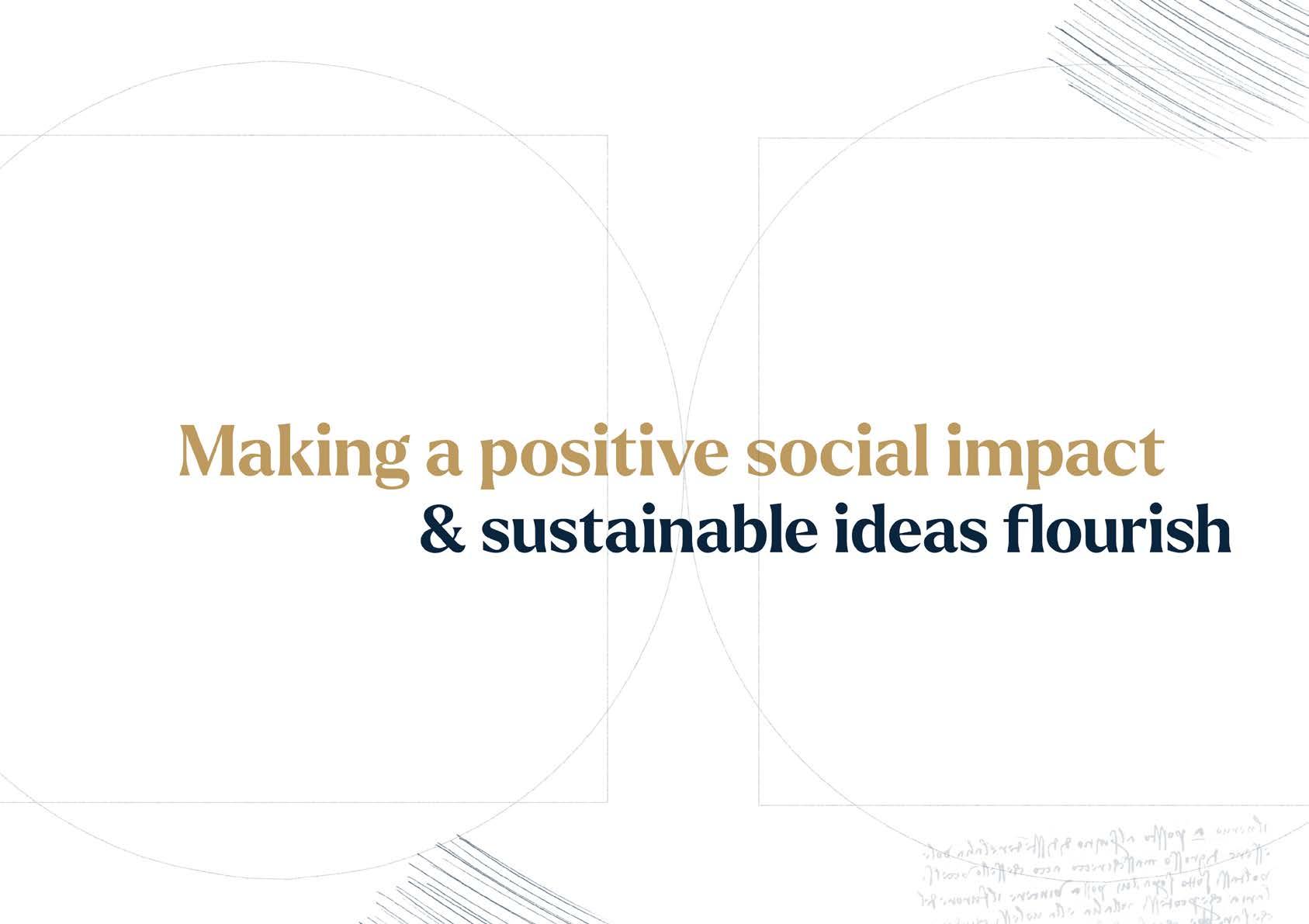
An attractive work environment
Our people are our most prized assets. That’s why we have made an unwavering commitment to promote diversity and inclusion and offer our employees access to industry-leading resources for well-being, learning and development, and leadership training.
Ahmad G. Darwish, Group Chief Administrative Officer
Attracting talent
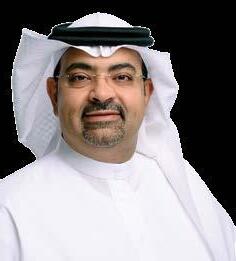
98 RSG Sustainability Report 2021
is
our
passionate
employees. Total number of employees 2019 2020 2021 645 413 1,067
Our organization
built on
people. As our business grows, we are investing in attracting, engaging, retaining and developing
and talented
We invest and engage with our partners and employees to support their personal growth and create an attractive working environment where all employees are engaged and keen to contribute to our ambitious growth plan. Total number of new employee hires during the reportingperiod 2019 2020 2021 277 288 509 Breakdown by gender Male Female 2019 2020 2021 232 56 230 47 99 410 New employee hires during the reporting period by age group Under 30 30-50 Over 50 2019 2020 2021 189 41 58 154 334 104 114 19 61 509 new employees were hired in 2021 +84% vs 2020 100% of employees are full-time.
Actively working to retain our top talent

2021 was a year of growth for us and it is our aim to further enhance the opportunities that we provide to our current and potential employees. We continue to work on developing employee-related programs and initiatives to engage and retain our people.
However, the COVID-19 pandemic, and its work-related challenges had an impact on talent retention. We have seen an increase in turnover compared with prior years. As employees return to office, we are actively working on several employee engagement and retention initiatives.
Engaging with our employees
We are constantly working on improving employee engagement across our organization. Our HR policy outlines how we assume responsibility in our interactions with employees. We build trust in employer-employee relations by being transparent in communicating organizational changes that can impact them. We have increased the frequency of communications and have developed multiple taskforces and initiatives in which employees play an active role in the decision-making process.
For transactional matters, we were the first Giga project to fully automate end-to-end HR processes, which helps us provide fast and simplified access of our employees to HR-related matters.
Listening to our employees
Through our people engagement survey, we aim to see things from our people’s lens, gather their views, and identify actions and initiatives to enhance their experience. After our initial people engagement survey in 2018, we are planning for an updated survey to be launched in 2022 to gather inputs about different subjects, identify areas to prioritize, and drive informed decision-making.
99 RSG Sustainability Report 2021
Turnover rate (%) 2019 2020 2021 7% 6% 10% Total number of employees leaving employment during the reporting period 2019 2020 2021 47 25 112 Total number of employees leaving employment during the reporting period: Breakdown by gender Male Female 2019 2020 2021 22 3 39 8 21 91 Under 30 30-50 Over 50 Total number of employees leaving employment during the reporting period: Breakdown by age group 2019 2020 2021 15 8 2 21 58 18 43 8 11
Calculated by dividing the total number of employees leaving employment
the reporting period by the total number
the end
the reporting period.
1.
during
of employees at
of
Providing attractive benefits
We recognize that employee benefits and remuneration can make our employees feel appreciated and rewarded for their efforts, and thereby motivated to keep doing more. They also enable us to be competitive employers and attract and retain the right talent. We have developed an attractive and competitive benefits plan.
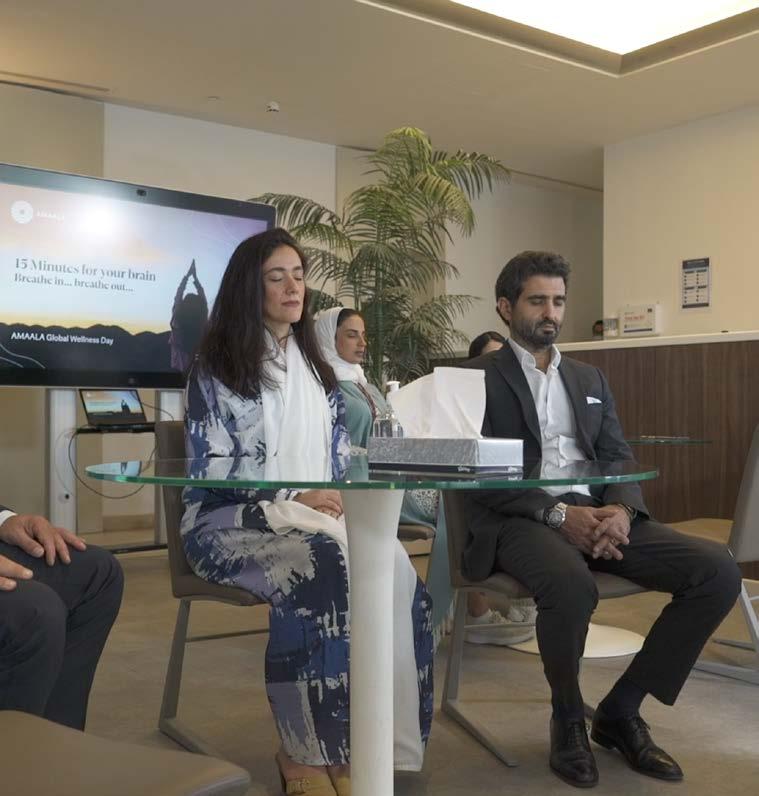
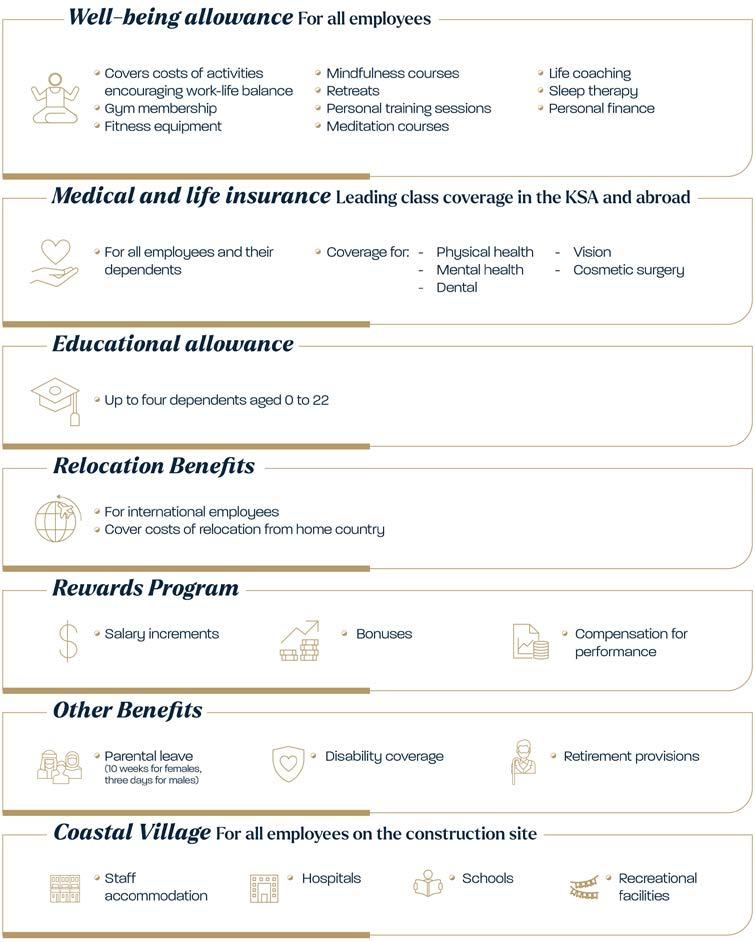
100 RSG Sustainability Report 2021
Spotlight on parental leave
Our HR policy
Our HR policy is developed in compliance with the labor laws set forth by the Ministry of Human Resources and Social Development of the KSA.
Our HR Division is responsible for reviewing the policy every year and proposing recommendations for improvements in light of any changes made to the labor law of the KSA, or as a result of new strategic directions. Our HR policy is communicated in our employee handbook that is provided to each employee as part of the onboarding process. We also regularly hold awareness events to reinforce corporate policies and processes and give employees a platform to ask questions and voice their views.
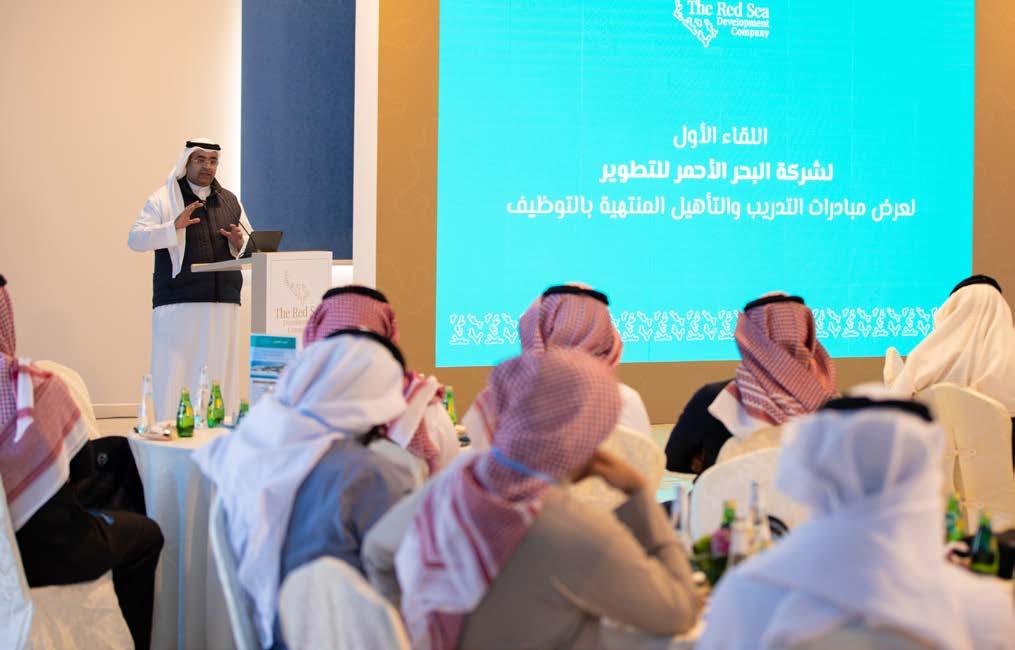
101 RSG Sustainability Report 2021
Total number of employees that took parental leave 2019 2020 2021 4 1 12 8 6 25 Male Female Number of employees that returned to work after parental leave ended 2019 2020 2021 4 1 12 5 6 25 Male Female Number of employees that returned to work after parental leave ended and that were still employed 12 months after their return to work 2019 2020 2021 4 1 1 1 6 25 Male Female Return to work of employees that took parental leave, in percentage 2019 2020 2021 100% 100% 100% 100% 100% 62.5%
Male Female
Diversity and equal opportunity
We celebrate diversity, welcoming expertise from all ages, genders and nationalities, with 56 nationalities represented by our workforce. We believe that different backgrounds bring diversity in thinking and can stimulate innovation, creativity and growth.
Our HR and non-discrimination policies are in place to ensure that all our employees have equal opportunities and fair treatment and that they are comfortable to be themselves without feeling pressured to fit in.
Male
Breakdown of
56 nationalities
Empowering female talent is essential to the health and social development of our organization and communities. We value female talent, and we focus on providing them with equal career opportunities while supporting them to reach their full potential through mentorship and career support, both within our own organization and in our communities.
20% of new hires were females (+2.5pts vs. 2020) 52 females in senior management positions Female employees account for
102 RSG Sustainability Report 2021
21%
31%
Our non-discrimination policy, which includes equal opportunity for male and female talent, covers the entire talent life cycle, from recruitment, financial compensation to promotions and career advancements. 12%
of the total workforce
in mid-level management
in senior and executive positions
Supporting our female talent
Female
2019 2020 2021 77% 23% 79% 21% 79% 21%
all
by gender 2019 2020 2021 55% 45% 69% 31% 84% 16%
by gender 2019 2020 2021 76% 24% 80% 20% 69% 31%
Middle Management
2019 2020 2021 90% 10% 89% 11% 88% 12%
Looking ahead, we are keen to continue increasing female representation and we will continue to support them to maximize their potential through a range of development and support programs.
employees
Breakdown of Staff
Breakdown of
by gender
Breakdown of Senior Management by gender
Supporting Saudi talent
We are committed to supporting national talent and professional capabilities in KSA through employment, competency training, professional development, and enrichment. We aim to hire the best and most innovative minds to continuously develop our business operations and activities and ensure business resilience. With this commitment, we are able to contribute to the development of the national workforce and in building the human capital of KSA.
501 Saudi nationals were employed in 2021.
47% Saudization rate achieved across corporate functions.
Breakdown of Middle Management by nationality
Breakdown of all employees by nationality
Breakdown of Staff by nationality
Breakdown of Senior Management by nationality
We will continue to create programs and activities to further and maintain our saudization goals. We are working to increase opportunities for advancing the rising number of KSA nationals in our workforce and enhance our saudization performance.
103 RSG Sustainability Report 2021
Saudi Non-Saudi
2019 2020 2021 45% 55% 51% 49% 47% 53%
2019 2020 2021 77% 23% 88% 12% 78% 22%
2019 2020 2021 55% 45% 48% 52% 42% 58%
2019 2020 2021 20% 80% 20% 80% 77% 23%
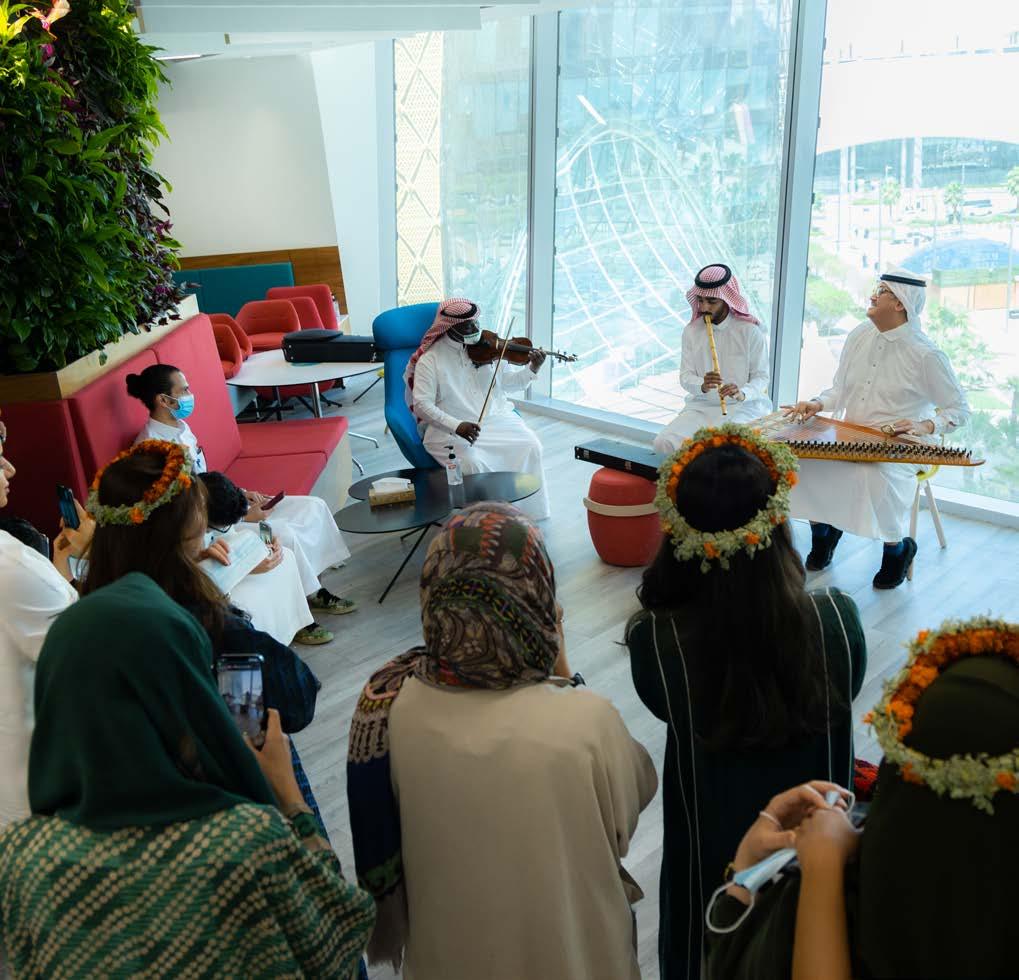
104 RSG Sustainability Report 2021 Under 30 30-50 Over 50 Breakdown of employees by age group 2019 2020 2021 45% 55% 67% 20% 13% 65% 23% 12% 68% 18% 14% Total workforce 2019 2020 2021 45% 67% 29% 4% 82% 13% 6% 77% 18% 4% Mid-level management positions 55% 2019 2020 2021 52% 43% 1% 45% 55% 0% 48% 0% Staff positions 2019 2020 2021 45% 55% 72% 1% 27% 72% 0% 28% 71% 1% 28% Senior and executive positions
We encourage and promote a culture of wellness to help our employees lead happier and healthier lifestyles. We have developed an attractive corporate wellness program across our organization with focus on the holistic pillars of well-being including mental and emotional well-being, nutrition, physical fitness and movement.
Our wellness champions
We have selected 34 champions based on their interest in health and wellness. They represent the diversity of our organization and help to embed a culture of well-being by acting as role models and ambassadors for corporate well-being. Their role is to raise awareness of HAYAH and its support services and encourage their peers to be involved in corporate wellness initiatives, such as health lounges for collation of vital signs, blood donation campaigns, as well as mental and physical health activities.
Mental health first aiders
A group of 10 colleagues undertook a two-day training course with the Saudi National Center for Mental Health promotion, to become qualified mental health first aiders. They have been trained to identify the symptoms of a mental health episode (such as anxiety or panic attacks) and intervene on the spot to provide assistance. With full confidentiality, they can also help direct colleagues to seek professional help when required.
Employee Assistance Program (EAP)
Our EAP provides access to psychologists, dieticians, as well as financial, legal and career advisors to all employees and their immediate household family members. This program is offered through an independent external organization to ensure confidential and impartial personal support service.
Mindfulness app
Mental and emotional well-being is a key focus of HAYAH. In additional to psychological support through the EAP, our HAYAH program offers a free subscription to one of the world’s leading mobile applications for mental health, meditation and better sleep.
Fitness centers
To further promote a healthy lifestyle, we established fitness centers on site and have made them available for all employees and the community.
First aid training for our employees
We want our people to be ready to provide timely support to each other in case of medical emergency. Therefore, we have delivered first aid trainings for a total of 93 employees across our corporate office and Project’s site. The training provides them with knowledge on how to deal with emergency situations until professional help has arrived.
105 RSG Sustainability Report 2021
Developing our people
Learning and development (L&D)
We believe that continuous learning is a powerful tool to help our employees stay updated with evolving trends, equip them with the right knowledge, skillset and abilities, and align with leading practices around the world. By doing so, we are creating a working environment that is innovative and conducive of change, one where the learning curve is steep and where we keep challenging ourselves for continuous growth.
Therefore, we are investing significantly in L&D through our in-house programs as well as local and global learning providers.
Identifying and evaluating our training approach
Our competency framework identifies key knowledge, skills, experiences, and behaviors that are required for our employees across all organizational departments and levels, and provides a valuable input into our training curriculums.
We follow a structured process to identify training needs and evaluate training effectiveness in line with business needs.
As part of our annual performance cycle
As part of our performance management process, all our employees go through regular performance and career development reviews. This helps set objectives at the start of the year, evaluate progress at mid-year, and review performance at year-end. Our year-end performance review process includes a development plan to be implemented the next year which translates into training needs relevant to each employee, and feeds into our training calendar.
Through our annual functional Training Needs Analysis (TNA)
Through our annual functional TNA process, we collate, analyze and prioritize the learning needs of each department, and prepare an organization-wide training plan and calendar accordingly.
Total number of hours 11,423
Total number of participants 463
Through 360-degree assessment
To help our employees understand their strengths and areas of improvement, we request our employees to conduct an annual 360-degree assessment where they collate personal feedback from colleagues, direct reports, peers, line managers and other colleagues with whom they work closely. Results of the 360-degree assessment are consolidated at organizational-level and shared with our L&D team to identify behavioral areas of improvement which translate into a training plan and calendar.
106 RSG Sustainability Report 2021
Evaluation of learning effectiveness through Kirkpatrick model
We believe that effective learning is key to organizational performance. We evaluate learning effectiveness through multiple activities:
Women Leaders Program
4 female employees from our organization completed the 2021 Women Leaders Program held in collaboration with the Ministry of Human Resources and Social Development and Princess Nourah Bint Abdul Rahman University and delivered by INSEAD. This program is intended to provide businesswomen with the skills they need to develop their leadership impact, and affect long-term personal and professional changes in their organizations.
KAUST Saudi Leadership Program
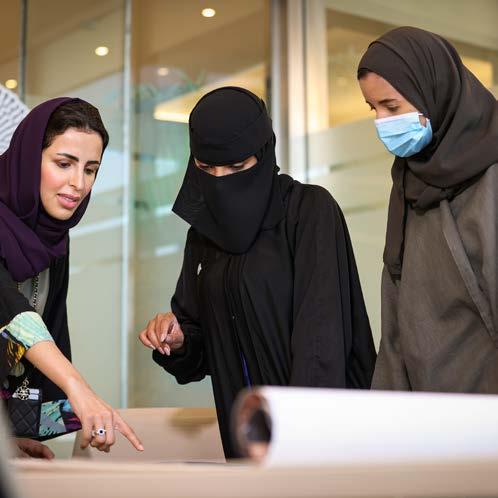
16 employees participated in the KAUST Saudi Leadership Program (KSLP) for emerging leaders, which was a program focused on creating strategic impact, aimed to develop the capacity of Saudi leaders to drive change in their institutions, build professional networks and enhance their personal growth. The selected participants learn from a customized curriculum designed and presented by a leading global university.
Spotlight on some of our insightful and diverse training programs
• Environmental management
• Sustainability
• Accounting and taxation
• Governance
• Risk and compliance
• Auditing
• Marketing
• Digital transformation
• Finance
• Business continuity
• Real estate
• Leadership and soft skills
• Project management
• English and Arabic language
• Facility management
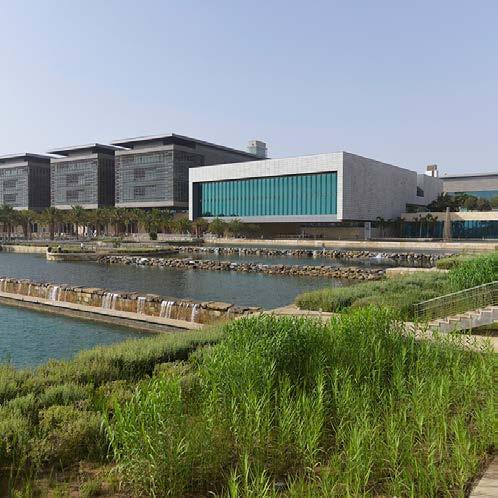
• Key performance indicators
• Health and safety
• Human resources
• Legal
• Procurement
Participant’s profile
• Saudi
• Middle management level (Managers, Senior Managers, Associate Directors and Directors)
• Commit to fully participate in the five-day program
• Have one or more employees reporting to them

107 RSG Sustainability Report 2021
Through our collaboration with the National eLearning Center (NELC), we launched the digitized learning content to enable our divisions to drive a streamlined execution of learning programs such as those required as part of the induction program or annual refreshers. The content will have a unified, company-branded format and will be distributed via our Learning Management System. The system enables us to track and report training completion rates and therefore proactively identify and address noncompliance with training requirements.
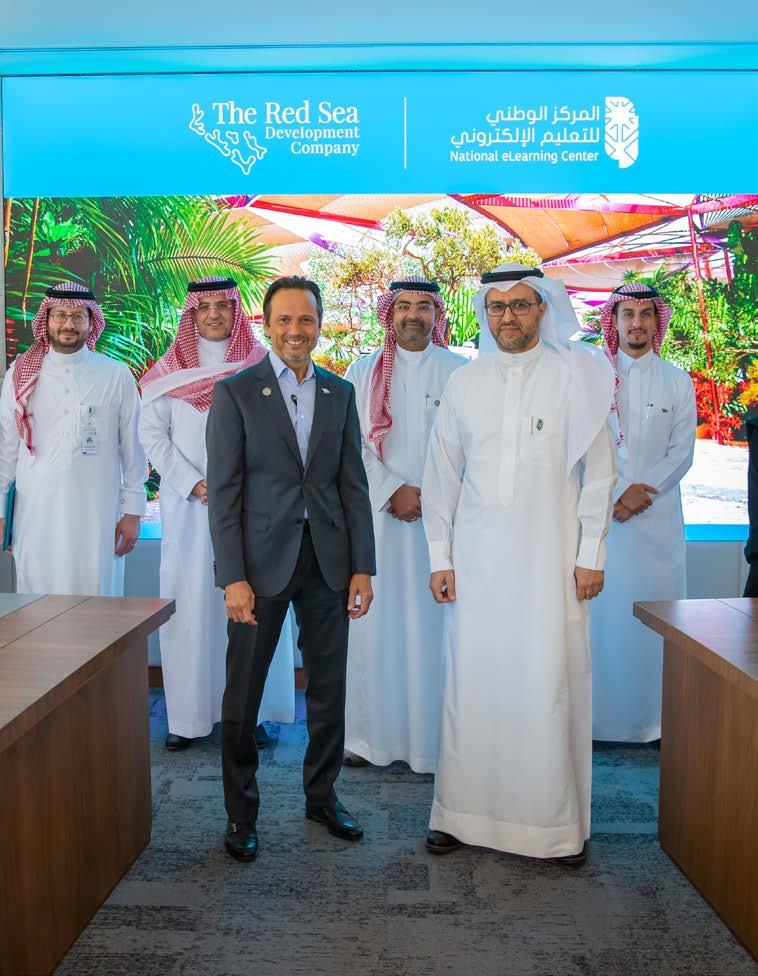

We have delivered the following topics using our e-learning:
• Code of Conduct
• Confidentiality
• Related Party Transactions
• Whistleblowing
• Head office health and safety induction
• Health and safety leadership policy
• Site visitor induction
• Electrical safety
Average hours of training 1 during the reporting period
1. Training includes internal and external programs, exams and other learning events. We consider eight hours of classroom-based training, and five hours of e-learning to be equivalent to one day of training.
108 RSG Sustainability Report 2021
2021 20 Senior Management Middle Management Staff Breakdown by employee category 2019 2020 73 41 140 11 7 28 21 59 Breakdown by gender 2019 2020 2021 Male Female 70 93 15 17 21 40
Scaling talent attraction through our education programs
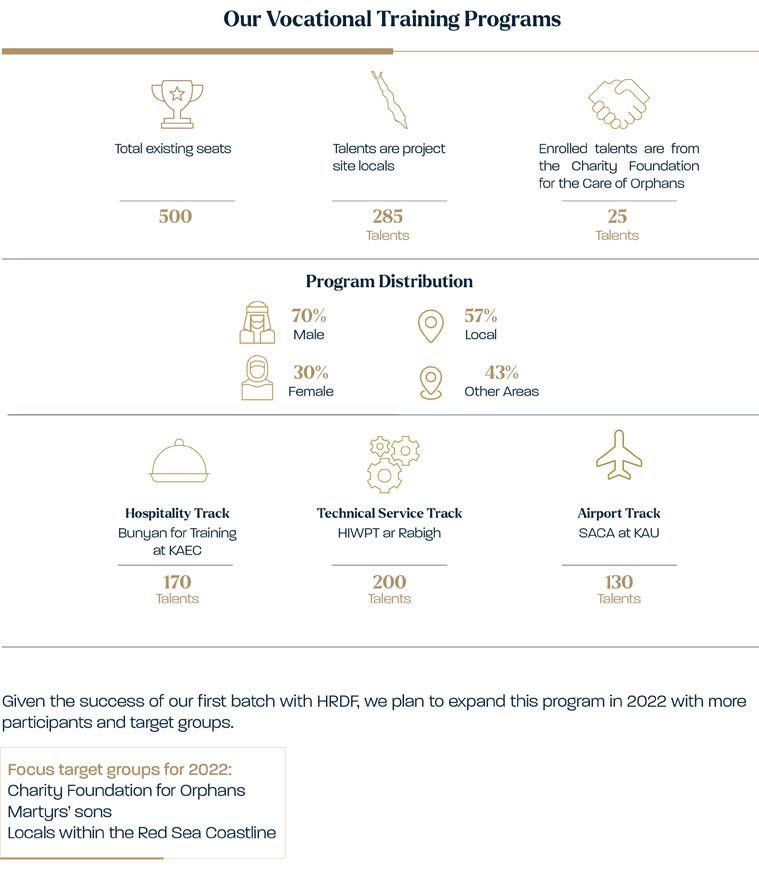
We have developed multiple large-scale education programs targeting future employees who will be working on-site in The Red Sea Project. This highly strategic initiative opens new doors for students to specialize in areas relevant to the current and future needs of the labor market and prepares them to enter the workforce with our organization upon their graduation. In 2021, we signed the first agreement with Human Resources Development Fund (HRDF) to enroll 500 students in our vocational training program.
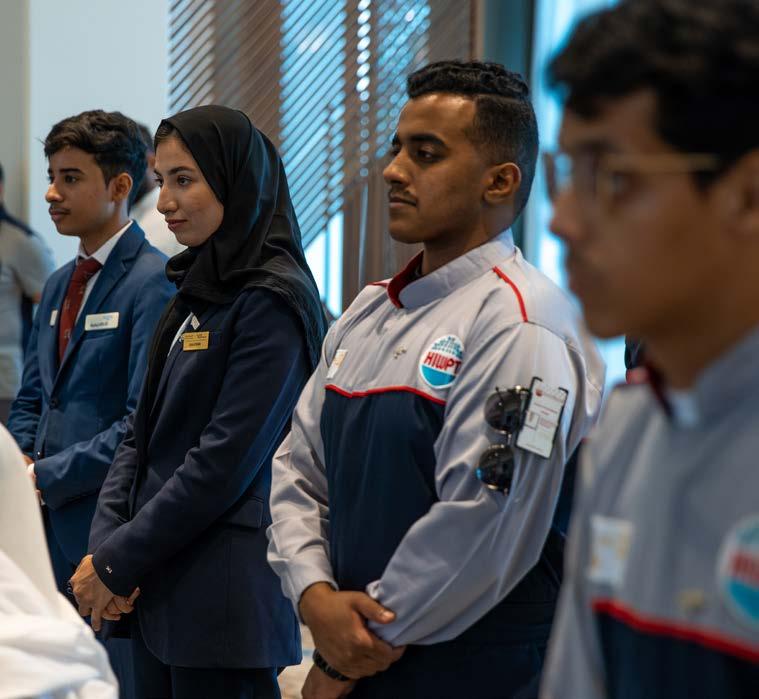
109 RSG Sustainability Report 2021
Our scholarship program in International Hospitality Management with University of Prince Mugrin
Our scholarship program, which was launched in 2019, has gone into its third year. 120 students, fully sponsored by our organization, completed six semesters and are on track for graduation by 2024.
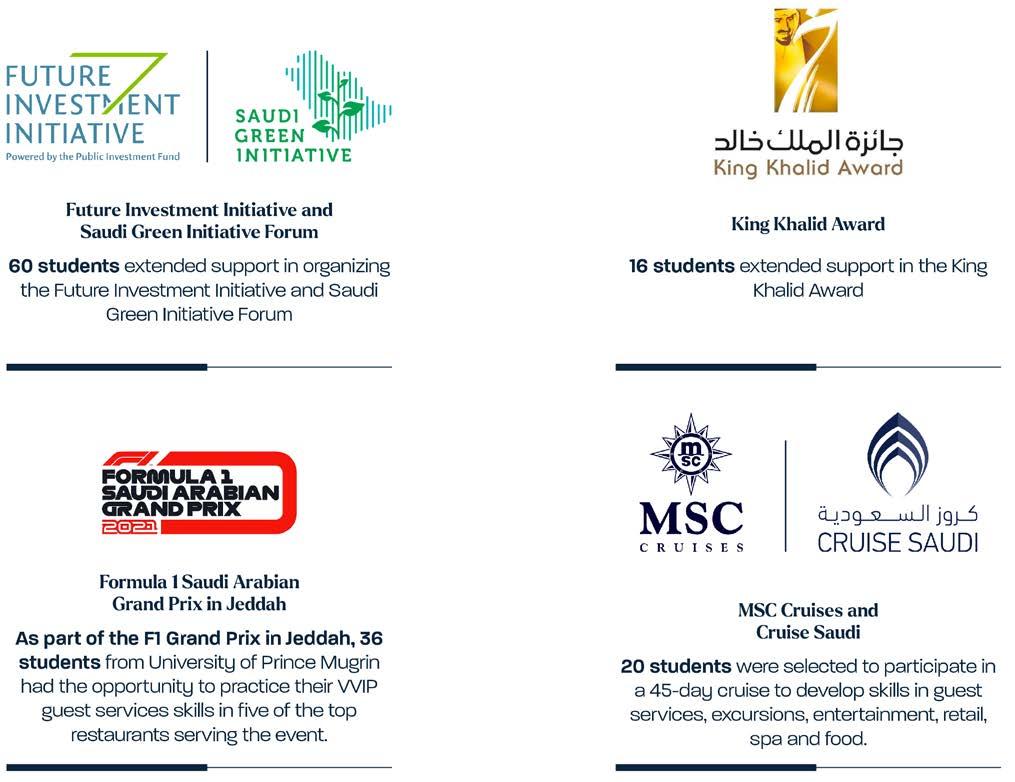
Our enrichment programs for our students
We believe that effective enrichment programs are integral to education as they help keep learners engaged and therefore contribute to the program outcomes. We ran multiple enrichment activities for our students such as after-school extracurricular activities, academic clubs, student visits, practical experiences and workshops.
94% student retention rate in our education programs
Visits and meetings our employees
We organized multiple visits to our premises as well as events with employees from our organization. These activities enable our students to get to know more about our organization and their future employer.
110 RSG Sustainability Report 2021

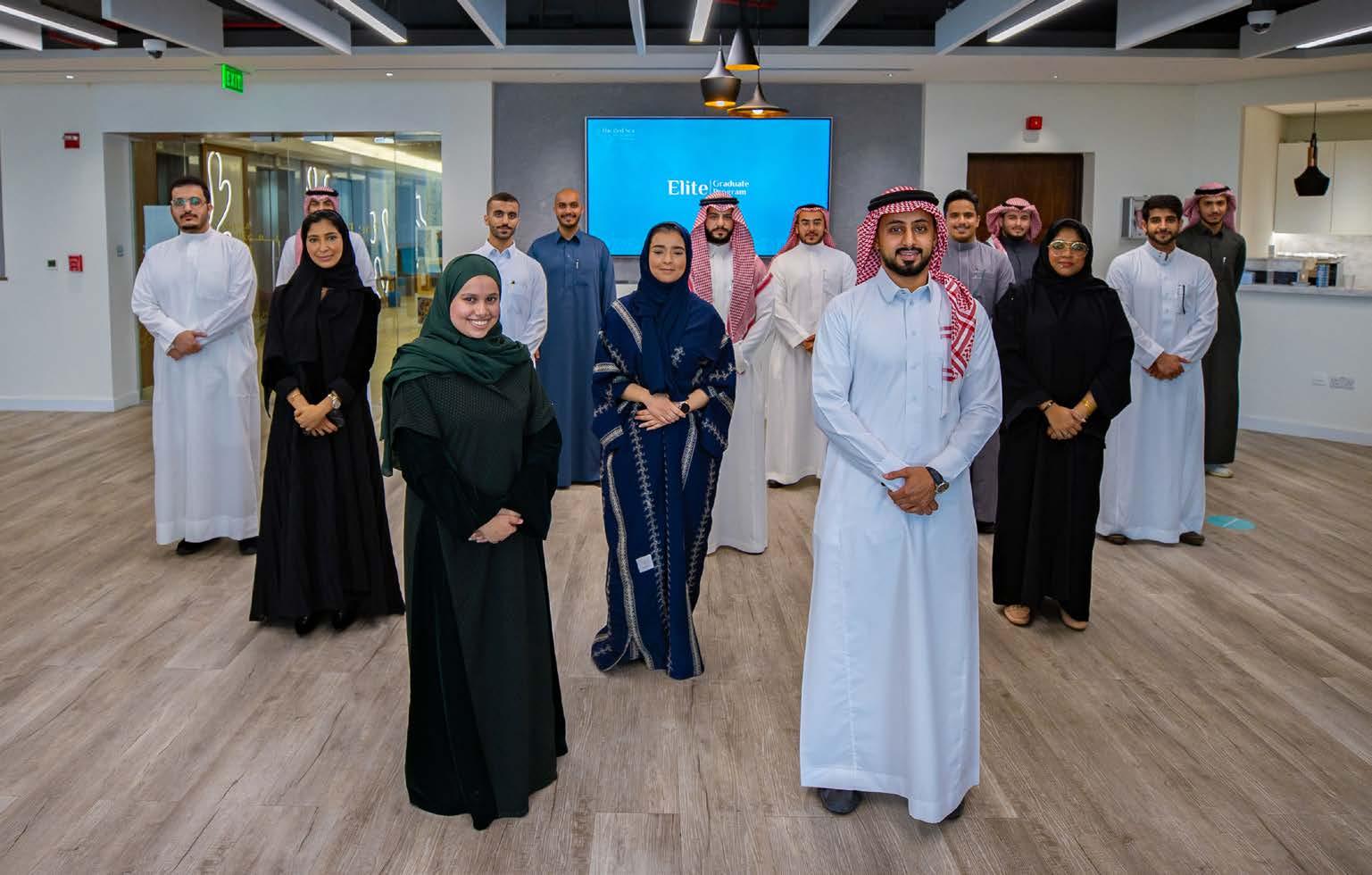
112 RSG Sustainability Report 2021
We launched the Second Edition of Annual Elite Graduate Program and hired 30 fresh graduates.
Our Elite Graduate Program

Our Elite Graduate Program is our campus-to-corporate fast track program for exceptional Saudi graduates. It aims to accelerate the enrolment and integration of Saudi graduates in our working environment.
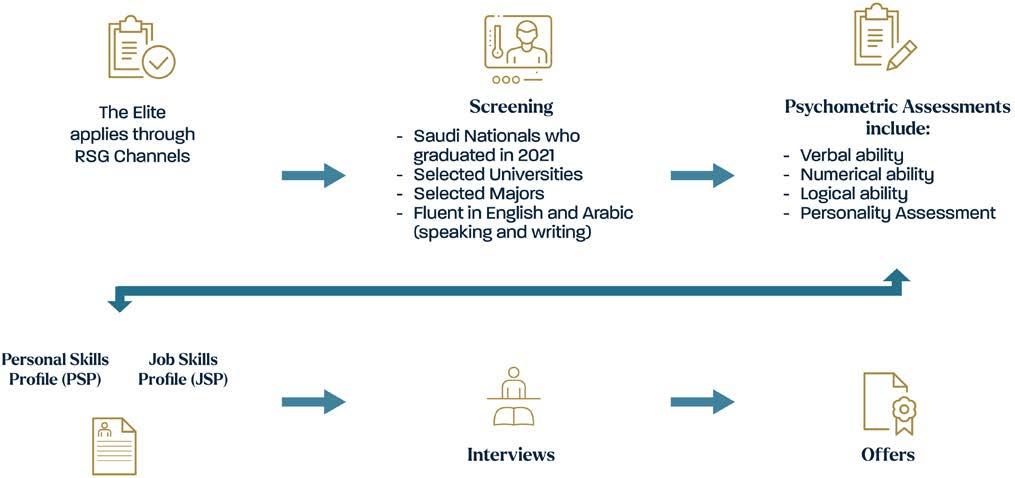
Our program follows a structured approach from talent attraction, interviews, assessment, through to hiring and on-job training.
We follow the 70:20:10 learning model, whereby 70% of learning is acquired on the job, 20% through mentoring and coaching, and 10% through classroom-based learning. Once they are on the job, regular one-to-one coaching sessions are scheduled with each graduate to understand their progress and help them set objectives for the next phase.
113 RSG Sustainability Report 2021
2021 Elite Graduate Program 150 Face-to-face interview 300 Psychometric assessment 903 Shortlisted for interview 23,777 Applicants 30 Hired
Focusing on health and safety
The safety and well-being of our employees and contractors is paramount to our organization, and we continuously strive to foster a work environment that is safe and healthy for everyone. Our commitment to create a safety culture spans across our offices, operations and construction sites. Our Health and Safety (H&S) Division oversees occupational health and safety across our operations along with the Project Delivery and Operation teams to ensure safe delivery of our projects and safe operation of our completed assets.
Consulting our employees: We consult and encourage participation from our employees in the development and implementation of the H&S Management System through a variety of forums and methods:
• Involvement of our employees in our hazard identification and risk assessment reviews.
• Site-based H&S inspections, audits and executive Health, Safety & Environment (HSE) walks with our contractors and consultants.
• Employee and worker H&S committees meet on a weekly basis to create a venue for open dialogue on health and safety matters. These committees comprise contractors, project and construction management teams.
• Our H&S professionals interact regularly with the construction teams to develop strong working relationships that encourage honest and open dialogue around safety aspects of the work.
Educating our employees: We conduct regular training and development programs to establish a culture of H&S across the organization and equip employees with knowledge to develop risk-free behaviors.
• Daily H&S Toolbox Talks.
• Weekly and monthly H&S bulletins.
• Health and Safety Life Crucial Audit Program.
• Risk mitigation campaigns such as Defensive Driving Safety, Heat Stress, Electrical Safety and Hand Safety.
• Heat index notification and heat index flag color code communication.
• Mandatory H&S training for all individuals who are required to access the construction site, regardless of their role and level.
• Emergency drills.
Without paying close attention to the welfare, health and safety of our employees and contractors, we could never have delivered on such a visionary development program. From our hospital to our airport to our world-class employee accommodations, no investment is too great if it safeguards our people.
Brian Spraker, Head of Health & Safety
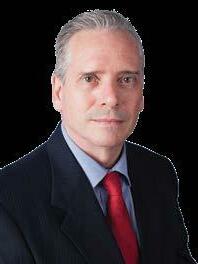
ISO 45001:2018 Certification for Health and Safety Management System
Complying with leading standards, guidelines and practices
Our Health and Safety Management System:
• Is certified ISO 45001:2018 which provides international standards for Occupational Health & Safety (OHS) management system.
• Follows Health and Safety at Work Act (HAWSA), Occupational and Safety and Health Administration (OSHA), IFC Occupational Health and Safety guidelines, and European Agency for Safety and Health at Work.
• Is audited annually by our Compliance Department to ensure that legal and non-legal requirements are complied with.
114 RSG Sustainability Report 2021
Hazard management
Across all our construction sites, we aim to sustain a work culture where all our stakeholders feel empowered to be part of hazard management. Our employees are encouraged to highlight and rectify hazardous situations and are recognized or rewarded for such actions. They also have the authority to suspend work where they believe there is a significant risk to their health and safety. We employ an extensive incident investigation process to ensure that all reported incidents and near misses are addressed in a timely manner and to prevent re-occurrence in our operations.
Our “Job Safety Analysis” helps us identify hazards associated with each step of a job and develop solutions to either eliminate or control the identified hazards.
Our “Safety Task Assignment” provides a process for identifying and communicating the steps, hazards and risks associated with a task, as well as the required safe work practices.
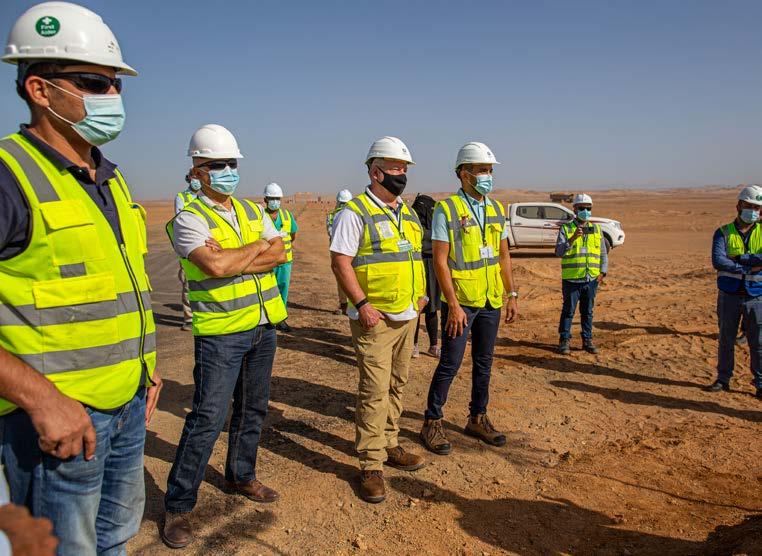
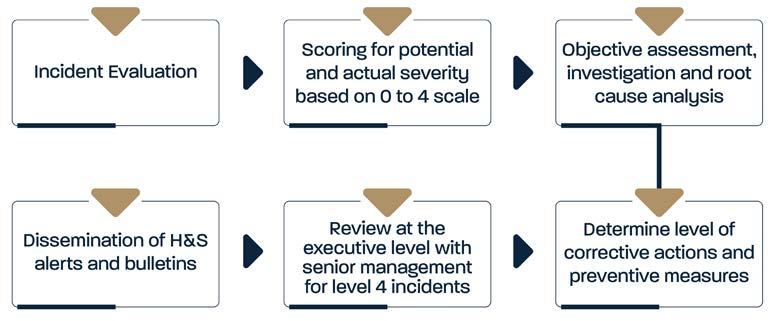
Number of employees and other workers covered by an externally certified system: 2019: 1,456; 2020: 4,742; 2021: 12,892
100% of employees and contractors are covered by an externally certified system
115 RSG Sustainability Report 2021
Our 2021 performance 95 No. of Life Crucial Audits Target 24 179 No. of Emergency Drills Target 40 1,330 No. of Weekly Score Card Assessments Target 675 6 No. of H&S Executive Walks Target 4 369 Near Miss Reporting Target 150
1. Near miss: An incident that had the potential to cause harm to people or property but did not (e.g., someone slips on a slippery walkway, but does not get injured).
Number of Lost Time work-related Injuries and Lost Time Incident Rate (LTIR)
0
Lost Time Incident (excluding fatalities)
Number Units: Rate Zero fatalities as a result of work-related ill-health for all employees and contractors in 2019, 2020 and 2021 Zero recorded cases of workrelated ill-health for all employees and contractors in 2019, 2020 and 2021 1,424,915 7,894,161 25,921,886 2020 2019 2021
Work-related injuries for all workers who are not employees but whose work and/or workplace is controlled by RSG
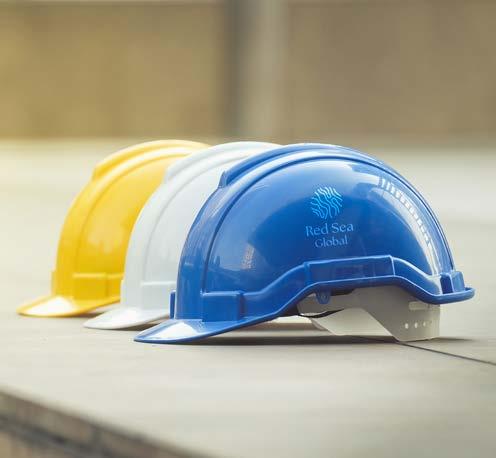
Moreover, there were other incidents of motor vehicle accidents, slips, falls and finger injuries and other work-related injuries that contributed to our lost time, restricted work and recordable case statistics.
1. Lost Time Incident (LTI): A work-related injury or illness that involves one or more days away from work (excluding the day of injury or onset of Illness).
2. LTIR = No. of LTIs x 200,000/Total no. of hours worked
3. TRIR = (No. of fatalities + LTIs + Restricted Workday Case + Medical Treatment Cases) x 200,000/Total no. of hours worked
116 RSG Sustainability Report 2021
2
0.21
2021
2 Number of recordable injuries and Total Recordable Incident Rate (TRIR) 2020 2019 0 0 0.33
2021 0.21
2020 2019 1 2
0 0.16
Hours
1,894,280 624,128 1,217,896 2020 2019
2 28 2 0.05 0.22 0.28 2020 2019 2021
Work-related ill health 1 0 0 2020 2019 2021 Hours worked
Zero fatalities as a result of work-related injury in 2019, 2020 and 2021
worked
2021 Lost Time Incident (excluding fatalities)
Fatalities as a result of work-related injury
2021 2 2 2020 2019 0 0 0.33 0.21
Number of recordable injuries and Total Recordable Incident Rate (TRIR)
Despite our unwavering focus on health and safety, we regret to report a motor vehicle accident on one of our construction sites resulted in a fatality with one of our contractors in 2021. The contractor’s driver succumbed to the injuries he sustained during the accident.
Following this incident, we have re-examined our road safety practices, and we will reinforce them through educational campaigns on safe driving and through practical demonstrations. We will also implement handheld speed devices and cameras and a points-based system to enforce compliance with driving rules as well as to strengthen our onsite Road Safety and Security teams.
We are continuously looking for ways to improve and provide a safe and healthy work environment. In 2021, we adopted multiple H&S initiatives:
Upgrading our H&S data management system
Replacing the current manual process with an advanced system that combines process automation with data visualization to streamline our environment, health and safety data management system.
Center of excellence
• Establishing H&S training department
• Upskilling of the H&S and project teams
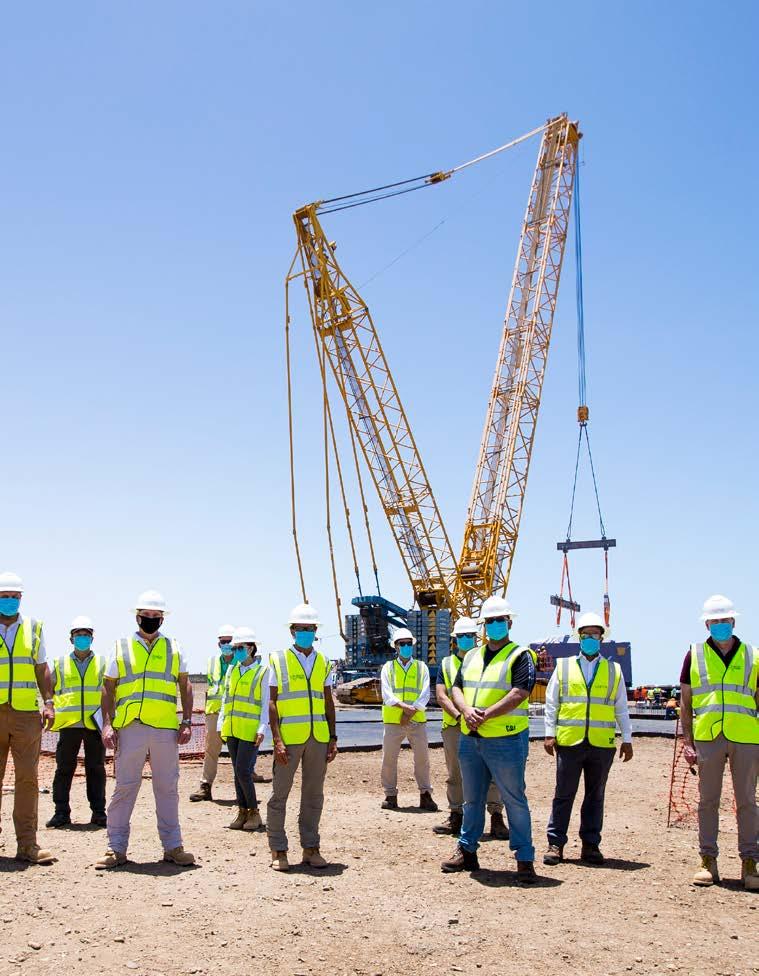
• Establishing a library of life crucial training modules
• Developing a library of training courses targeting our employees and contractors
Improved KPIs
• Establishing a KPI validation and verification process to ensure the accuracy of KPI data and analysis
Enhancement of existing emergency response and patient care network
• Construction of a central medical facility
• Establishing a 24/7 dedicated emergency response call center
• A site-based fire station and emergency response crew
• Localized site based medical clinics
• Helicopter medivac service
• Scenario testing through tabletop exercises
Programs to improve driver behavior management
• Black points-based system strictly enforced through onsite road safety and security teams
• Use of handheld speed devices and cameras to capture unsafe driving behaviors
• Educational campaigns using practical demos to reinforce safe driving
Enhancement of
H&S
governance structure
• Expansion of department’s scope to include oversight and management of all the company’s operational assets including:
• H&S administrative function
• Dedicated H&S training and development function
• Dedicated H&S in design function
117 RSG Sustainability Report 2021
Protecting our people during the COVID-19 pandemic
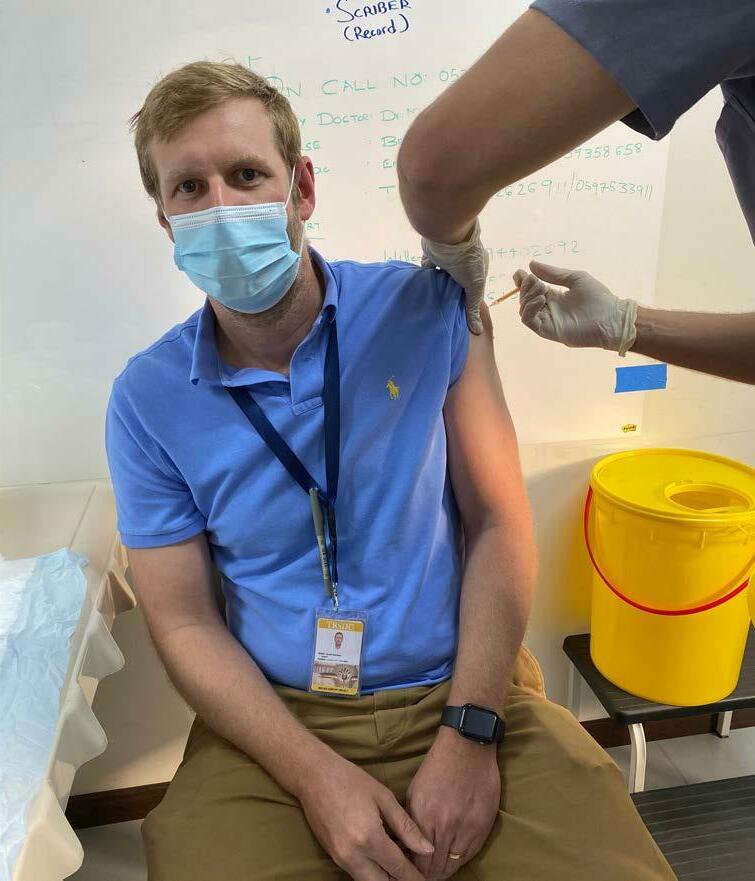
Preventive measures: As the COVID-19 pandemic extended into 2021, we continued our preventive programs targeting our employees and their families, which included the COVID-19 pandemic protocols and preventive measures, inspections and audits, mitigations and contingency plans as well as awareness and communications programs.
Vaccinations: We collaborated closely with the Ministry of Health (MOH) to have an onsite vaccination center for our employees and contractors, where vaccines are stored and administered by our on-site medical professionals.
PCR screening: We established on-site PCR screening at the project site and daily runs to the laboratory in Jeddah to ensure 24-hour turnaround results. Our medical partner ISOS performed PCR screening on employees returning from overseas travel as well as employees traveling to international destinations. The MOH receives the results as well as a HESN number, which is a comprehensive and flexible system that can accommodate all Saudi Public Health Programs and ensures the integrated Public Health Information System (PHIS) updates. We provided free PCR screening at the project site for our employees traveling internationally from the site. We continue to provide this service for free to our international travelers.
Number of first doses administered 2,738
10,862
Total number of vaccinations administered
Number of boosters administered 6,429
Number of second doses administered 1,695
100% COVID-19 vaccination across all contractors and RSG staff on site including free flu shots
We were awarded the "Excellence in Health and Employee Safety award" by Big Project Middle East Awards in recognition of our new standards and duty of care procedures to preserve the health and well-being of all our workers and employees.
118 RSG Sustainability Report 2021
Facilitating health care access for our employees
International SOS provides our employees and contractors with medical services spanning primary care, emergency medical services, and occupational health and wellness services.
Primary care
• Care for acute illness and injury
• Primary care monitoring of chronic diseases with the ability to refer to an appropriate local medical facility (for specialty care for chronic medical conditions)

• Inpatient observation for up to 24 hours Medical cases that require inpatient care for more than 24 hours or specialist care will be referred and evacuated to the appropriate medical facility.
Occupational health and wellness services
• Pre-employment examination
• Periodical examination
• Exit medical examination
• Access to health and wellness services
Medical facilities
• A central medical facility within our construction village housing complex was opened this year to provide primary and emergency healthcare services for our workforce.
• Medical services will be provided at remote sites via mobile containerized facilities that can be relocated as construction progresses.
• A network of smaller clinics on the islands will operate with the facility in the Coastal Village to respond to medical emergencies and offer basic healthcare services across the area.
• Besides the medical facilities and clinics that were established for our employees and contractors, we plan to expand our healthcare strategy for customers and will be building a new hospital in the Coastal Village area to provide medical care for our community of 14,000 employees and visitors.
119 RSG Sustainability Report 2021
Supporting the local community
We recognize the importance of strengthening and empowering our local communities as an integral part of our sustainability ambitions. Our social development initiatives are forged in line with Vision 2030 and are geared towards the community residing around The Red Sea Project area.
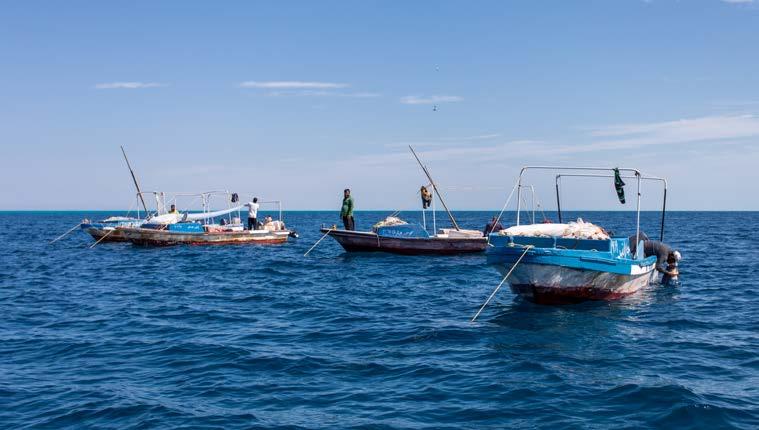
Our community engagement strategy
Our ambition is to make a significant positive social impact on the local community through our three strategic pillars:
Our socioeconomic impact assessment
We are committed to providing positive social impact around the communities where our operations are located. But first, we need to understand the potential positive or negative impacts of our activities. Therefore, we collaborated with Tabuk University to conduct socioeconomic and cultural baseline surveys to better understand the social and economic environment surrounding The Red Sea Project location. The assessment aimed to identify potential social and economic sensitivities, as well as the positive and negative impacts associated with our development activities. This will enable us to focus on opportunities to enhance our positive impact, and define actions to prevent, mitigate or remediate negative impacts.
To aid us in gathering the correct information on the local community, we leverage on publicly available reports in our assessments such as:
• Desktop research reports
• Fisheries report
Socioeconomic empowerment Community engagement
Socio-cultural values preservation
Our newly established Social Development Department
In 2021, we established a standalone Social Development Department to conceptualize and implement social transformation initiatives for our local communities. The newly established department is responsible to:
• Develop and update the social development strategy and policy.
• Coordinate and monitor the development and delivery of social development projects in alignment with national and international standards and guidelines.
• Review the ESIA to identify, prevent, mitigate or remediate potential negative impacts from our operations.
• Bridge community priorities and the destination's current and future needs by:
• Developing sustainable programs to raise awareness of local community on topics that can bring positive impact to their livelihood.
• Preserving and activating socio-cultural values by focusing on intangible culture and heritage.
• The Red Sea Zone Authority report
• Cultural reports
• Socioeconomic reports
120 RSG Sustainability Report 2021
Building strong partnerships
Building solid and mutually beneficial relationships with the community requires fostering and growing partnerships with stakeholders from public and private sectors who are aligned with our mission. Through these collaborations, we can draw on synergies to achieve better societal outcomes.
Red Sea Thrive
In collaboration with the National Center for the Development of Vegetation Cover under the MEWA, Umluj Municipality, Tabuk University, and local volunteer groups, we started a planting initiative to commemorate International Volunteer Day for Economic and Social Development on 5 December 2021. This initiative aims to raise awareness among the community about biodiversity and the importance of improving vegetation.
MoU with Ethmar and Ghoroos
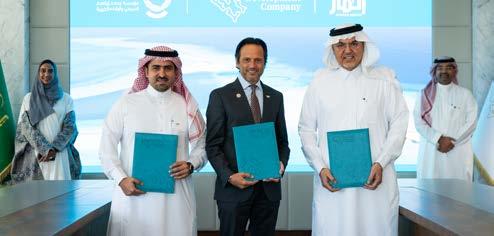
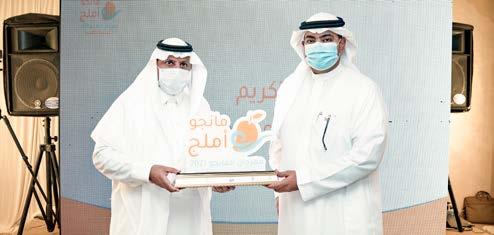
We signed an MoU with social investment company Ethmar and private foundation Ghoroos to co-develop socioeconomic opportunities for the local community. Through this partnership, we will assess opportunities for agricultural growth in the area of The Red Sea Project while encouraging volunteering and community service initiatives.
200 student volunteers from Tabuk University participated in the planting campaign at Umluj Southern Park.
Career fair
We hosted a two-day event to connect local job seekers with five contractors in the projects including Umluj and Alwajah: Acwa Power, AlKefah, Almajal Alarabi, AlBawani, and our own Turtle Bay Hotel.
Around 2,400 individuals were screened out of the field before leading to the event.
342 hires were offered roles from the two-day career event.
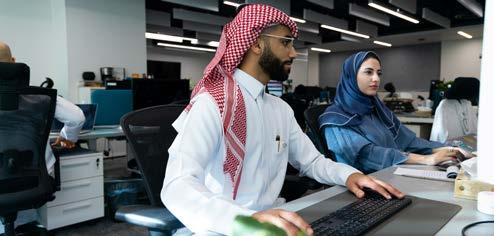
Hiring employees from the local communities
We have recruited 39 professionals from the local community surrounding The Red Sea Project. They were offered diverse roles in navigation, security, gardening, L&D, marketing, logistics, project coordination, administration and more.
National committee representation
We were appointed to the newly formed Prince Fahad bin Sultan Chair Committee. The Committee’s mission is to increase youth’s participation in realizing the goals of Vision 2030 through various academic and skills development programs. We were involved in multiple discussions with other participating members to identify opportunities for socio-cultural initiatives and publicprivate partnerships to elevate the role and contribution of Saudi youth in the realization of Vision 2030.
Engaging with local communities
We have carried out multiple engagement activities, to have a deeper understanding of the needs of local communities. By reaching out to remote areas and listening to people in these communities on the ground, we can make informed decisions about programs to focus on.
Unveiling local heritage
We conducted archeological surveys within The Red Sea Project’s boundaries and discovered multiple archeological sites. These sites were mapped into our GIS database and were ranked according to their importance and sensitivity.
39 professionals were hired from the local community
121 RSG Sustainability Report 2021
Contributing to economic diversification and growth
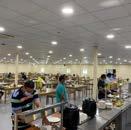
Through The Red Sea Project, we have a unique opportunity to contribute to Vision 2030. By establishing a world-class destination, we are creating an environment that attracts tourists to the KSA, contributes to economic diversification, and creates new jobs in tourism, hospitality and recreation, particularly in the area of the Red Sea coastline.
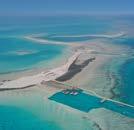
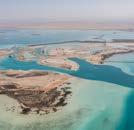
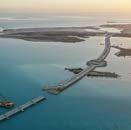
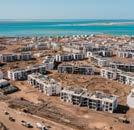
Already, we are contributing to the growth of the construction sector. To date, we have signed more than 770 contracts with world-class companies, with a total value of SAR18.4b. Moreover 70% of the value of all construction contracts have been awarded to local companies.
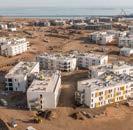
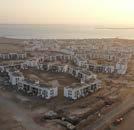
Key contracts awarded
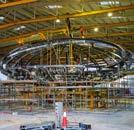
Our potential economic impacts
Total jobs: 70,000 (Direct, indirect and induced)
GDP contribution (During construction) ~US$27b
GDP contribution (Steady state) ~ US$6b
770+
World-class partnerships contracts awarded to world-class companies from 29 countries.
SAR18.4 billion
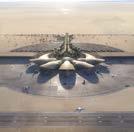
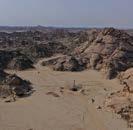
value of awarded contracts to date.
70%
of the value of all construction contracts awarded to local companies.
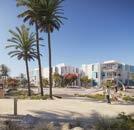
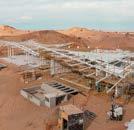
Our main suppliers comprise of vendors, manufacturers, contractors, sub-contractors, and other service providers across several services including civil, infrastructure, mechanical, electrical and plumbing, extra low voltage systems, building envelope, façade, fit out, landscaping, swimming pools, kitchen and laundry, and vertical transportation systems. Together, they represent more than 80% of our spend on suppliers.
In 2021, we observed a 170% increase in our supplier base from 2020 as we awarded a large number of new contracts to support the continued expansion in our operations.
122 RSG Sustainability Report 2021
Village Workers’ Accommodation Z-types
Coastal Village Studio Apartments Hotel 10 (Sheybarah South) OSM Shell & Core Hotel 14 (Southern Dunes) Civil/Structure + Façade/ Waterproofing Works
Village Utilities
Infrastructure
Hotel 13 (Desert Rock) Site-wide Infrastructure & MEP Works Shura Bridge (Design &
Village Facilities Management Services Shura Island - Dredging and Stockpiling Works
Village
Islands
Roads
Coastal
(Design & Build)
Coastal
&
(Design & Build)
Build) Coastal
Airport - Specialist Communication, Navigational & Surveillance Systems and Equipment (Design, Validation, Supply, Installation and Testing & Commissioning) Coastal
- Public Realm & Landscaping (Design & Build) Mono
Piling, Foundations, Haul
& Access Platforms
A growing portfolio
When we first envisioned RSG as an agent for change, we were undoubtedly aiming high. We knew our plans were ambitious and we knew we could pave the way for an incredible transformation in Saudi Arabia and beyond. It is the groundbreaking work of our people in bringing The Red Sea Project to life that has led to us attaining new projects, and setting our sights on transformative change that is beneficial for the entire world. Finding inspiration in the resilience of the Red Sea corals that surround our sites, our dedicated team, partners, and stakeholders have made tremendous progress in 2021. But our ambitions are also growing, our mandate and portfolio will be expanding in 2022 and therefore our socioeconomic contributions will grow in parallel.
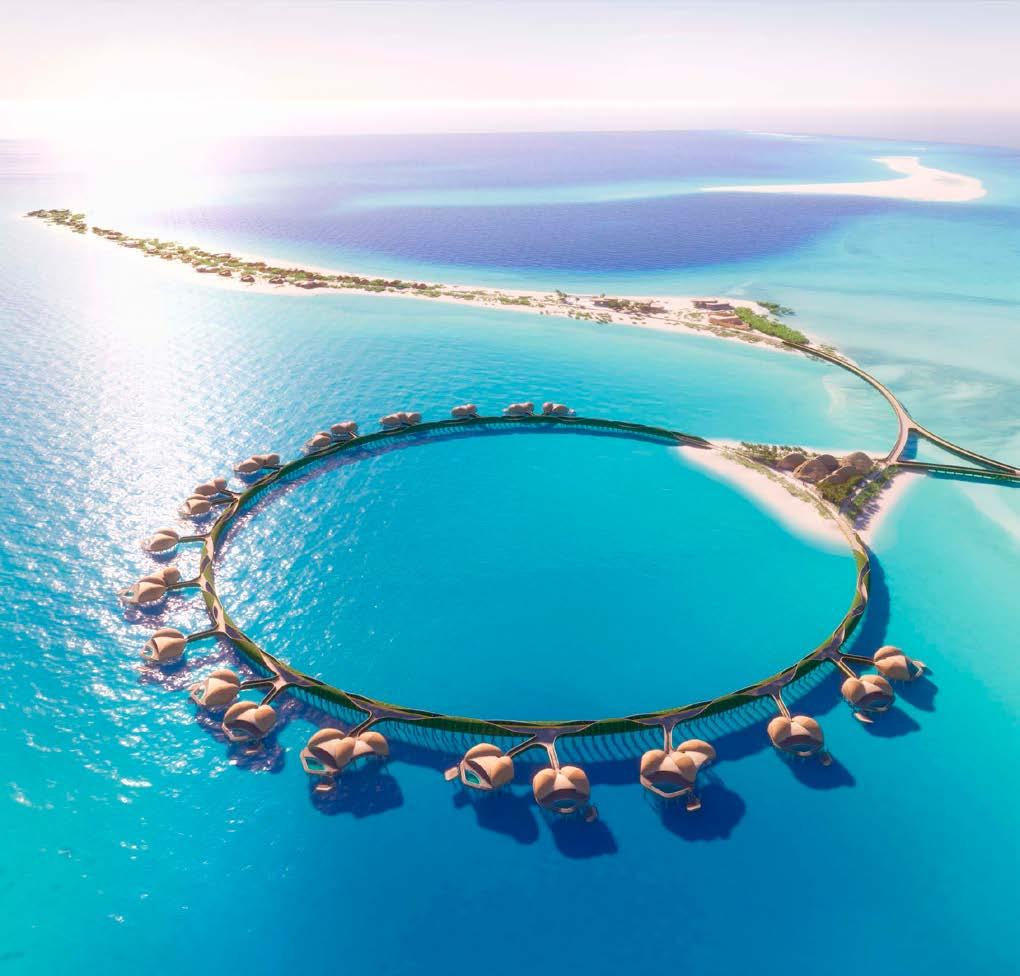
123 RSG Sustainability Report 2021
Financing The Red Sea Project
A SAR14.12b green loan
In 2021, we signed a SAR14.12b (US$3.76b) Phase 1 Debt Financing (“Green Financing”) consisting of a term loan and revolving credit facility with four leading Saudi banks. We also successfully achieved financial close. Banque Saudi Fransi, Riyad Bank, Saudi British Bank and Saudi National Bank acted as Mandated Lead Arrangers. A significant milestone, The Red Sea Project’s initial phase capital structure is fully secured and by receiving material support from major financial institutions, The Red Sea Project is afforded a heightened level of credibility.
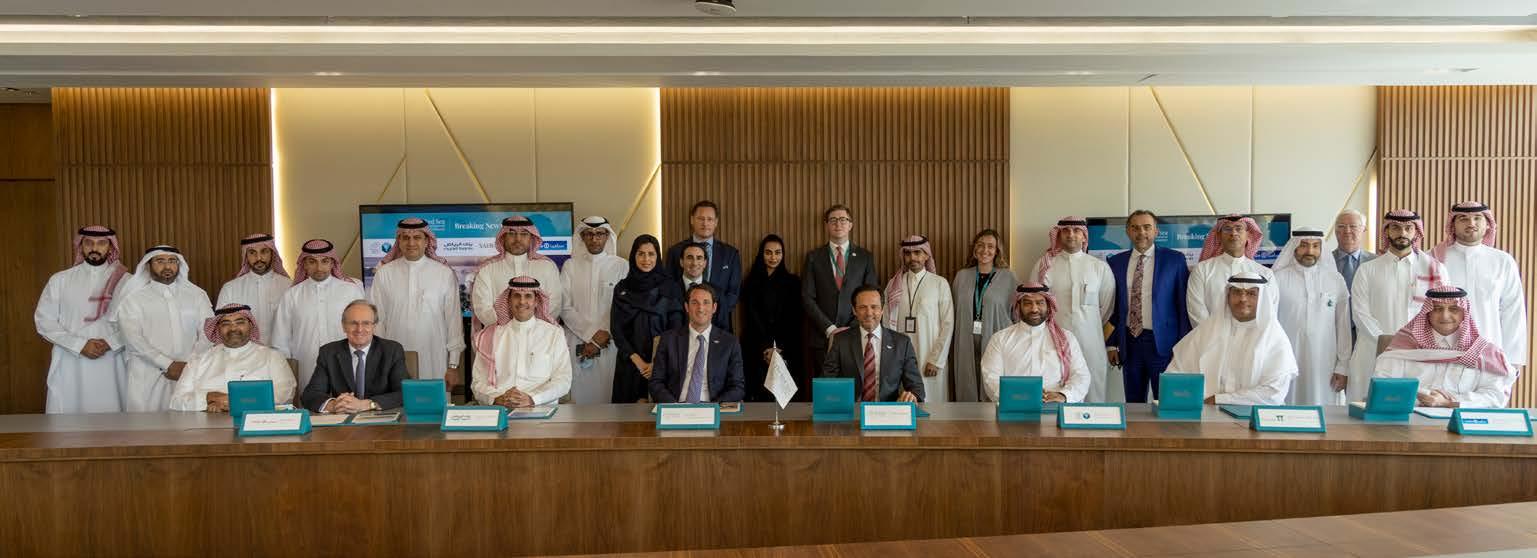
We are pleased to have swiftly achieved Financial Close on the first ever Riyal-denominated Green Financing for our initial phase. With this milestone reached, our project gains additional credibility in the market and enhances the attractiveness to investors, underpinned by the recent acknowledgement of winning the Project Finance Deal of the Year in the Capital Markets Saudi Arabia Awards.
Jay Rosen Group Chief Financial Officer

124 RSG Sustainability Report 2021
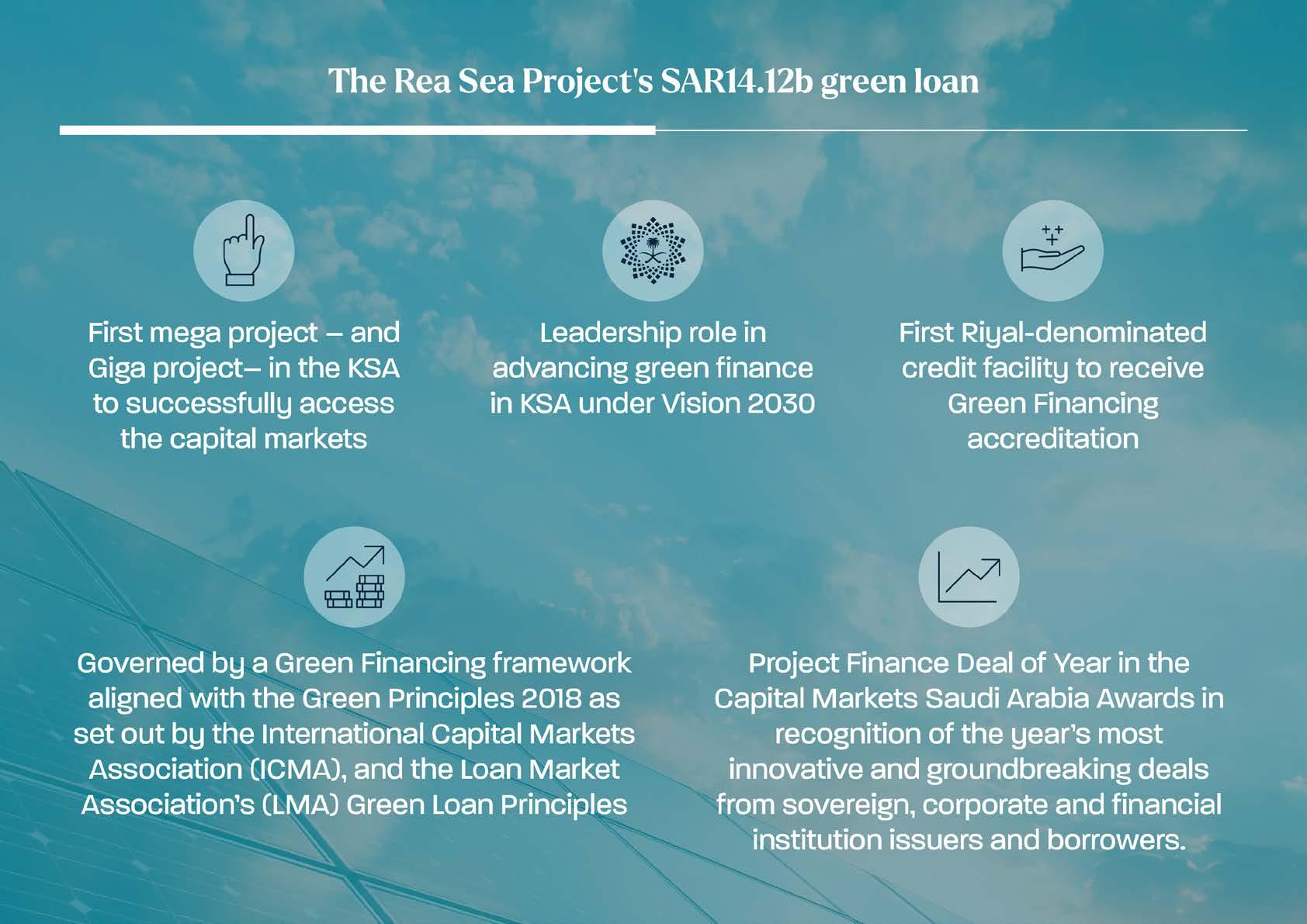
Positioning Saudi Arabia on the global tourism map
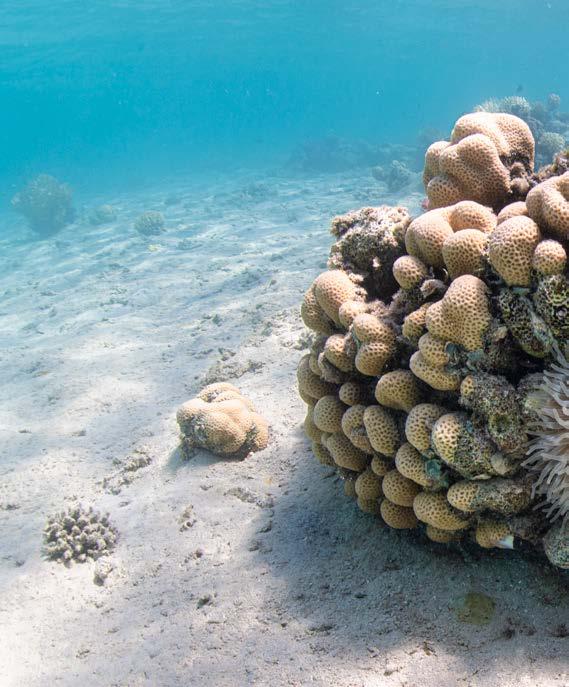





RSG’s vision is one that needs to be shared. The work we are doing leads the global tourism conversation on sustainability, regeneration, climate change, ecological crisis, luxury tourism and the economy. In doing so, it positions Saudi Arabia as a center of breathtaking beauty, innovation and excellence.
As we unveil our destinations, we are forging fresh, meaningful connections with a new generation of discerning travelers. That gives us an incredible opportunity to broadcast all the very best values of a modern Saudi Arabia and place the Kingdom squarely on the tourism map.
In 2021, we shared our vision with 172 countries, a global reach of 2.24 billion (up 400% on our 2020 reach). Informing and educating the public on the relevance and value of our proposition is critical for RSG’s success of this kind of regenerative work in the future.







126 RSG Sustainability Report 2021
Countries Reached 2.24B Reach 400% 60.4M Engagements 78% 545,988 Followers 49% 132,445 Digital Mentions 67%
Tracy Lanza Group Head of Marketing and Communication
As seen from space
Astronaut Shane Kimbrough knows how small and fragile our world is when seen from space. His tweet, which reached 6 million people, comparing our archipelago to the Bahamas, reminded us that our project is special, not only because of its intrinsic beauty, but also because it is a world-changing, conservation altering, and groundbreaking innovation.
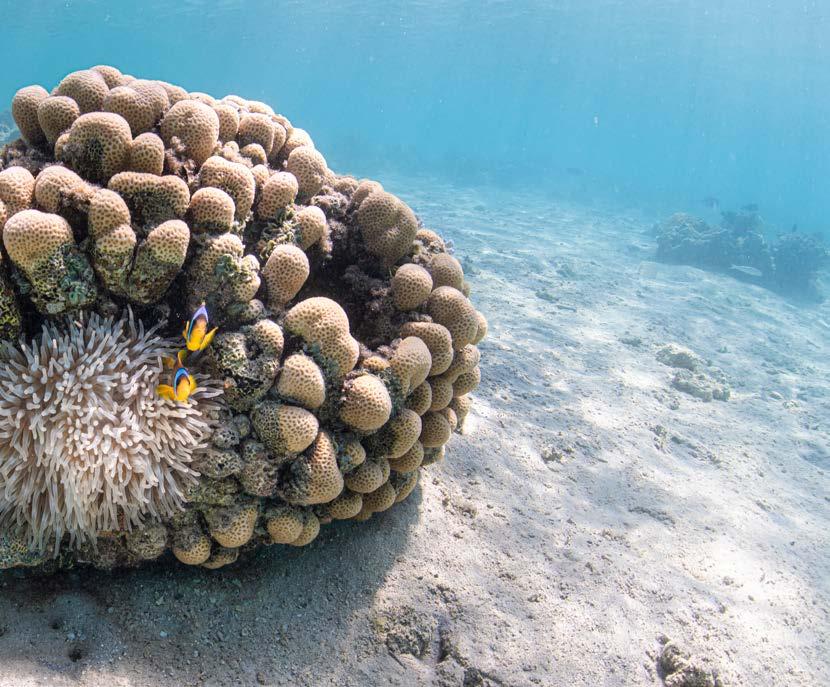
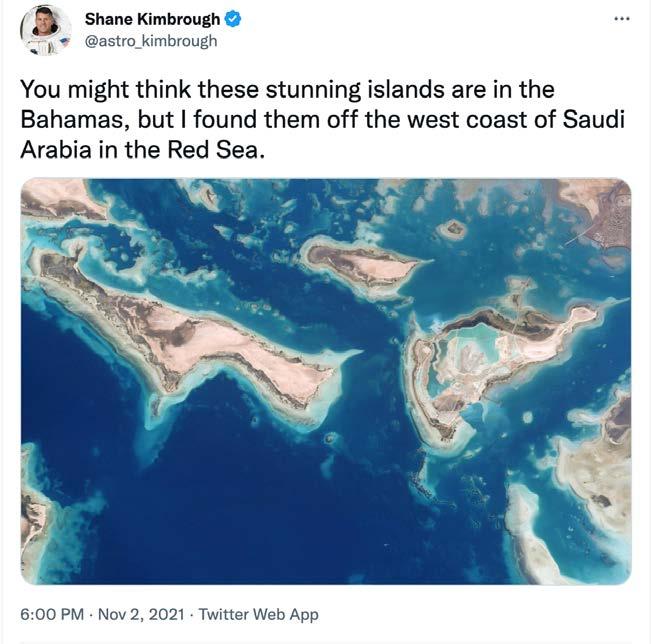
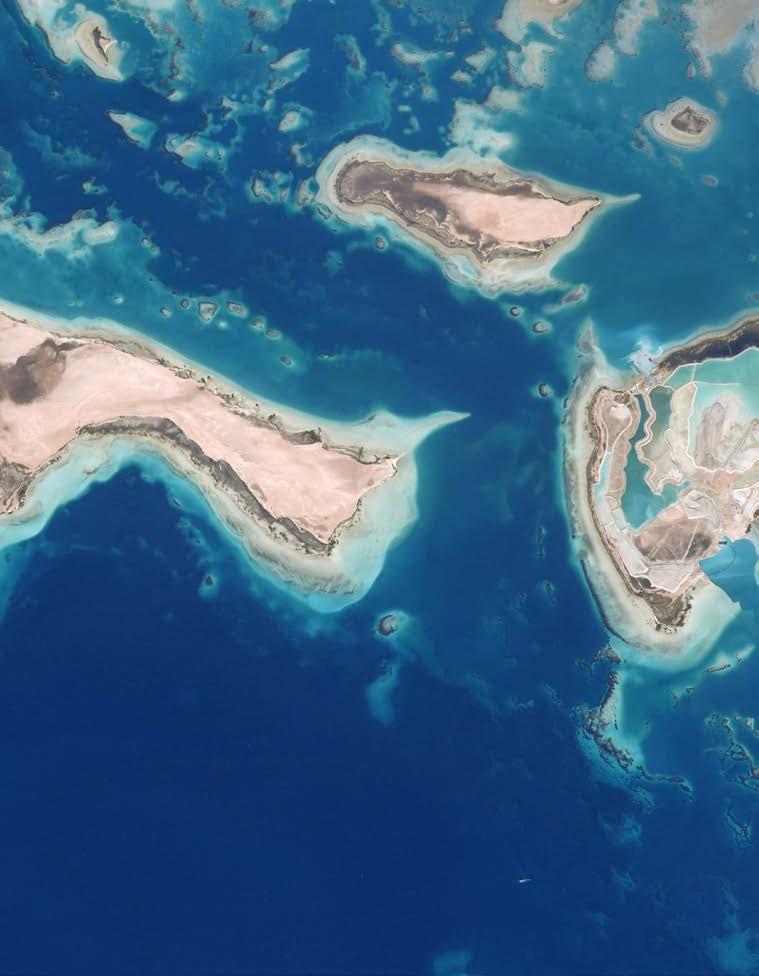
6M Reach
127 RSG Sustainability Report 2021
Delivering an unrivaled visitor experience

With a picturesque environment, unique designs, luxury and comfort, world-class hospitality brands, culture and adventure, The Red Sea Project is being developed to deliver an exquisite visitor experience, one where beauty, luxury, comfort and culture come together, and where nature is celebrated, protected and regenerated.
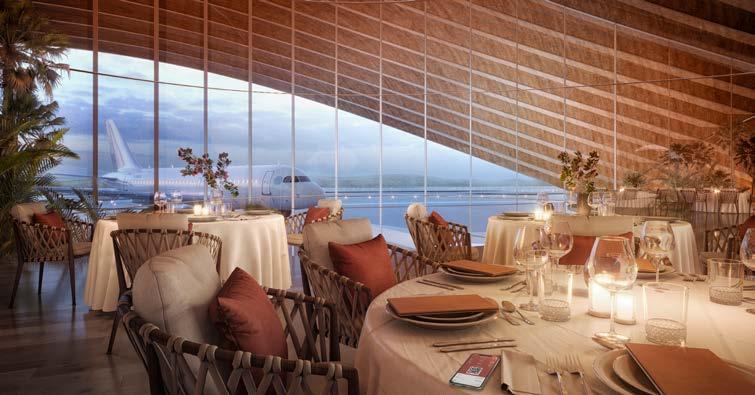
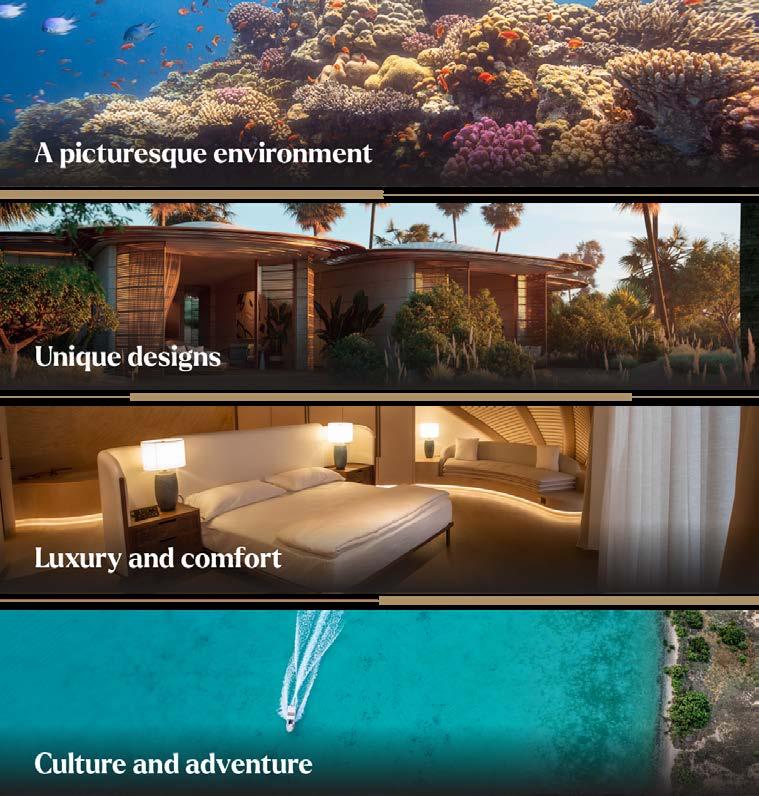
World-class
128 RSG Sustainability Report 2021
240 keys 200 keys 170 keys 430 keys 150 keys 90 keys 200 keys 210 keys 76 keys
hospitality
brands
Our smart destination
We are developing The Red Sea Project as a smart destination by harnessing the power of technology. Our portfolio of 52 smart services spans 12 domains, such as smart mobility, smart utilities, smart administration, smart healthcare, and smart buildings. Our smart services can be grouped in four categories:
Exceptional tourist experience
Elevated living standards
Environmental and natural resource preservation
Optimization of city operations
The smart workforce locator
We have developed a network of smart wearable technology and wireless tagging solutions for our construction workforce and our fleet of vehicles at The Red Sea Project. This is one of the largest deployments of Low Power Wide Area Networking communication protocols (LoRA WAN) based Internet-of-Things (IoT) networks in the world and the largest in KSA. This IoT network is designed by keeping in mind multiple use cases such as providing the backbone infrastructure for the outdoor environmental sensors across the destination, integrating thousands of sensors and devices to The Red Sea Project platform, enabling plug-and-play onboarding of devices, and others.
We want to solve the global issues that define today. Therefore, we are deploying advanced technologies to deliver digitally smart destinations, enable state-of-the-art environmental monitoring, and create customer experiences of the future.
Nicolas King Group Chief Development Officer

An award-winning network
Smart Project of the Year Award at the 2021 Big Project Awards
Construction Area
Our smart workforce locator comprises a network covering: Vehicles +3K
3.5m sqm Workers +36K
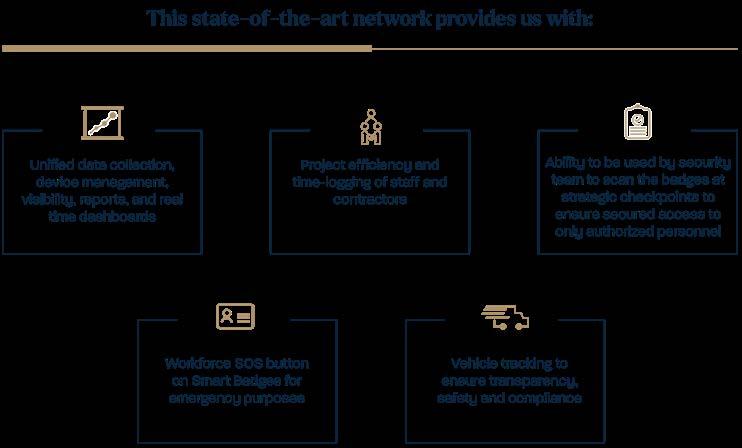
129 RSG Sustainability Report 2021
Virtual Reality
In collaboration with the Building Information Management (BIM) Digital Delivery team, we developed Virtual Reality walkthroughs of specific assets with The Red Sea Project BIM data. Using Virtual Reality glasses for improving hotel interior design and experience, the architectural team delivered successful Proof of Concept on some of the assets.
Smart Weather
We installed Cumulocity (an IoT Platform), connecting three weather stations, integrating environmental monitoring equipment to visualize and generate insights onsite. Full integration is expected to be in 2022.
Partnering to further advance technology
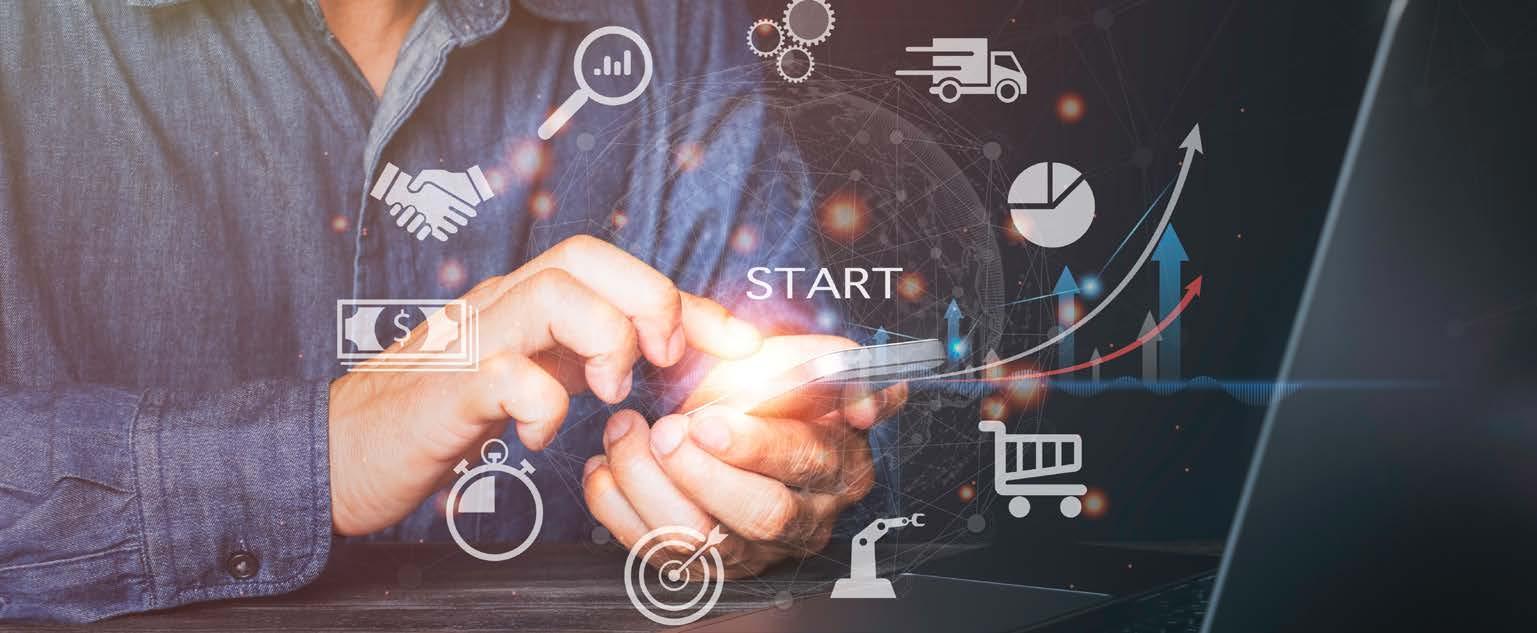
We are engaging with multiple external agencies to tap into synergies and build longterm trusted relationships.
• King Fahd University of Petroleum and Minerals (KFUPM)
• Communications and Information Technology Commission (CITC)
• Fintech Saudi
• King Saud University (KSU)
• Mohammed bin Salman Foundation (MISK Foundation)
130 RSG Sustainability Report 2021
Looking ahead
Driven by our ambition to become a world-leading sustainable luxury tourism destination developer, we are actively working to further grow our organization and elevate our sustainability program.
In the coming year, we will substantially expand our portfolio, and with our organization’s growth, we will continue to increase our focus on sustainability:
For our nation, we will further contribute to economic diversification and growth through the expansion of our portfolio.
For our people, we will further develop our employee engagement and corporate wellness programs.
For our workers, we will advance our occupational health and safety programs through multiple enablement and capacity building initiatives.
For our local communities, we will implement more engagement initiatives and educational programs to further support sustainable development.
For our planet, environmental sustainability will continue to be core to our strategy and we will be implementing world-class programs across our sites.
While working for people and planet, we will continue to pursue international certifications to get an independent perspective on our performance. Transparency to our stakeholders is key; we are committed to continue reporting to our external stakeholders on our sustainability goals and performance.
Sustainability is the most defining issue of our time. It is a journey that we have started with RSG and that we continue to be committed to. It is core to our corporate vision. It is our DNA.
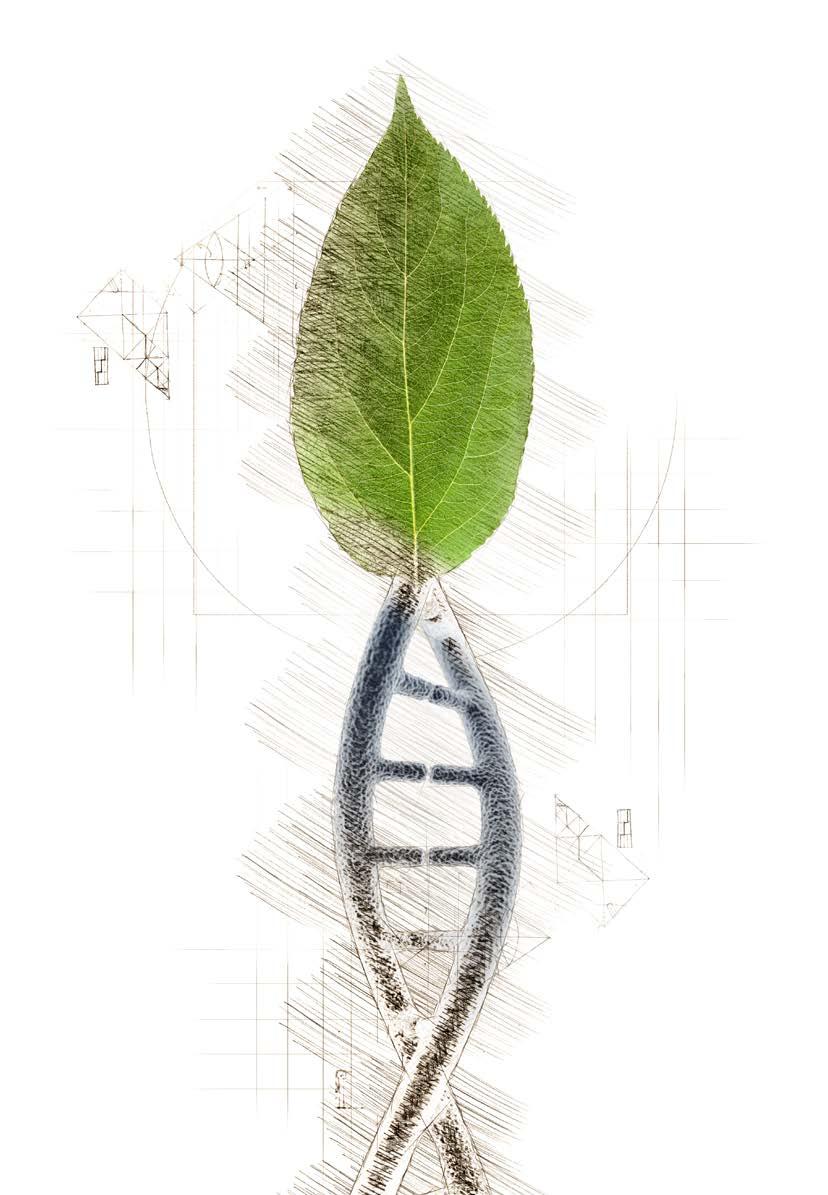
“Sustainability, it is our DNA”
John
Pagano Group Chief Executive Officer
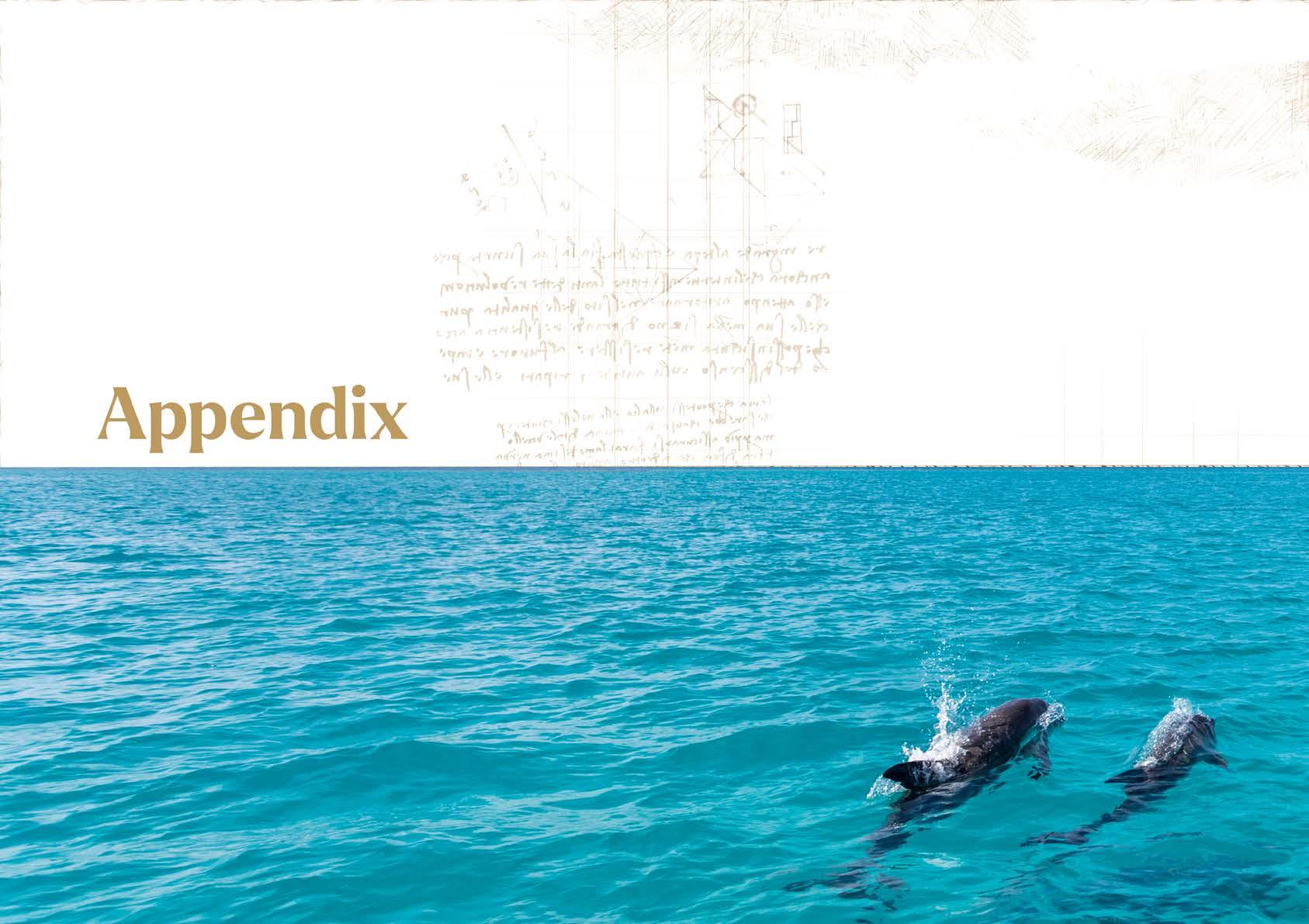
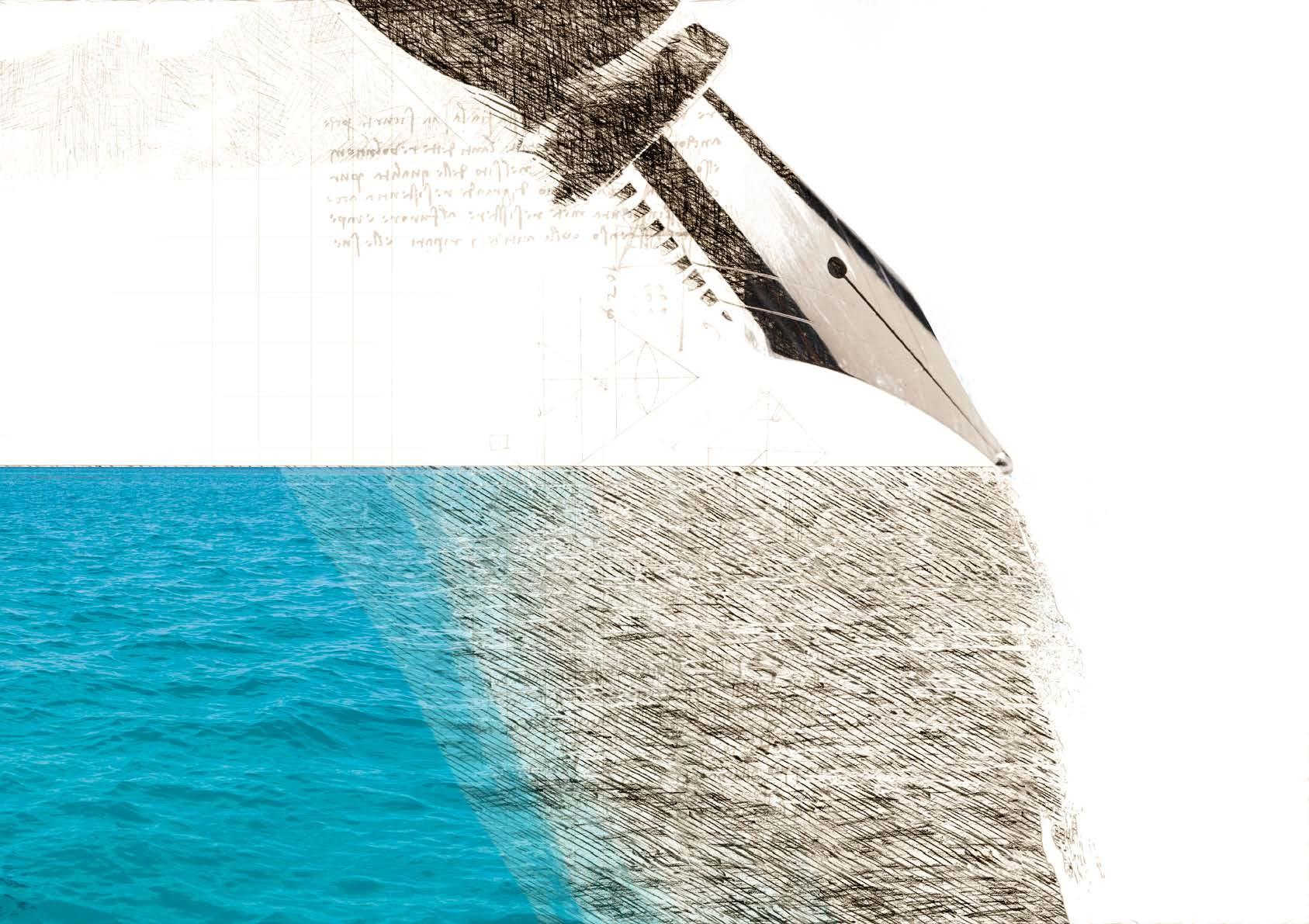
Through the Marine Spatial Planning Study, we identified multiple habitats in The Red Sea Project area:
Marine biomes
• The outer reef that lies on the outside of the lagoon, with moderate to very steep sloping walls, often reaching deeper than 20 m. Large marine fauna such as sharks, eagle-rays, sea turtles, Napoleon wrasses and large trevallies are observed more frequently along the outer reef than inside the lagoon.
• The inner reef that is generally shallower than the outer reef, mostly consisting of moderate to low sloping coral reefs and sandy-muddy bottom, and extensive seagrass beds on its southern side. Ecological communities on the inner reef are characterized by moderate fish diversity and abundance.
• The northeast lagoon, generally shallow and closer to shore, is characterized by sandymuddy bottom, coral rubble, and only few sparse live corals and seagrass patches.
• The southeast lagoon, with numerous scattered coral colonies (though sometimes dense). Moreover, sponges are a dominant structural component and seagrasses are sparse in abundance and scattered in distribution. Each of these habitats is important for sea turtles found in the area.
Marine habitats
• Reef walls: Inside the Al Wajh lagoon, they are home to important accumulations of fish and are one of the most productive habitats in the project area.
• Fore reefs: They typically have very high coral cover and therefore support biodiverse communities.
• Windward reef crests: They are among the most diverse, and most environmentally sensitive habitats. They are typically located between the reef slope or reef wall and the reef flats, often found in very shallow water.
• Patch reefs: They are well-defined biodiversity hotspots, usually embedded in a sandy or rocky substrate. They are often home to large schools of fish.
• Dense coral assemblages: They are dominated by branching corals of various Acropora species. These tend to form in shallow and turbulent waters in tidal passes and are widely distributed adjacent to the reef wall.
• Sparse coral assemblages: They occur in sandy or rocky areas where no large or extensive reef systems are developed and can be found in or adjacent to almost any other habitat. Commonly, these assemblages can be highly biodiverse and therefore represent important resources. Near the mainland, sparse coral assemblages are frequently dominated by various branching Acropora coral species.
• Fringing reefs: They develop as a nearly continuous fringe of coral growth and hard structure around, or along, virtually all islands and most of the mainland coastline. The coral communities found on fringing reefs vary greatly, depending on their exposure to wind and waves, and their nearshore versus offshore position.
• Reef flats: They can be dominated by coral, rubble, or algae. In coral dominated reefs flats, live coral cover and diversity can be high, especially on the seaward edges of reef flats.
• Seagrass meadows: Most seagrass habitats are located along the outer perimeter of the lagoon. One of the largest continuous areas of seagrass habitat occurs in the southern project area, outside of the lagoon. The species present within Al Wajh lagoon are Halophila stipulacea and Thalassia hemprichii.
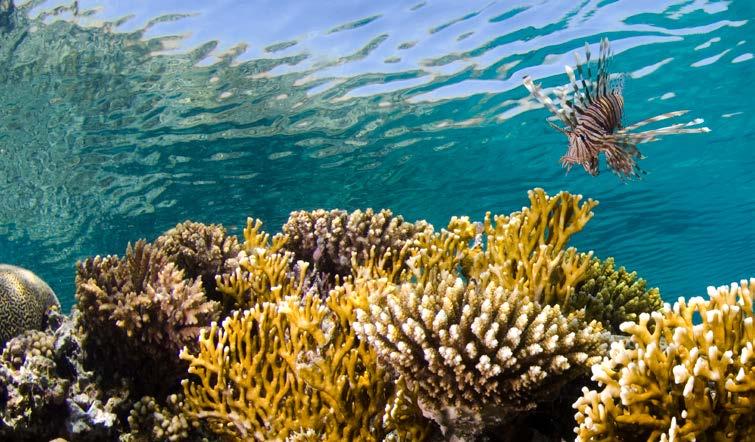
135 RSG Sustainability Report 2021
Intertidal habitats (Mangrove and Sabkha)
The Red Sea Project also includes intertidal habitats consisting of grey and red mangroves and sabkhas along the shorelines of the islands. Mangroves provide a suite of ecological functions and services in coastal environments, including shoreline protection, water quality improvement, provision of wildlife and fisheries habitat, and global carbon storage.
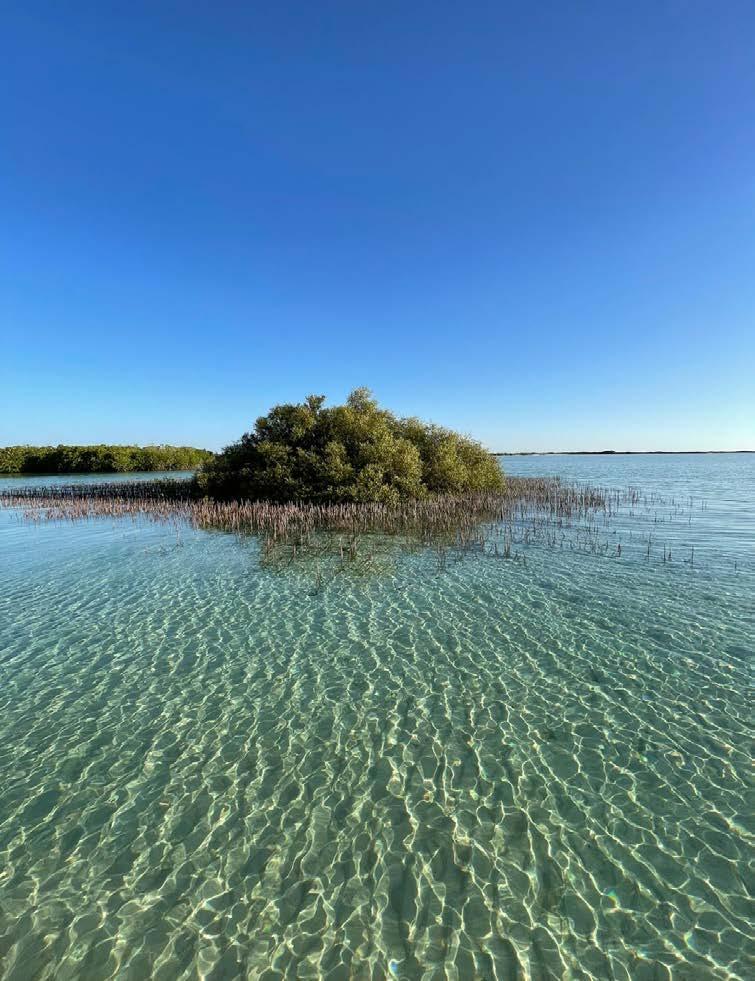
Sabkha is an upper intertidal to supratidal flat influenced by periodic flooding with sea water, often by wind-driven extreme high tides. Also known as salt flats, they may often include blue-green algal mats on their surface and scattered halophytic (salt-tolerant) plants, including chenopods.
Sea turtle habitats
On sandy beaches, nesting by turtles in the area is predominantly by Hawksbill Turtles (Eretmochelys imbricate, IUCN Critically Endangered), with limited nesting on a few islands by Green Turtles (Chelonia mydas, IUCN Endangered), notably on the islands of AlWaqadi and Breem. Turtle nesting on islands was found to be widespread and fairly ubiquitous with 15 of the islands surveyed showing signs of nesting.
Marine mammals habitats
Marine mammals were seen on three occasions, including two sightings of Indian Ocean Bottlenose Dolphins (Tursiops aduncus) and one sighting of the IUCN Endangered Indian Ocean Humpback Dolphin (Sousa plumbea). Areas of local dugong sightings include the shallow area south of Breem, the waters between AlWaqadi Island and the southern lagoon, the shallow coastal area between Laheq, and the mainland.
136 RSG Sustainability Report 2021
Seabird Nesting Habitats
The Red Sea Project is within an Important Bird Area (IBA) as set out by Birdlife International, and referred to as the Al-Wajh Bank IBA. Nearly all islands can be considered very important nesting habitats, especially when compared with the mainland shoreline, which is generally low in avifauna abundance and species diversity. Four key species are considered to be of restricted geographical range:
• Crab-plover (Dromas ardeola): IUCN category: Least Concern, HCP-1
• Sooty Gull (Larus hemprichii): IUCN category: Least Concern
• White-eyed Gull (Larus leucophthalmus): IUCN category: Near Threatened, HCP-1
• Sooty Falcon (Falco concolor): IUCN category: Vulnerable, HCP-1
Terrestrial habitats
Species diversity is limited, and the percentage cover of vegetation is low. The common species of terrestrial vegetation is Halocnemum strobilaceum, a salt-tolerant plant. There is no Critical Habitat present within the terrestrial biome, however, it supports charismatic bird species which are considered a High Conservation Priority in Saudi Arabia such as Ospreys.
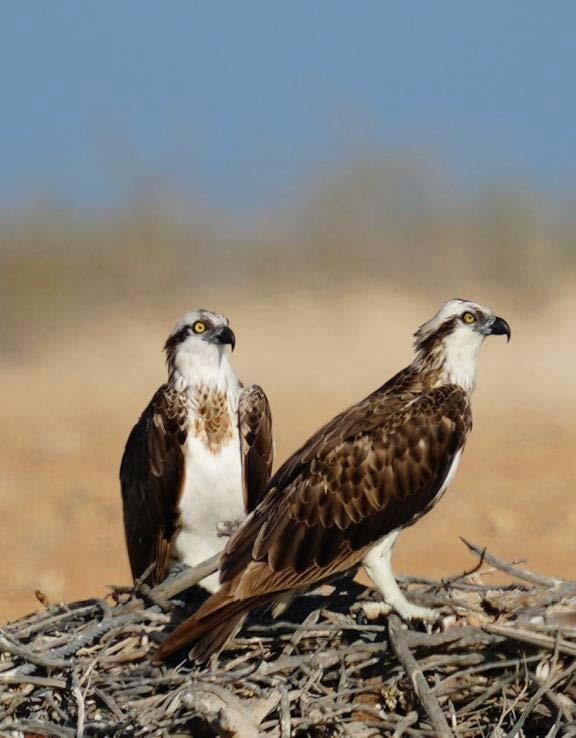
137 RSG Sustainability Report 2021
About this report
This sustainability report presents our sustainability ambitions and targets as well as the environmental, social and economic performance and impacts in 2021. We focus on material topics that were identified in our materiality analysis in 2020 and which remain unchanged in 2021.
The information in this sustainability report pertains to the operations of RSG and The Red Sea Project, unless otherwise indicated. The reporting period corresponds to our financial year, which runs from 1 January to 31 December 2021, unless otherwise stated. This report has been prepared in accordance with the GRI Standards: Core option.
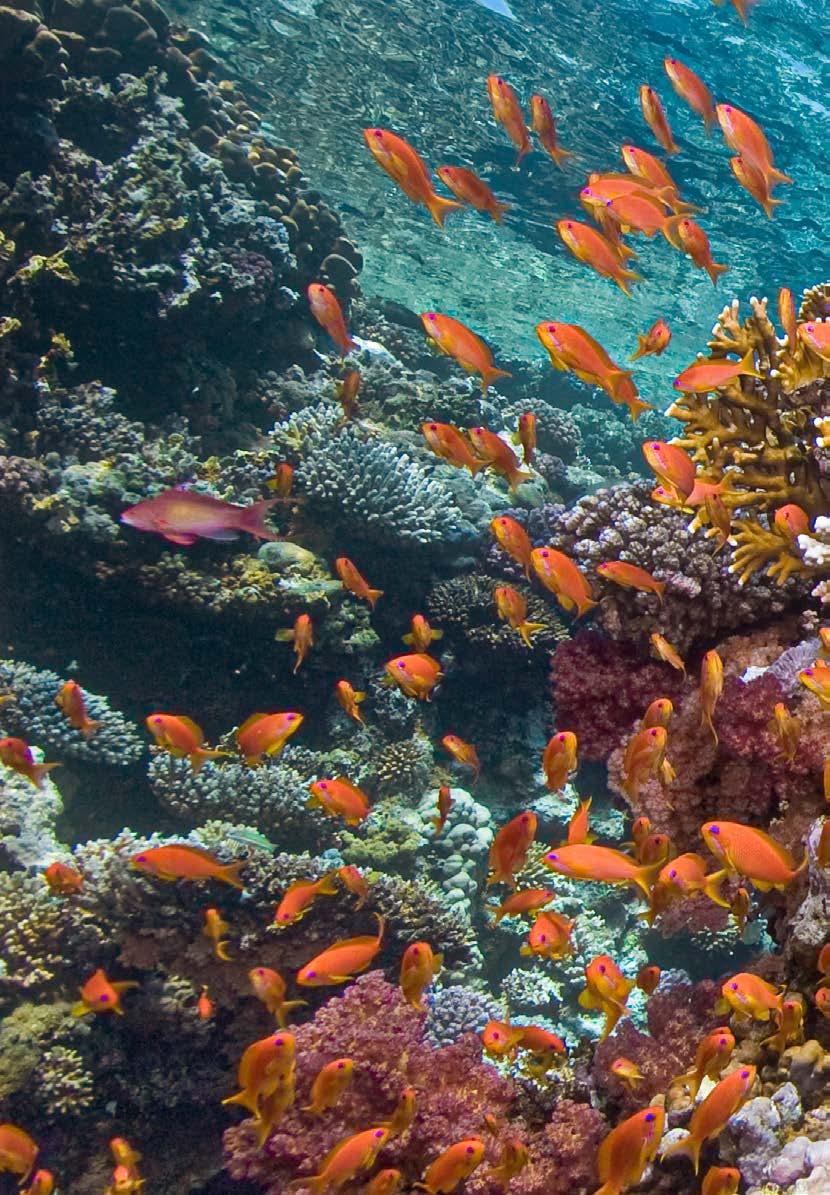
138 RSG Sustainability Report 2021

GRI Content Index

For the Content Index Service, GRI Services reviewed that the GRI content index is clearly presented and the references for all disclosures included align with the appropriate sections in the body of the report.
GRI Standard Disclosure
GRI 101: Foundation 2016
General Disclosures
GRI 102: General
Disclosures 2016
Organizational Profile
Page number(s) and explanation
Reason for omission (if applicable)
102-1 Name of the Organization Red Sea Global (which operated in 2021 with the name The Red Sea Development Company) 102-2 Activities, brands, products, and services 16, 18-20, 22, 128, 129 102-3 Location of headquarters Riyadh, Saudi Arabia 102-4 Location of operations Saudi Arabia 102-5 Ownership and legal form 16 102-6 Markets served 16, 18-20, 126-128 102-7 Scale of the organization 16-17, 18-22, 98, 124, 128 102-8 Information on employees and other workers 98, 102-103, 109-110, 121 102-9 Supply chain 122, 128 102-10 Significant changes to the organization and its supply chain 17, 83, 86, 128 102-11 Precautionary Principle or approach 62, 78-80, 86-87, 89, 93 102-12 External initiatives 36, 40, 45, 55, 124, 125 102-13 Membership of associations 87, 108-110, 130
Strategy
102-14 Statement from senior decision-maker 11, 16, 18, 26 102-15 Key impacts, risks, and opportunities 58-59, 68, 71, 80, 86-87, 93, 99, 122
Ethics and Integrity
102-16 Values, principles, standards, and norms of behavior 37, 45, 47, 49
Our corporate policies are available in English and Arabic and comprise of all the policies listed on page 45. Our code of conduct is communicated to all new joiners, and on an annual basis, we send out communications to provide a reminder on our policies to all employees. Moreover, our policy manuals can be accessed from our intranet along with further information concerning their application and contact persons from the GRC division for any questions.
102-17 Mechanisms for advice and concerns about ethics 46-47, 49, 57, 115
Governance
102-18 Governance structure 26-34, 41-42, 60-61 102-19 Delegating authority 41-42, 60-61 102-20 Executive-level responsibility for economic, environmental, and social topics 34, 60-61, 64
140 RSG Sustainability Report 2021
102-21 Consulting stakeholders on economic, environmental, and social topics 53, 56-57, 60-61 102-23 Chair of the highest governance body 26 102-25 Conflicts of interest 47 102-26 Role of highest governance body in setting purpose, values, and strategy 41-42, 47, 60-61 102-29 Identifying and managing economic, environmental, and social impacts 42, 56, 60-61, 64, 68, 71 102-30 Effectiveness of risk management processes 42, 68-69 102-32 Highest governance body's role in sustainability reporting 53, 60-61, 64. Our sustainability report is reviewed and approved by our Group CEO.
Stakeholder Engagement
102-40 List of stakeholder groups 56 102-41 Collective bargaining agreements
Specific legal prohibitions. Labor unions are prohibited in KSA. 102-42 Identifying and selecting stakeholders 56 102-43 Approach to stakeholder engagement 53, 56-57, 62, 114 102-44 Key topics and concerns raised 53-54
Reporting Practice
102-45 Entities included in the consolidated financial statements RSG and its subsidiaries on page 17 102-46 Defining report content and topic Boundaries 36, 53-56, 60, 64, 77 102-47 List of material topics 53-55 102-48 Restatements of information Our portfolio will be expanding substantially in 2022. Therefore our sustainability strategy will be reviewed to reflect significant changes in impacts arising from the planned portfolio expansion.
102-49 Changes in reporting 53, 138 102-50 Reporting period 138 102-51 Date of most recent report 2020 102-52 Reporting cycle 138 102-53 Contact point for questions regarding the report 151 102-54 Claims of reporting in accordance with the GRI Standards 138 102-55 GRI content index 142-147 102-56 External assurance
This report has not been assured by a third party.
141 RSG Sustainability Report 2021
Material Topics
Economic Performance
GRI 103: Management Approach 2016 103-1 Explanation of the material topic and its boundary 36, 58-59, 122 103-2 The management approach and its components 58-61, 120, 122-128 103-3 Evaluation of the management approach 36, 58-59, 65-66
GRI 201: Economic Performance 2016 201-1 Direct economic value generated and distributed
Confidentiality constraints. For reasons of confidentiality, direct economic value generated and distributed cannot be publicly disclosed. 201-2 Financial implications and other risks and opportunities due to climate change 69 and 71 201-4 Financial assistance received from government None
Market Presence
GRI 103: Management Approach 2016 103-1 Explanation of the material topic and its boundary 58 103-2 The management approach and its components 102-103, 109, 112-113, 120-121 103-3 Evaluation of the management approach 121
GRI 202: Market Presence 2016 202-1 Ratios of standard entry level wage by gender compared to local minimum wage
Confidentiality constraints. All employees have a basic salary above the minimum wage. For reasons of confidentiality, we do not publish the ratio of standard entry level wage by gender compared to local minimum wage. We are committed to the right of equal pay for equal work for our female and male employees. 202-2 Proportion of senior management hired from the local community 103, 121 We define “senior management” as employees above mid-level management and those in executive roles. We also define “local community” as the Saudi community surrounding the Red Sea Project. While 23% of our senior management comprises Saudis, they were not hired from the local community surrounding the Red Sea Project. We hired 39 professionals from the local community, but those roles do not match our criterion to be labelled "senior management".
Indirect Economic Impacts
GRI
Anti-corruption
GRI 103: Management Approach 2016 103-1 Explanation of the material topic and its boundary 40 - 45 103-2 The management approach and its components 45-48, 49 103-3 Evaluation of the management approach 42, 45-46, 48
GRI 205: Anticorruption 2016 205-1 Operations assessed for risks related to corruption 48, 49 205-2 Communication and training about anti-corruption policies and procedures 46. Same explanation as disclosure 102-16
142 RSG Sustainability Report 2021
103: Management Approach 2016 103-1 Explanation of the material topic and its boundary 20, 36, 120, 122 103-2 The management approach and its components 36, 58-59, 120-128 103-3 Evaluation of the management approach 58-61, 65-66, 120
GRI 203: Indirect Economic Impacts 2016 203-1 Infrastructure investments and services supported 16, 17, 19, 20, 22, 122, 125 203-2 Significant indirect economic impacts 58-59, 109- 113, 122-123
205-3 Confirmed incidents of corruption and actions taken 46
Anti-competitive Behavior
GRI 103: Management Approach 2016 103-1 Explanation of the material topic and its boundary 40, 42, 45 103-2 The management approach and its components 45-48 103-3 Evaluation of the management approach 42, 45, 46
GRI 206: Anticompetitive Behavior 2016
Energy
206-1 Legal actions for anti-competitive behavior, anti-trust, and monopoly practices None
GRI 103: Management Approach 2016 103-1 Explanation of the material topic and its boundary 62, 80 103-2 The management approach and its components 62, 64, 80-81 103-3 Evaluation of the management approach 60-61, 65-66, 77, 81-82
GRI 302: Energy 2016 302-1 Energy consumption within the organization 77
Information unavailable. See explanation for 303-3. 302-2 Energy consumption outside of the organization
Information unavailable. We intend to create a data collection and calculation system in the medium term. 302-3 Energy intensity 77
Information unavailable. See explanation for 303-3. 302-4 Reduction of energy consumption
Information unavailable. We will report on it the future. 302-5 Reductions in energy requirements of products and services
Not applicable. We did not sell any products or services in 2021. We will report on this data when we become commercially operational and collate the required data.
Water and Effluents
GRI 103: Management Approach 2016 103-1 Explanation of the material topic and its boundary 85 103-2 The management approach and its components 86 103-3 Evaluation of the management approach 77,86
GRI 303: Water and Effluents 2018 303-1 Interactions with water as a shared resource 62, 83-85 303-2 Management of water discharge-related impacts 83-85 303-3 Water withdrawal 77
303-4 Water discharge 77. There have been no incidents of non-compliance with discharge limits. 303-5 Water consumption 77
Biodiversity
GRI 103: Management Approach 2016 103-1 Explanation of the material topic and its boundary 76, 90 103-2 The management approach and its components 60-64, 76, 78-79, 93-95 103-3 Evaluation of the management approach 60-61, 65-66, 78-79
GRI 304: Biodiversity 2016 304-1 Operational sites owned, leased, managed in, or adjacent to, protected areas and areas of high biodiversity value outside protected areas
134 304-2 Significant impacts of activities, products, and services on biodiversity 78-79, 93 304-3 Habitats protected or restored 94, 135-137 304-4 IUCN Red List species and national conservation list species with habitats in areas affected by operations 95, 134-137
Information unavailable. Our six months of 2021 data is not complete for several key assets, as they became operational only during Q3 and Q4. Accordingly, since it does not cover our entire reporting period and excludes some key assets, we are not including herein.
143 RSG Sustainability Report 2021
Emissions
GRI 103: Management Approach 2016 103-1 Explanation of the material topic and its boundary 62, 76, 82 103-2 The management approach and its components 64, 76, 82-84 103-3 Evaluation of the management approach 60-61, 65-66, 84
GRI 305: Emissions 2016 305-1 Direct (Scope 1) GHG emissions 77
Information unavailable. See explanation for 303-3. 305-2 Energy indirect (Scope 2) GHG emissions 77
Information unavailable. See explanation for 303-3. 305-3 Other indirect (Scope 3) GHG emissions
Information unavailable. We are currently not tracking our scope 3 emissions. A GHG accounting system will be developed in the future. 305-4 GHG emissions intensity 77
Information unavailable. See explanation for 303-3. 305-5 Reduction of GHG emissions
Information unavailable. Several offset initiatives are being designed and implemented. The data is not being tracked currently, it will be available in the future. 305-6 Emissions of ozone-depleting substances (ODS)
Information unavailable. ODS emissions are related to the refrigerant systems and insulation materials of our buildings. This information is not available for 2021. 305-7 Nitrogen oxides (NOX), sulfur oxides (SOX), and other significant air emissions
Information unavailable. We started monitoring our air emissions from December 2021 in line with NCEC requirements. We intend to report on significant air emissions in our future sustainability reports.
Waste
GRI 103: Management Approach 2016 103-1 Explanation of the material topic and its boundary 89 103-2 The management approach and its components 89-90 103-3 Evaluation of the management approach 77,91
GRI 306: Waste 2020 306-1 Waste generation and significant waste-related impacts 62, 89-90 306-2 Management of significant waste-related impacts 61-64, 89-91 306-3 Waste generated 77
306-4 Waste diverted from disposal 77 306-5 Waste directed to disposal 77
Environmental Compliance
GRI 103: Management Approach 2016 103-1 Explanation of the material topic and its boundary 78-80 103-2 The management approach and its components 78-80 103-3 Evaluation of the management approach 6-61, 77, 78-80
GRI 307: Environmental Compliance 2016
307-1 Non-compliance with environmental laws and regulations We did not identify cases of non-compliance with environmental laws and/or regulations in 2021.
Information unavailable. Our six months of 2021 data is not complete for several key assets, as they became operational only during Q3 and Q4. Accordingly, since it does not cover our entire reporting period and excludes some key assets, we are not including here in.
144 RSG Sustainability Report 2021
Supplier Environmental Assessment
GRI 103: Management Approach 2016 103-1 Explanation of the material topic and its boundary 62, 80 103-2 The management approach and its components 80 103-3 Evaluation of the management approach 80
GRI 308: Supplier Environmental Assessment 2016
Employment
308-1 New suppliers that were screened using environmental criteria 80 308-2 Negative environmental impacts in the supply chain and actions taken 80
GRI 103: Management Approach 2016 103-1 Explanation of the material topic and its boundary 98 103-2 The management approach and its components 98-101 103-3 Evaluation of the management approach 98-101
GRI 401: Employment 2016 401-1 New employee hires and employee turnover 98-99 401-2 Benefits provided to full-time employees that are not provided to temporary or part-time employees 100 401-3 Parental leave 101
Labor/Management Relations
GRI 103: Management Approach 2016 103-1 Explanation of the material topic and its boundary 98 103-2 The management approach and its components 98-101 103-3 Evaluation of the management approach 98-101
GRI 402: Labor/ Management Relations 2016
402-1 Minimum notice periods regarding operational changes As part of our commitment to transparency, all material operational changes are communicated to our employees ahead of time, with varying notice periods depending on the type of change and its impact on them. In 2021, the notice period ranged between one day and one week.
Occupational Health and Safety
GRI 103: Management Approach 2016 103-1 Explanation of the material topic and its boundary 114 103-2 The management approach and its components 114-119 103-3 Evaluation of the management approach 114-119
GRI 403: Occupational Health and Safety 2018 403-1 Occupational health and safety management system 114 403-2 Hazard identification, risk assessment, and incident investigation 36, 115 403-3 Occupational health services 118-119 403-4 Worker participation, consultation, and communication on occupational health and safety 114-115 403-5 Worker training on occupational health and safety 114 403-6 Promotion of worker health 105, 118-119 403-7 Prevention and mitigation of occupational health and safety impacts directly linked by business relationships 114-115 403-8 Workers covered by an occupational health and safety management 115 403-9 Work-related injuries 116 403-10 Work-related ill health 116
145 RSG Sustainability Report 2021
Training and Education
GRI 103: Management Approach 2016 103-1: Explanation of the material topic and its boundary 106-110 103-2: The management approach and its components 106-110 103-3: Evaluation of the management approach 106-107
GRI 404: Training and Education 2016 404-1: Average hours of training per year per employee 108 404-2: Programs for upgrading employee skills and transition assistance programs 106-110 We do not provide transition assistance programs to employees whose employment have been terminated or who are retiring. However, we do provide sufficient notice period for employees prior to their exit date to give them time to transition into new roles outside of our organization. 404-3: Percentage of employees receiving regular performance and career development reviews 106
Diversity and Equal Opportunity 2016
GRI 103: Management Approach 2016 103-1: Explanation of the material topic and its boundary 102-103 103-2: The management approach and its components 102-103 103-3: Evaluation of the management approach 102-103
GRI 405: Diversity and Equal Opportunity 2016
405-1: Diversity of governance bodies and employees 102-104 405-2: Ratio of basic salary and remuneration of women to men
Confidentiality constraints. For reasons of confidentiality, we do not publish the ratio of basic salary and remuneration of women to men. All employees have a basic salary above the minimum wage and we are committed to the right of equal pay for equal work for our female and male employees.
Non-discrimination
GRI 103: Management Approach 2016 103-1: Explanation of the material topic and its boundary 102 103-2: The management approach and its components 102 103-3: Evaluation of the management approach 46
GRI 406: Nondiscrimination 2016 406-1: Incidents of discrimination and corrective actions taken 46
Non-discrimination
GRI 103: Management Approach 2016 103-1: Explanation of the material topic and its boundary 49 103-2: The management approach and its components 49 103-3: Evaluation of the management approach 46, 48-49
GRI 409: Forced or Compulsory Labor 2016
409-1: Operations and suppliers at significant risk for incidents of forced or compulsory labor 48-49
146 RSG Sustainability Report 2021
Human Rights Assessment
GRI 103: Management Approach 2016 103-1: Explanation of the material topic and its boundary 49 103-2: The management approach and its components 48-49 103-3: Evaluation of the management approach 46, 48-49
GRI 412: Human Rights Assessment 2016 412-1: Operations that have been subject to human rights reviews or impact assessments 48-49, 120 412-2: Employee training on human rights policies or procedures 45, 47. Same explanation as disclosure 102-16 412-3: Significant investment agreements and contracts that include human rights clauses or that underwent human rights screening
Local Communities
49, 120
GRI 103: Management Approach 2016 103-1: Explanation of the material topic and its boundary 120 103-2: The management approach and its components 58-59, 120 103-3: Evaluation of the management approach 120-121
GRI 413: Local Communities 2016 413-1: Operations with local community engagement, impact assessments, and development programs 120 413-2: Operations with significant actual and potential negative impacts on local communities 120-121
Customer Health and Safety
GRI 103: Management Approach 2016 103-1: Explanation of the material topic and its boundary 123 103-2: The management approach and its components 123 103-3: Evaluation of the management approach 123
GRI 416: Customer Health and Safety 2016 416-1: Assessment of the health and safety impacts of product and service categories
Customer Privacy
GRI 103: Management Approach 2016 103-1: Explanation of the material topic and its boundary 73 103-2: The management approach and its components 71-73 103-3: Evaluation of the management approach 73
GRI 418: Customer Privacy 2016 418-1: Substantiated complaints concerning breaches of customer privacy and losses of customer data 73
Not applicable. Our operations were not open for customers in 2021.
Not applicable. Our operations were not open for customers in 2021. 416-2: Incidents of non-compliance concerning the health and safety impacts of products and services
147 RSG Sustainability Report 2021
Abbreviations and acronyms
BAP Biodiversity Action Plan
BSI British Standards Institution
BTU British Thermal Unit
CEO Chief Executive Officer
CFC Chlorofluorocarbon
CITC Communications and Information Technology Commission
COSO Committee of Sponsoring Organizations
DJSI Dow Jones Sustainability Indices
DLP Data Loss Protection
DUCC Destination Unified Command Center
EA&GR External Affairs and Governance Relations
EAP Employee Assistance Program
EMS Environmental Management System
ERM Enterprise Risk Management
ESG Environmental, Social, and Governance
ESIA Environmental and Social Impact Assessment
GDP Gross Domestic Product
GHG Greenhouse Gas
GIS Geographic Information System
GRC Governance, Risk and Compliance
GRESB Global Real Estate Sustainability Benchmark
GRI Global Reporting Initiative
GJ Gigajoule
H&S Health and Safety
HAWSA Health and Safety at Work Act
HESN Higher Education Solutions Network
HFC Hydrofluorocarbons
HR Human Resources
HRDF Human Resources Development Fund
HIWPT Higher Institute for Water and Power Technologies
HQ Headquarters
HRH His Royal Highness
HSE Health, Safety and Environment
ICMA International Capital Markets Association
IDA International Dark- Sky Association
IFC International Finance Corporation
INSEAD Institut Européen d' Administration des Affaires (European Institute of Business Administration)
ISO International Organization for Standardization
IoT Internet-of-Things
IUCN International Union for Conservation of Nature
ISOS International SOS
JSP Job Skills Profile
KAEC King Abdullah Economic City
KAU King Abdulaziz University
KAUST King Abdullah University of Science and Technology
KFUPM King Fahd University of Petroleum and Minerals
KPI Key Performance Indicator
KSA Kingdom of Saudi Arabia
KSLP KAUST Saudi Leadership Program
KSU King Saud University
L&D Learning and Development
LEED Leadership in Energy and Environmental Design
LMA Loan Market Association
LoRA WAN Low Power Wide Area Networking
LTI Lost Time Incident
LTIR Lost Time Incident Rate
MEWA Ministry of Environment, Water and Agriculture
MISK Mohammed bin Salman Foundation
MoU Memorandum of Understanding
MRA Master Research Agreement
MRCCC Marine Research & Coral Conservation Centre
MSC Mediterranean Shipping Company
MW Megawatt
MWh Megawatt hour
NCA National Cybersecurity Authority
NCEC National Center for Environmental Compliance
NCVC National Center for Vegetation Cover
NELC National e-Learning Center
ODS Ozone-Depleting Substances
OHS Occupational Health and Safety
OSHA Occupational Safety and Health Administration
PCR Polymerase Chain Reaction
PHIS Public Health Information System
PIF Public Investment Fund
148 RSG Sustainability Report 2021
PPP Public-Private Partnership
PM Particulate Matter
PRI Principles for Responsible Investment
PSP Personal Skills Profile
RO Reverse Osmosis
RSG Red Sea Global
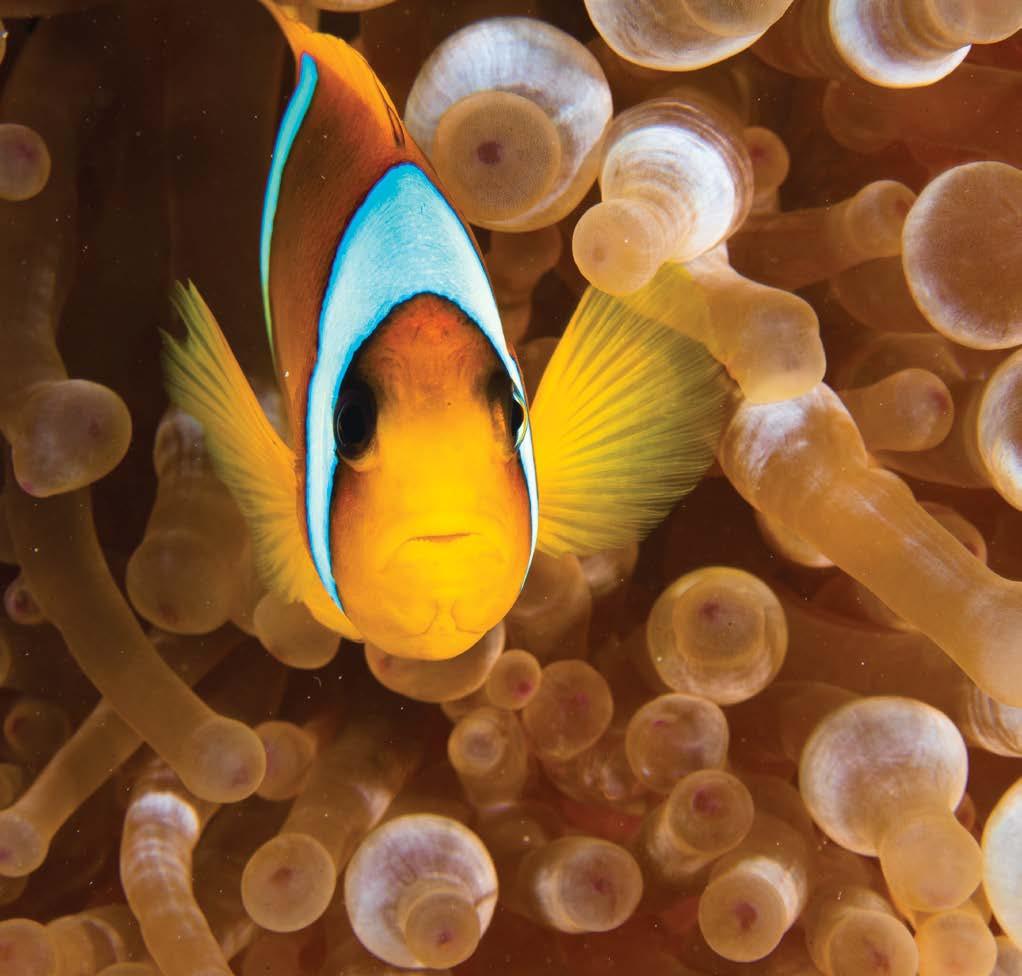
SACA Saudi Academy of Civil Aviation
SAR Saudi Arabian Riyal
SASB Sustainability Accounting Standards Board
SDG Sustainable Development Goals
SEAL Sustainability, Environmental Achievement and Leadership
SPMS Sustainability Performance Management System
SWCC Saline Water Conversion Corporation
SWRO Sea Water Reverse Osmosis
TCFD Task Force on Climate-Related Financial Disclosures
TNA Training Needs Analysis
TRIR Total Recordable Incident Rate
TRSDC The Red Sea Development Company
TSE Treated Sewage Effluent
TVTC Technical and Vocational Training Program
UCA Utility Concession Agreement
UN SDGs United Nations Sustainable Development Goals
VDA Value-Driven Approach
149 RSG Sustainability Report 2021
Forward-looking statements
This Sustainability Report (the “Report”) may contain certain forward-looking statements with respect to our business, operations, assumptions, goals and other possible future situations. These statements generally, but not always, may be identified by the use of words such as “believe”, “expect”, “are expected to”, “intend”, “estimate”, “should”, “strive”, “will”, “may”, “aspire”, “goal”, “will”, “vision”, “aim”, “aspiration”, “mission”, “look”, “ambition”, “commit”, “intend”, “strive”, “target”, “plan”, “ensure”, “must”, “seek”, “pursue”, “towards”, “expect”, “plan”, “estimate”, “objective”, “want” or similar expressions, including variations and the negatives thereof or comparable terminology, are used to identify forwardlooking statements. These statements include, among other things, statements about expectations, targets and goals in connection with our sustainability initiatives. These forward-looking statements are subject to risks and uncertainties that could cause actual results to differ materially from those expressed in, or implied, or projected by, the forwardlooking information and statements. We do not intend or assume any obligation to update these forward-looking statements, whether as a result of new information, future events or otherwise, since the forward-looking statements are based solely on the circumstances during the reporting period. All subsequent written and oral forward-looking statements attributable to us or to persons acting on our behalf are expressly qualified in their entirety by the cautionary statements referred to above and contained elsewhere in this Report. Except where noted, the information covered in this Report highlights our performance and initiatives in fiscal year 2021. This Report may contain links to or information from other internet sites. Such links and information are not endorsements of any products or services in such sites and no information in other organizations has been endorsed or approved by us.
150 RSG Sustainability Report 2021
Find out more
Please visit https://www.redseaglobal.com to find out more


Please visit https://www.redseaglobal.com/en/about-us/sustainability to find out more about our sustainability ambitions
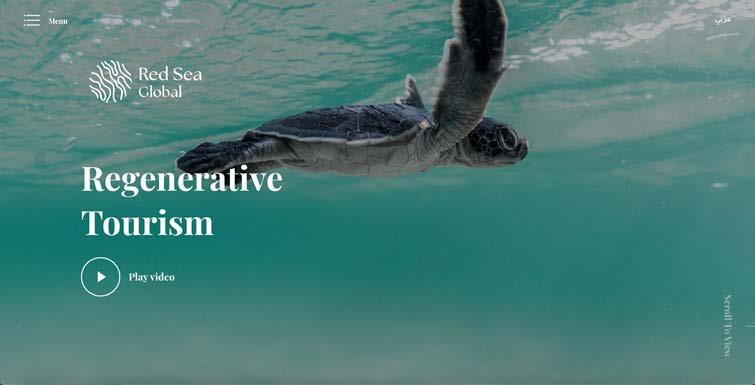
For questions about this report or its content, please reach out to us: sustainability@redseaglobal.com
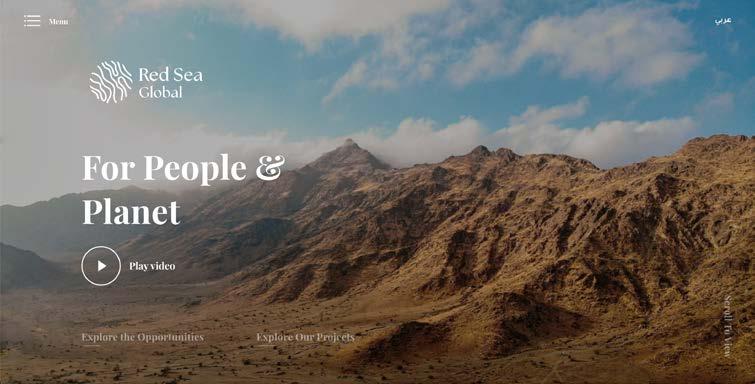
151 RSG Sustainability Report 2021
@RedSeaGlobal

@RedSeaGlobalAR
redseaglobal.com

Red Sea Global RedSeaGlobal
Red Sea Global Red Sea Global



















































































 Dr. Maryam Ficociello
Dr. Maryam Ficociello






 Tareq Musmali, Group Chief Internal Auditor
Tareq Musmali, Group Chief Internal Auditor











































































































































